
![]()
| Rapid Transit | |||||
| regular service: . |
IND Rockaway Line Refund Tickets | JFK Express | |||
| service interruptions: . |
Block Tickets | Courtesy Pass | Universal Transfers | General Order "G.O." Transfers | |
| special events: and Sports Specials: |
NY Titans Football @ Polo Grounds |
Aqueduct Racetrack Special | Yonkers Raceway Special | Rockaway Special - Playland Ticket | Nostalgia Special "Museum Train" |
| Miscellaneous Passes | |||||
|
|
|||||
| Surface Transit | |||||
| regular service: . |
Culture Bus Loops I, II, III, SI | Shoppers Bus | Night Coach | A Night On The Town | |
| special events: . |
1939 - 1940 Worlds Fair Bus Route Tickets & Transfers | ||||
.
There were many instances in which the New York City Transit Authority issued tickets for special events or occasions; where some were issued for a "one off" event while others were issued daily in regular service.
Some of these special occasions were sporting events, and some of these occasions were to garner more revenue during weekdays or late nights. As most of the passenger traffic was during morning or evening rush hours on weekdays, a lot of transit equipment sat idle during the off hour periods.
Obviously, this equipment cost money to purchase, as was the employees hired to operate the equipment; so having either sit idle was not financially sensible.
So, the NYCTA operated "specials" to attempt to recoup the expenses. Some were very successful when first introduced, then ridership tapered off, and the train or bus route abolished. The JFK Express, despite being sucessful in the beginning; saw diminishing returns in later years and then operated in deficit. However public opinion kept it around, despite it costing more money to operate then it raised.
![]()
 |
 |
 |
 |
 |
 |
| front 6-1-56 |
back 3-67 |
front 6-1-56 |
back 6-70 |
front 6-1-56 |
back 8-72 |
| Note the front carries a 6-1-56 date, while the back has 3-67, and reflects the 20 cent standard fare prevalent for the period January 4, 1970 through January 3, 1972 Oddly, the back is printed upside down to the front. It is shown here with corrected orientation. 2" x 6¼ without ¼" selvage |
Note the front carries a 6-1-56 date, while the back has 6-70, and reflects the 30 cent standard fare prevalent for the period January 4, 1970 through January 3, 1972 Oddly, the back is printed upside down to the front. It is shown here with corrected orientation. 2" x 6½ with ¼" selvage |
Note the front carries the 6-1-56 date, while the back has 8-72 and reflects 35 cent standard fare prevalent for this period January 4, 1972 through September 2, 1975 and when the Rockaway double fare was abolished. Ergo, this is the last issue for the Rockaway Special Refund Ticket. Oddly, the back is printed upside down to the front. It is shown here with corrected orientation. 2" x 6⁹⁄₁₆" no selvage |
|||
.
.
![]()
The most widely known of these special tickets was for the JFK Express. This service was heavily advertised on broadcast television and radio and the slogan, which a lot of people remember to this day was "Take the Train To The Plane".
This special but scheduled service was assigned its own "bullet" on the roll signs on the subway and bus equipment:
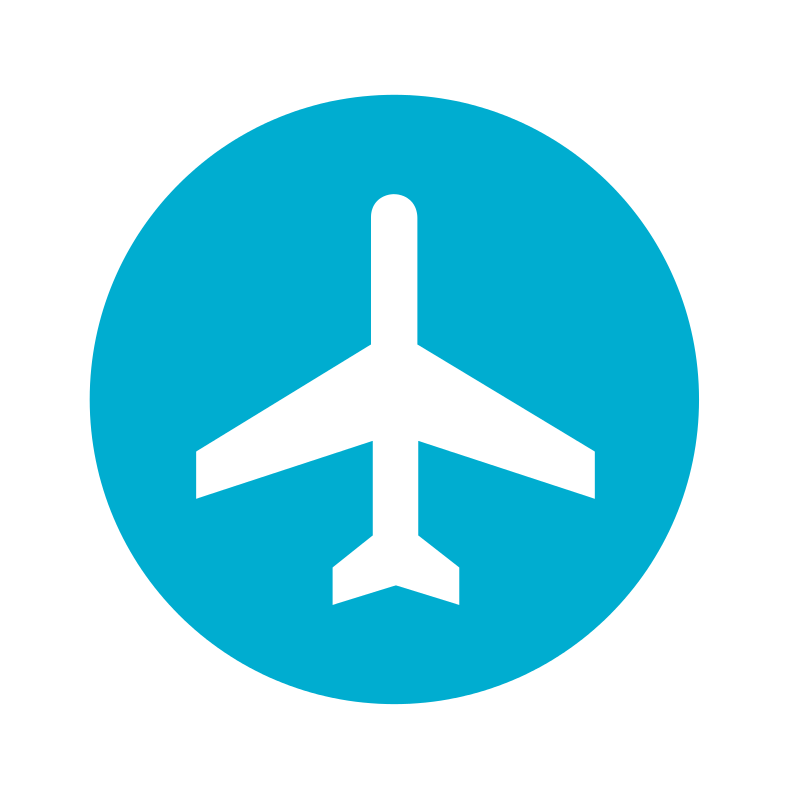
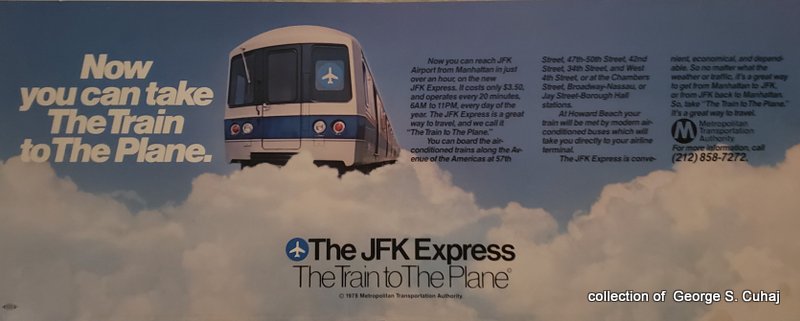
| This was an express train that operated from Manhattan,
stopping at selected stations in Manhattan and through Queens to
provide service to John F. Kennedy Airport. The
stops for this train are listed at right.
Baggage racks were installed in those subway cars assigned to the route. During operation, New York City Transit Police assigned a patrolman to each train for security of the passengers as well as baggage. Usually, the trains were comprised of a three car set of R-46 types (the newest in the system) and equipped with air conditioning. These three car sets were later expanded to four cars. As the JFK Express train was significantly shorter than the standard eight or ten car trains in regular IND subway service, specially marked areas on the subway platform showed passengers of the JFK Express where the train would stop. Service was every 20-24 minutes, departing from 57th Street and Sixth Avenue (Avenue of the Americas), and then once the 21st Street / Queensbridge Station opened, from 5am to Midnight. Service from Howard Beach / JFK Airport began at 6am and operated through 1 am. The JFK Express was an extra fare service, meaning the fare was in addition to the regular transit fare (which at that time when service was inaugurated, was 50 cents). In reality, this was actually the "train to the bus to the plane", as there was two express bus loops that picked up passengers at the JFK Airport / Howard Beach station to take them to or from their desired terminal. |
.. |
Queens
- IND 63rd Street Line
Manhattan
- IND Sixth Avenue Line Shuttle Bus to Airport |
One of the perqs of the premium service and as a courtesy on trains originating at JFK Airport and heading towards the city, the passenger could request a stop at an intermediate station along the route. Such as, if the passenger wanted to disembark at Ralph Avenue, they told the transit clerk aboard the train who would relay the request to the motorman, to stop at that requested station. This would alleviate the need for the passenger and their luggage to have to go to a regular station of the JFK Express and either wait for a second "local" subway train or backtrack to their desired stop.

| Therefore, this mid-platform
ticket booth, which divided the northern 300 foot section of northbound
platform from the southern 750 foot area. This 300 foot
northern section had a four car capacity and provided controlled access to the JFK
Express Train premium fare and the ramp to Loop Bus area, as shown in the
diagram below right. Originally, this 300 foot section of platform was not covered, as evidenced by the image at right dated September 24, 1978. (Doug Grotjahn image, collection of Joseph Testagrose, nycsubway.org archives) Also note that the original location of the mid-platform booth was located halfway between the original three car JFK Express Train length (about 125 feet from either end of the premium fare control area). As seen in the image below which was taken a year later, the booth was now moved to the southern border of the 300 foot extra fare area, and the platform roofed over to provide covered egress for premium fare passengers. (They're paying $3.50 for an express train - better not make 'em stand in the rain!) This 300' long separate platform control area, which was long enough to accommodate four 75' "B Division" cars; was connected by a covered inclined ramp down to the bus lane of the parking lot. Here, at ground level, another large covered shelter housed the boarding area for JFK Express passengers transferring to and from the Loop Buses. In the image below, this mid-platform booth can be seen, along with signs for the regular subway fare and access the regular subway platform (no turnstile) - note the amount $1.50. This was not the cost of a token - but the cost of the Loop Bus and |
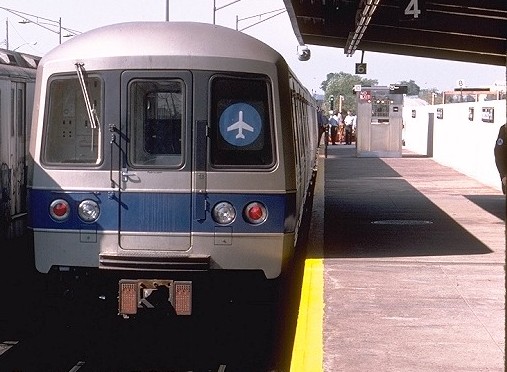 northbound (to NYC) platform, looking north note at least four crewpersons at far end. |
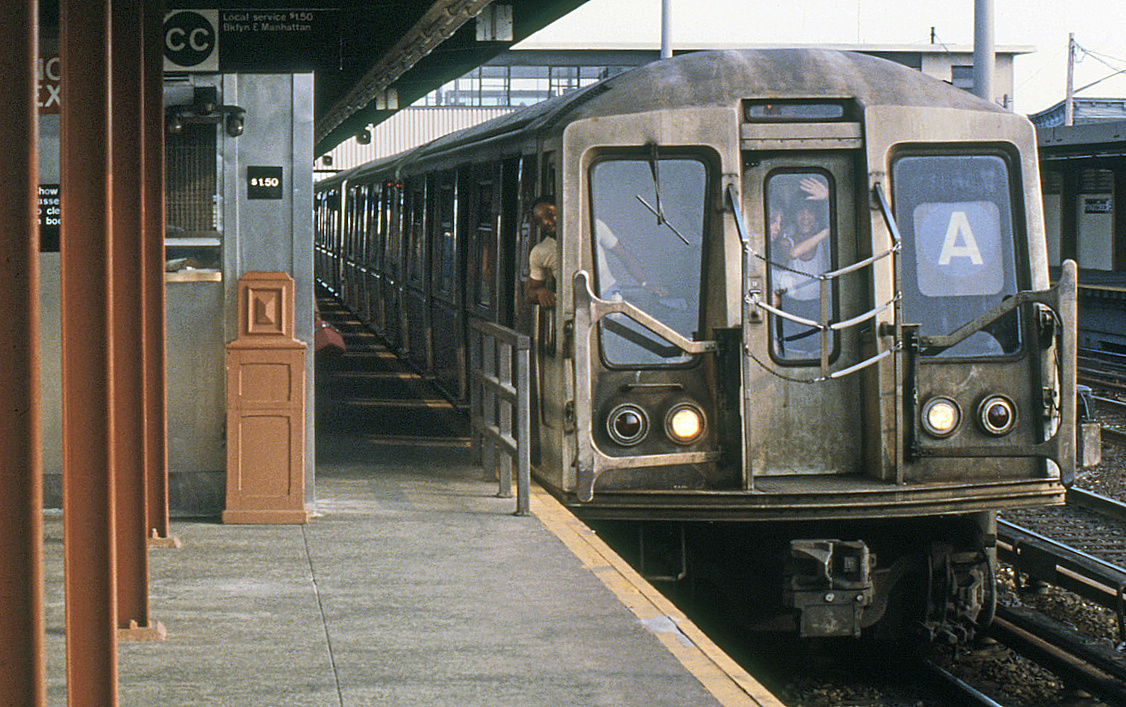 northbound (to NYC) platform looking south
The mid-platform ticket booth. Note signs on booth: NO EXIT, $1.50 and CC Local Service $1.50 Bklyn & Manhattan Also note the person holding the brown travel valise at back window of booth. This, in all likelihood; is a regular subway passenger purchasing a $1.00 JFK Loop Bus Ticket as they came in on the regular fare subway. Also note the ticket chopper under the $1.50 sign! August 1979 - Steve Hoskins photo - David Pirmann collection - courtesy of nycsubway.org |
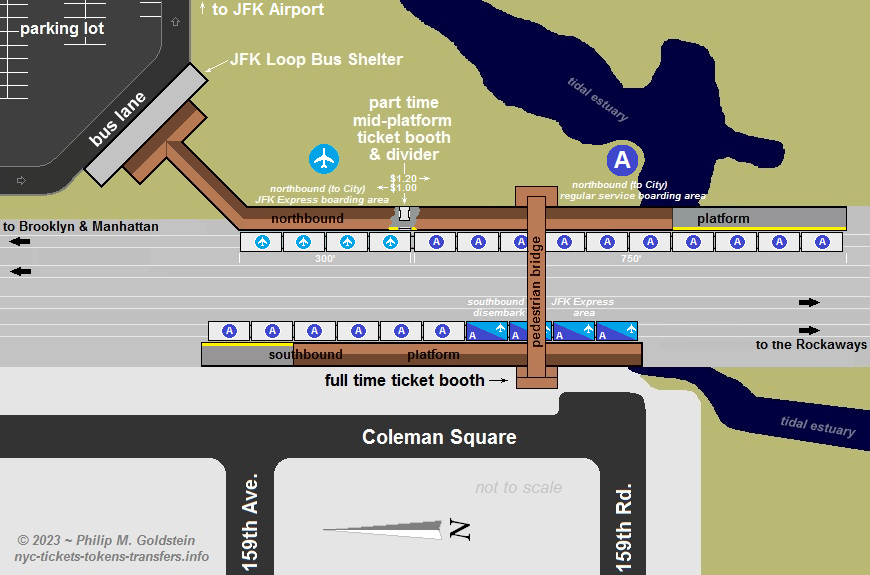 |
| TO JFK: | |
| via JFK Express |
Purchase 50¢ token to access subway, pay $3.00 premium fare on board JFK Express; upon arrival at Howard Beach Station, access to JFK Loop Bus included; |
| or | |
| via regular subway |
Purchase token to access subway, detrain at Howard Beach Station, buy $1.00 JFK Loop Bus Ticket at mid-platform booth for access to JFK Loop Bus; |
FROM JFK:
|
|
| via JFK Express |
Board bus at airline terminal, disembark at bus ramp at Howard Beach Station and walk up to subway platform. If purchasing city-bound JFK Express train ticket ($3.50) you purchased it from "on board" clerk waiting at doors of subway train. The Loop Bus ride is included in the premium fare; |
| or | |
| via regular subway |
or pay $1.20 cash at mid-platform booth ($1.00 for Loop Bus plus 20¢ discounted subway fare), no token required for access to subway train. |
| date | base subway fare |
JFK Express Train TO JFK Airport (does not include regular fare for subway) |
Express Bus Loop bus and JFK Express Train FROM JFK Airport (includes base fare for subway) |
Express Bus Loop bus and FROM airport |
Express Bus Loop onlyc TO JFK Airport |
JFK Employee tickets (book of 20 tickets)
|
|
| September 23, 1978 | .50 | $3.00 | $3.50 | $1.20 | $1.00 | n/a | |
| January 1, 1979 | .50 | n/c | n/c | n/c | n/c | $25.00 ($1.25) | On January 1, 1979; employees of the various airlines as well as employees of the Port Authority of New York and New Jersey who worked at JFK airport; were provided with a discounted book of twenty tickets, sold for $25 ($1.25 per ticket). |
| June 28, 1980 | .60 | $3.40 | $4.00 | $1.50 | $1.20 | $30.00 ($1.50) | |
| July 3, 1981 | .75 | $4.25 | $5.00 | $1.80 | $1.50 | $45.00? ($2.25?) | This era of JFK Express train service also provided service to the Aqueduct Racetrack when racing was in session and upon request of the passenger. |
| January 2, 1984 | .90 | $5.10 | $6.00 | $2.00? | $1.80 | ||
| January 1, 1986 | 1.00 | $5.50 | $6.50 |
$2.25 | $2.00 | $50.00? ($2.50) | On January 1, 1986, the cost of an JFK employee discount ticket rose from $2.25 to $2.50. For this fare, |
| $5.50 | $5.50 | see ticket below | |||||
| January 1, 1990 |
1.15 | $5.60?a $6.35?a |
$6.75 $7.50?a |
n/c? | n/c? | JFK Express service was discontinued April 15, 1990 |
a - $5.60 denomination ticket not yet seen or confirmed, but believed to exist. Furthermore,
the December 16, 1989 article in New York Times states the JFK Express
fare was to rise to $6.35 and token. This would correspond to a "from
airport" ticket
fare of $7.50; none of which have been seen.
b - $6.50 non-redacted tickets have not yet been seen.
c - fare for shuttle bus when not used with JFK Express train.
n/c = no change
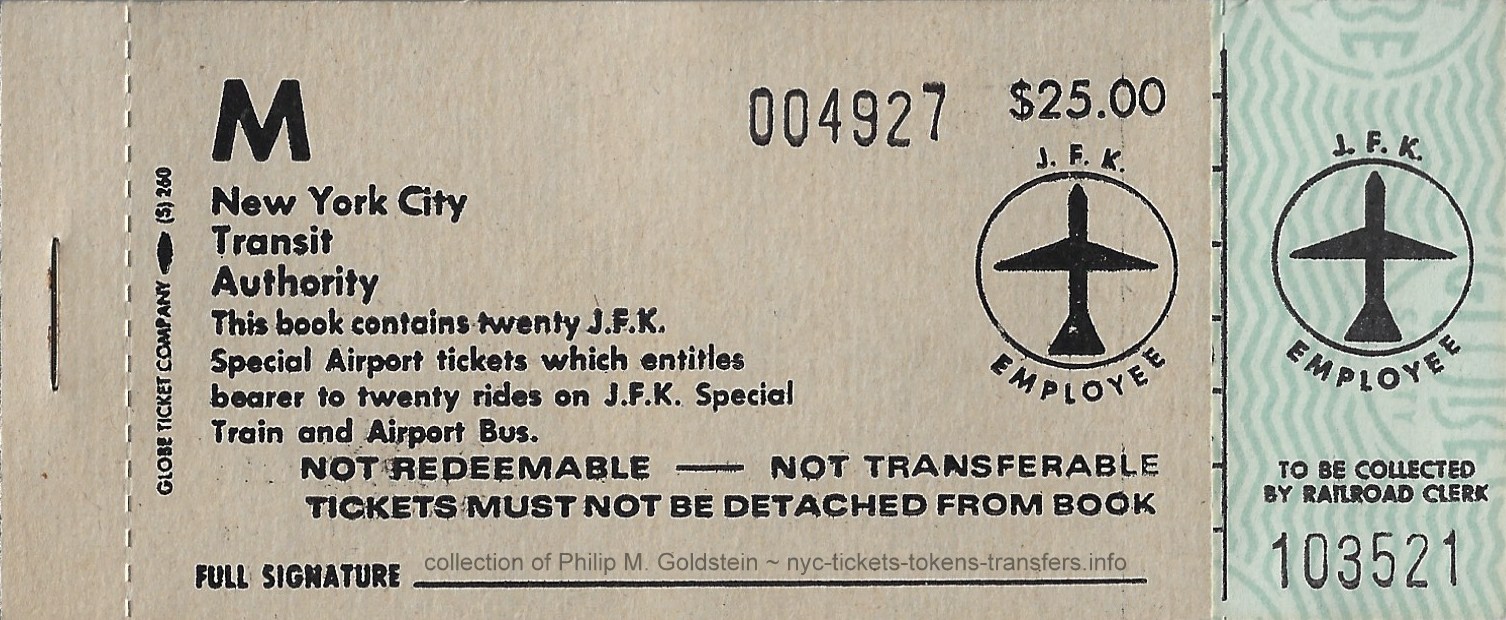 |
||
| JFK Employees JFK
Express Ticket Book (bi-directional) - January 1, 1979 to June 28, 1980 Book of twenty tickets purchased from on-board ticket clerk. Booklet number is independent from individual ticket numbers. Note booklet cover carries value, but not individual tickets, and tickets must not be detached from booklet prior to clerks removal. Globe Ticket Booklet cover is 4" x 2¹⁄₁₆" with 3/8" selvage, tickets are 5" x x 2¹⁄₁₆ with ⅜" left selvage for book binding, and ¹⁵⁄₁₆" clerk stub on right |
||
| As tickets did not carry a denomination, the same ticket theoretically could be used throughout various booklet values. However, with the appearance and procurement of the following colors, leaves the authors to wonder if varying colors reflected different book denominations ($25.00, $30.00, etc) or denote some other accounting reason, i.e.: year issued, etc) |
||
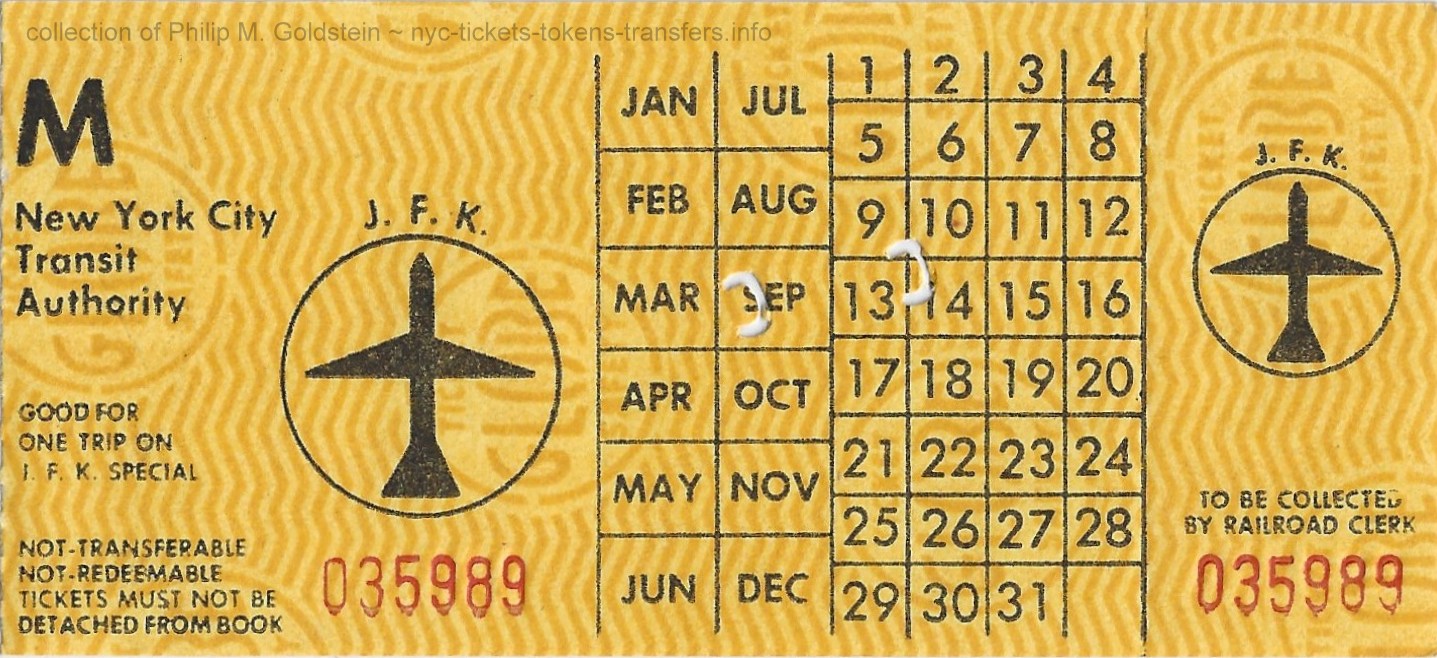 |
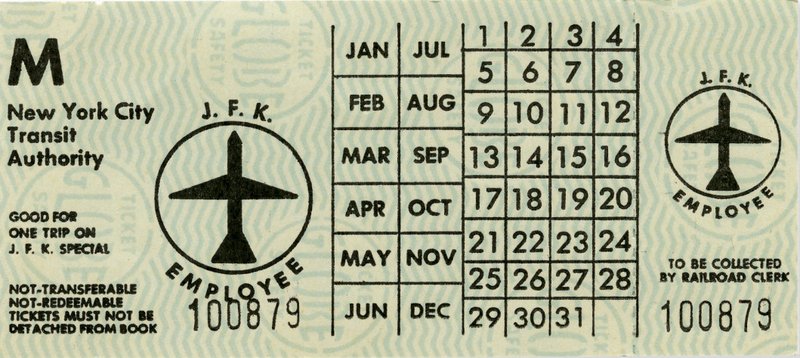 |
|
| JFK Employees JFK
Express Ticket (bi-directional) - goldenrod (shown detached from booklet, with clerk stub.) Globe Ticket 5" x 2¹⁄₁₆" |
JFK Employees JFK
Express Ticket (bi-directional) - blue (shown detached from booklet, with clerk stub.) Globe Ticket 5" x 2¹⁄₁₆" |
|
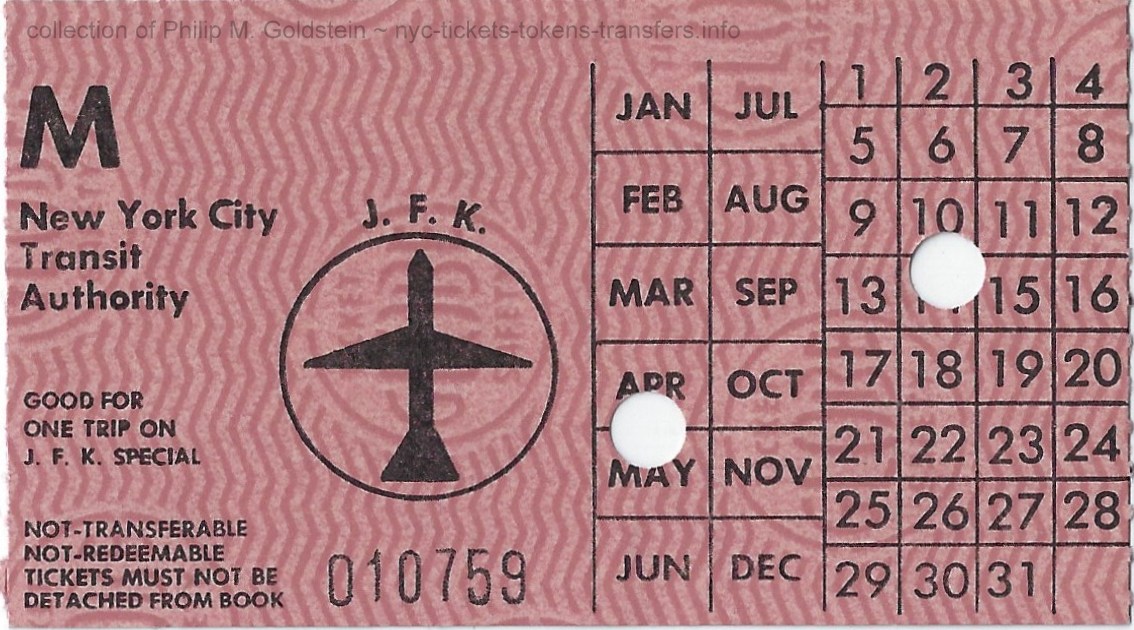 |
intentionally left blank | |
| JFK Employees JFK
Express Ticket (bi-directional) - salmon (shown detached from booklet, without clerk stub.) Globe Ticket 5" x 2¹⁄₁₆" |
||
|
September 23, 1978
|
||
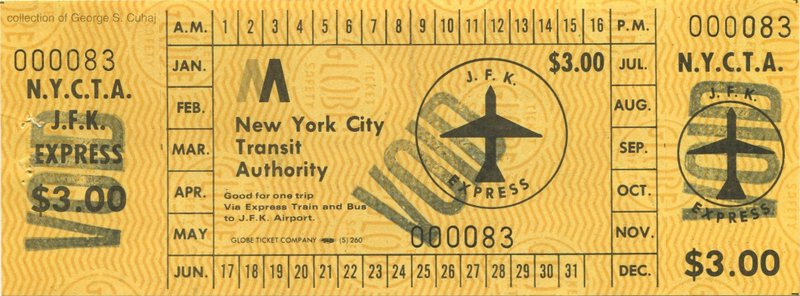 |
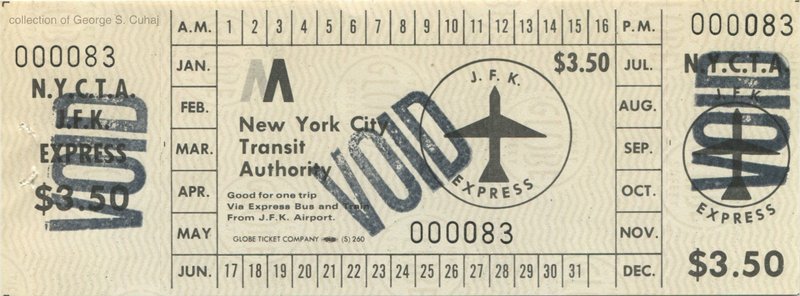 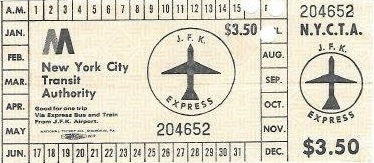 .... .... |
|
| FROM NYC / TO AIRPORT 50 cent subway fare paid at token booth + $3.00 JFK Express fare & Shuttle Bus paid to on-board ticket clerk. Globe Ticket 6¾" x 2½ |
TO NYC / FROM AIRPORT Shuttle Bus and JFK Express $3.50 JFK Express fare and subway combined and paid to Bus Loop Operator Globe Ticket above National Ticket below 6¹³⁄₁₆" (including 1⅜" selvage) x 2½" |
|
|
June 28, 1980
|
||
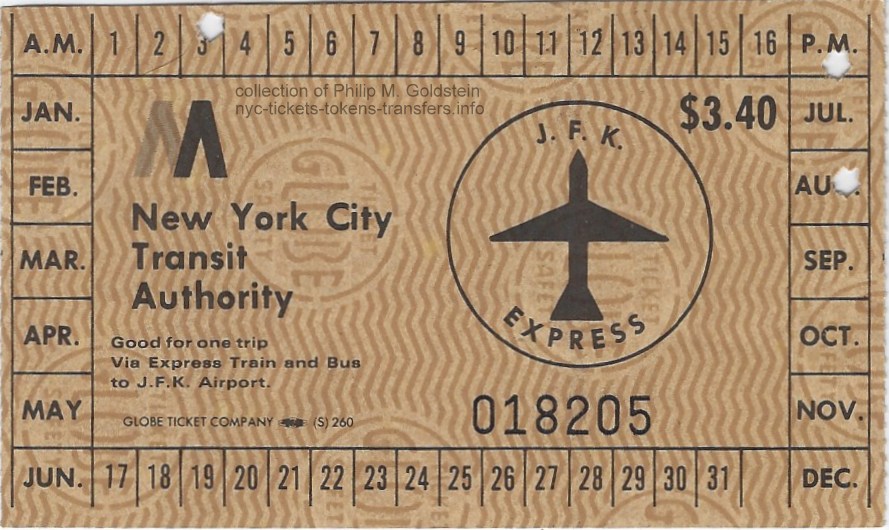 |
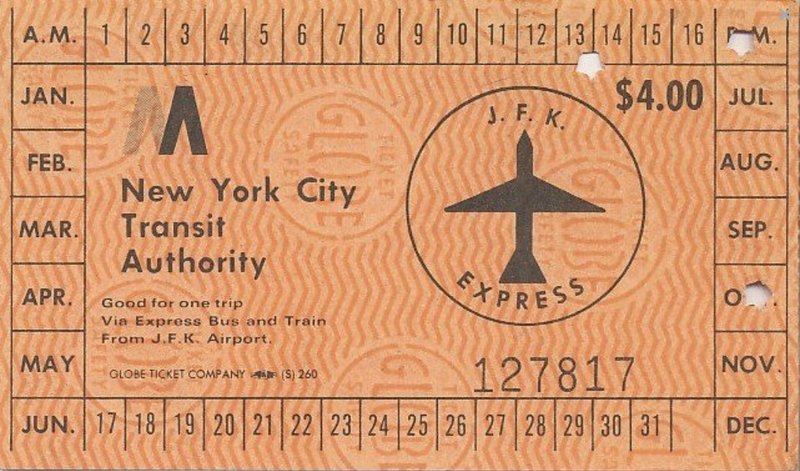 |
|
| FROM NYC / TO AIRPORT 60 cent subway fare paid at token booth + $3.40 JFK Express fare & Shuttle Bus paid to on-board ticket clerk Globe Ticket 4¼" x 2½" |
TO NYC / FROM AIRPORT $4.00 - JFK Express fare and subway combined and paid to Bus Loop Operator Globe Ticket 4¹⁄₁₆" x 2½" |
|
|
July 3, 1981
|
||
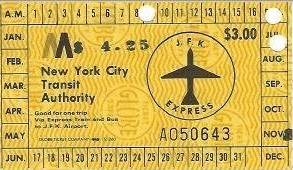 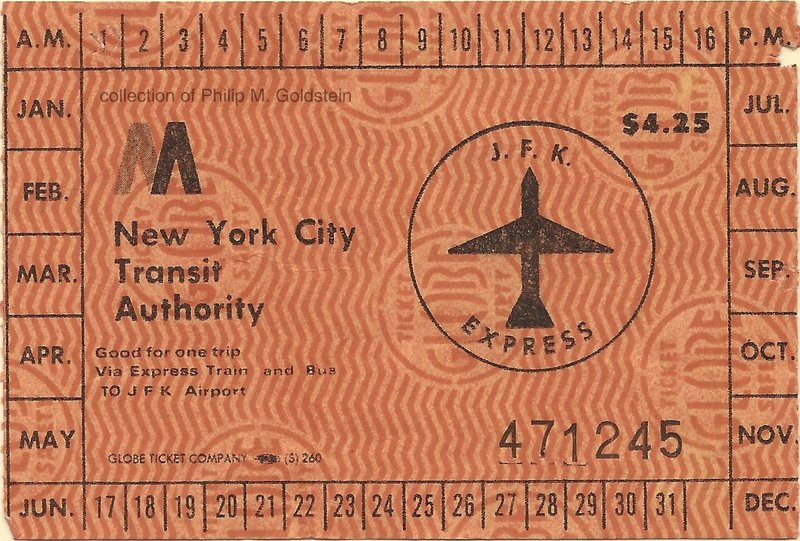 |
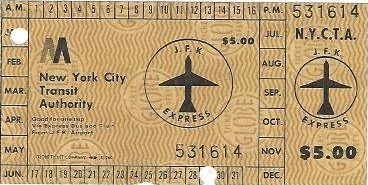 |
|
| FROM NYC / TO AIRPORT 75 cent subway fare paid at token booth + $4.25 JFK Express fare & Shuttle Bus paid to on-board ticket clerk expedient $4.25 ($3.00 ticket overstamped to $4.25 - Globe Ticket $4.25 - Globe Ticket 4¹⁄₁₆" x 2½" |
TO NYC / FROM AIRPORT $5.00 - JFK Express fare and subway combined and paid to Bus Loop Operator |
|
|
January 2, 1984
|
||
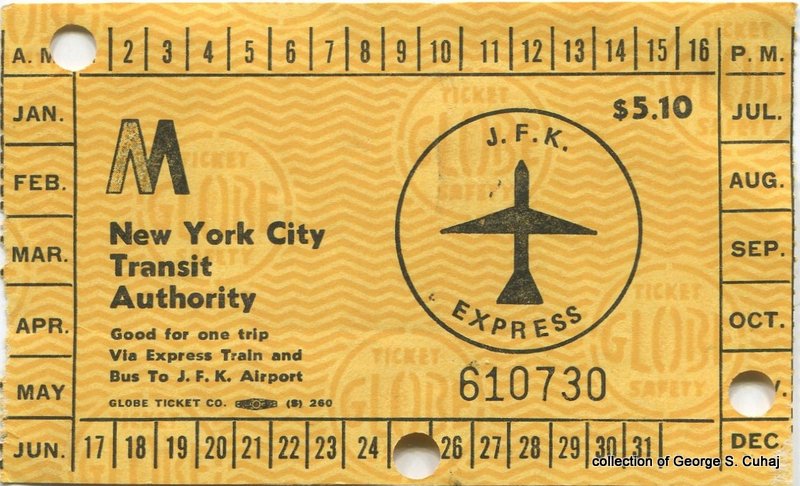 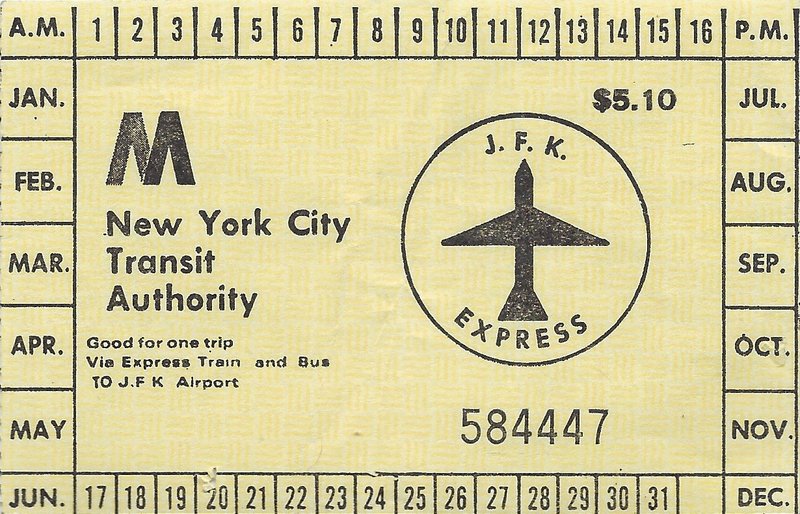 |
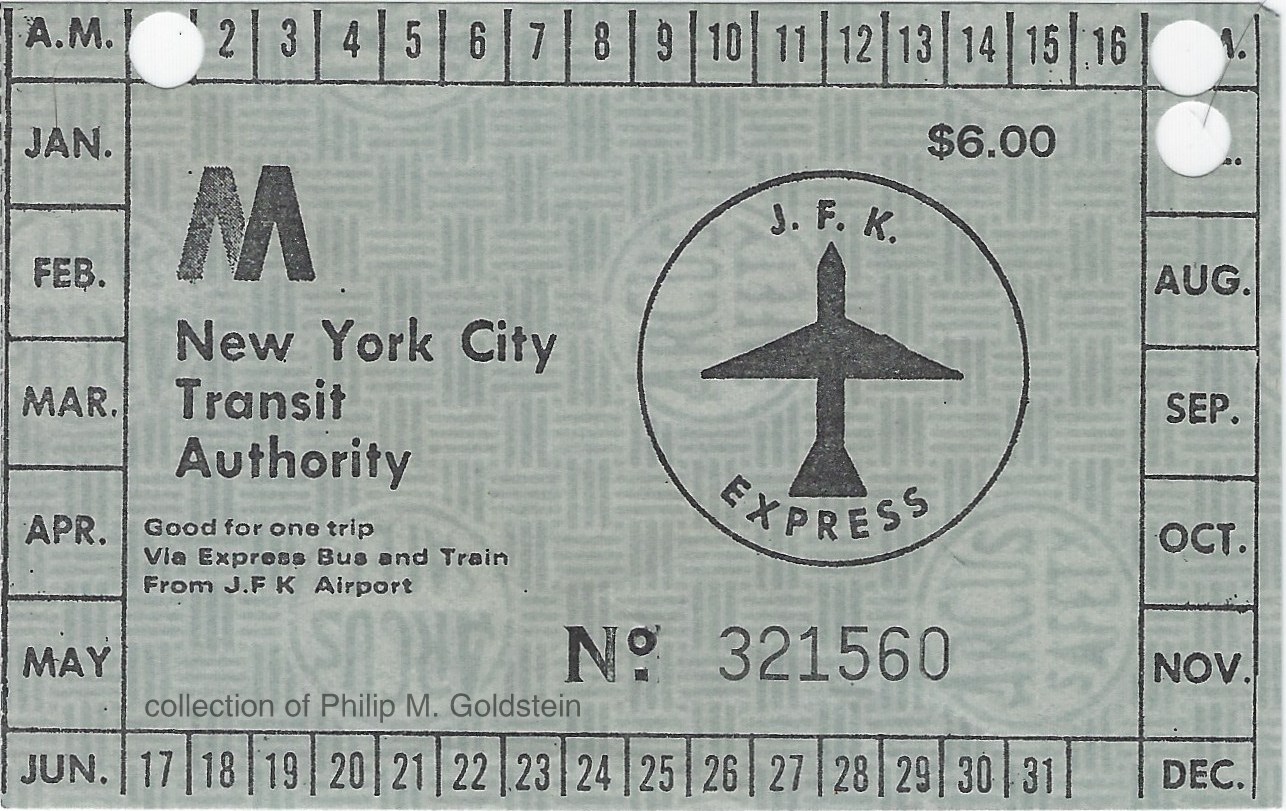 |
|
|
FROM NYC / TO AIRPORT
90 cent subway fare paid at token booth + $5.10 JFK Express fare and Shuttle Bus to JFK Airport paid to on-board ticket clerk goldenrod is Globe Ticket above
pale cream is unknown printer below 4¹⁄₁₆" x 2½" |
TO NYC / FROM AIRPORT $6.00 - JFK Express fare and subway combined paid to Bus Loop Operator Arcus Ticket 4¹⁄₁₆" x 2½" |
|
|
January 1, 1986
|
||
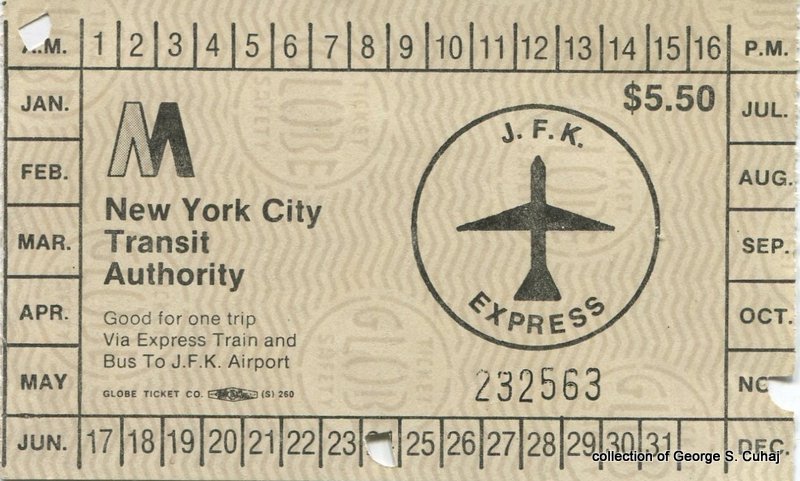 |
|
|
| $1.00 subway fare paid at token booth + $5.50 JFK Express fare and Shuttle Bus (free) to JFK Airport paid to on-board ticket clerk Globe Ticket 4¹⁄₁₆" x 2½" |
$6.00 redacted,
overstamped to $6.50 - Shuttle Bus (free) and JFK Express paid to Bus Loop Operator note: no perforation on right side for bus stub. Arcus Ticket |
|
And now, for another fly in the ointment. These $5.50 tickets below, differ significantly from the one above left (and others prior to it), as the tickets below are good for $5.50 in both directions: "Good for one trip Via Express Train and Bus to J. F. K. Airport or from Howard Beach to 57th Street."
In order to accomplish this matching two way fare rate, the base subway fare would have to be collected separately or not at all on the "from Howard Beach" direction (to Manhattan). And at no other time was the fare $5.50 to or from J.F.K. so these tickets must fall into the January 1, 1986 through January 1, 1990 usage period. Research remains ongoing and comments are welcome. Most coincidentally, upon the delivery of both tickets to me on March 16, 2023 (purchased from different sellers on eBay); John Telesca, a fellow member of the Facebook group "New York's Railroads Subways & Trolleys Past & Present" made the following post in response to a comment I made: "I rode it twice and [each time] they collected fares differently. The first had a uniformed person collecting fares in the car, at the same time trying to change larger bills. On my last trip you paid the fare when you got off at Howard Beach, at a little podium on the airport side before boarding the airport bus. On the way back from the airport they let anyone board at the stops. I believe it was summer, 1989. Since this is an anecdotal recollection, it needs to be confirmed via official documentation. But at the very least, we are now aware that a change in the method and time of payment for JFK Express passengers took place. As such; the verbiage on the tickets was modified to reflect this as well. Also note the wording on the bus portion of the ticket: "To Be Collected By Bus Operator" by the still attached stub on the ticket below left. This wording does not appear on earlier issues of the JFK Express Tickets. Furthermore, upon acquiring the following two tickets; subtle differences are noticed between the two: note the M logo, and slight different font and size of the wording. Both are Globe Ticket, however, the one on right now carries "Globe Ticket and Label". |
||
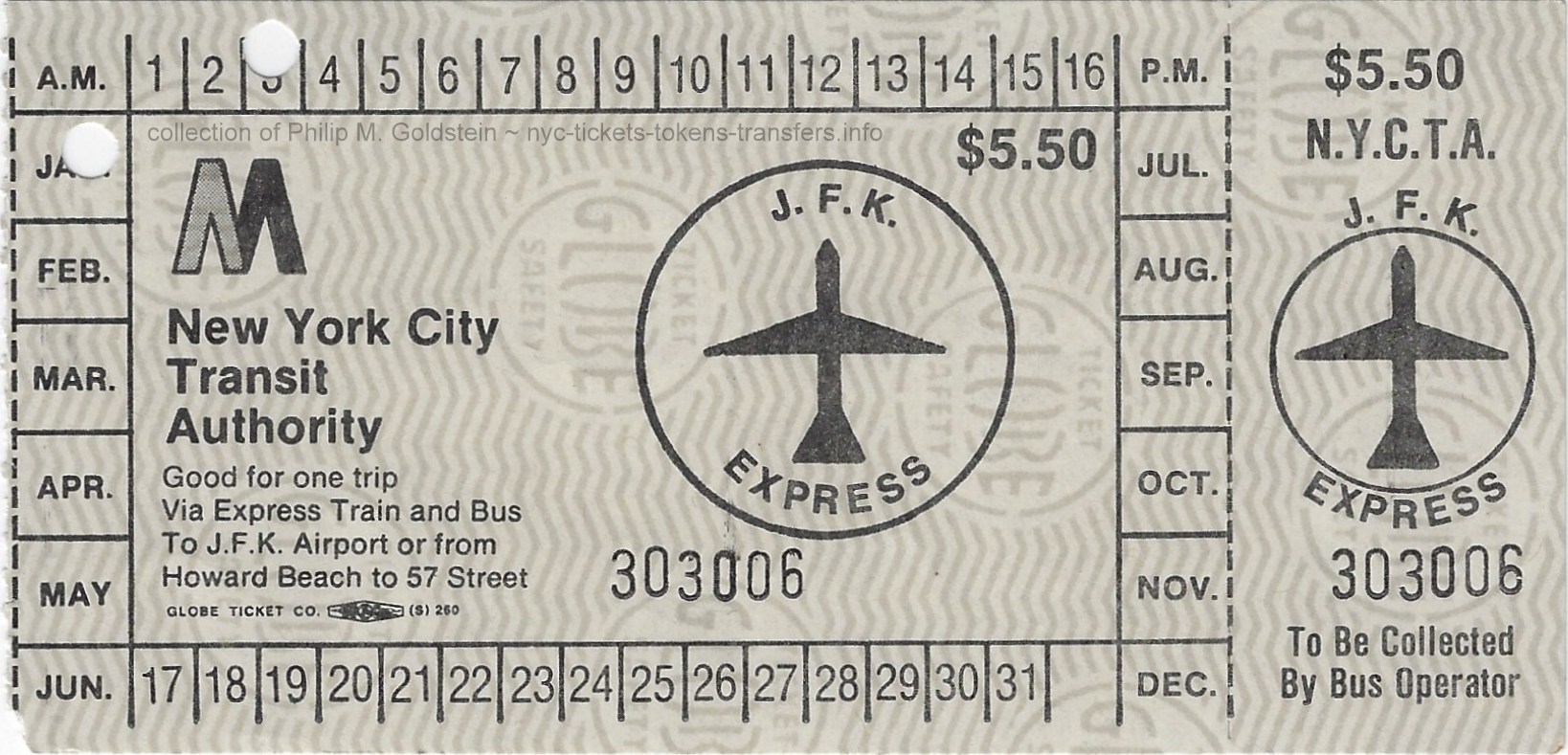 $5.50 JFK Express fare and Shuttle Bus (free) to JFK Airport paid to clerk at station $5.50 JFK Bus Loop and JFK Express to Manhattan paid to Bus Loop Operator Globe Ticket 5³⁄₁₆" x 2½" |
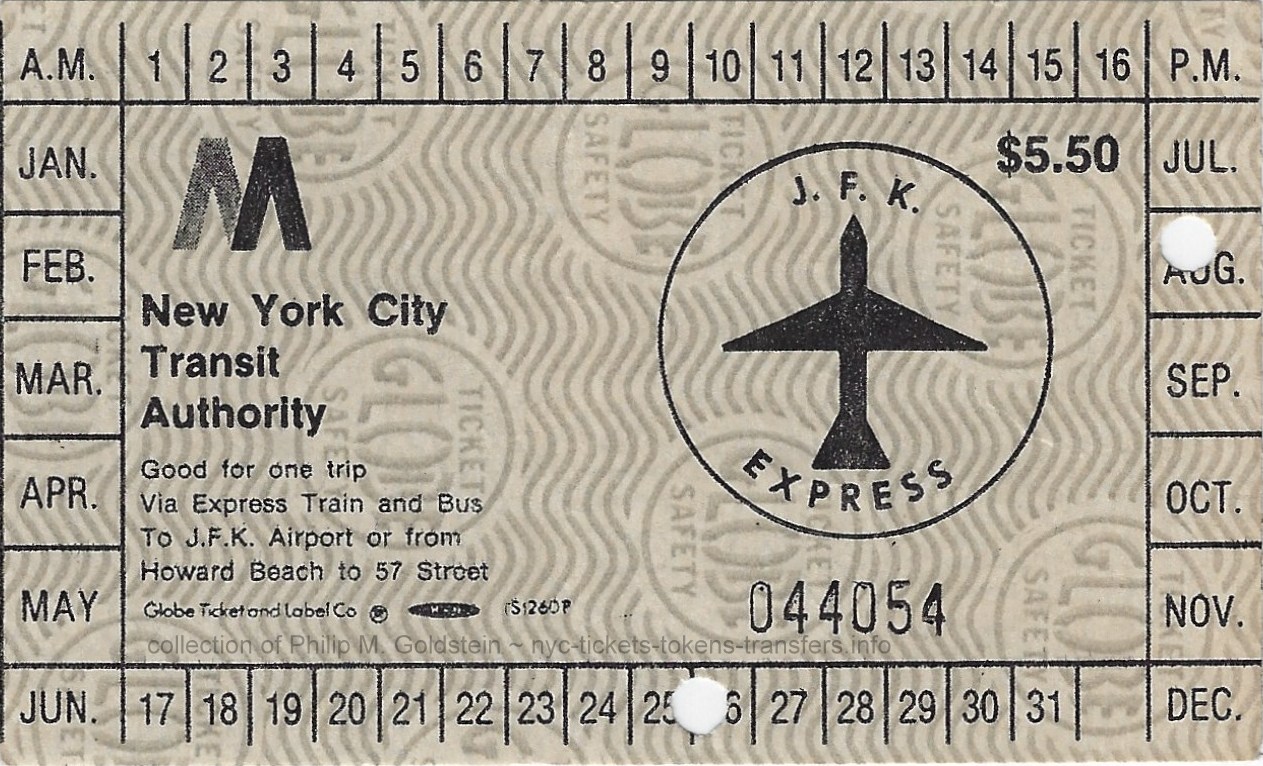 $5.50 JFK Express fare and Shuttle Bus (free) to JFK Airport paid to on-board ticket clerk $5.50 JFK Bus Loop and JFK Express to Manhattan paid to Bus Loop Operator Globe Ticket and Label 4¹⁄₁₆" x 2½" |
|
|
January 1, 1990
|
||
not yet seen |
not yet seen |
|
| $1.15 subway fare paid at token booth & $5.60 JFK Express fare and Shuttle Bus to JFK Airport paid to on board clerk. |
$6.75 - Shuttle Bus and JFK Express |
|
Also: the December 16, 1989 article in New York Times states the JFK Express fare was to rise to $6.35 and token. This would correspond to a "from airport" ticket fare of $7.50; none of which have been seen. |
||
| . . |
||
|
|
||
| Airport Loop "Express" Bus only - TO JFK (for a passenger arriving at Howard Beach / JFK Airport Station via subway |
Airport Loop "Express" Bus & Local Subway Service FROM JFK (for a passenger at JFK Airport towards Howard Beach / JFK Airport Station via Express Bus and subway |
|
| September 23, 1978 | ||
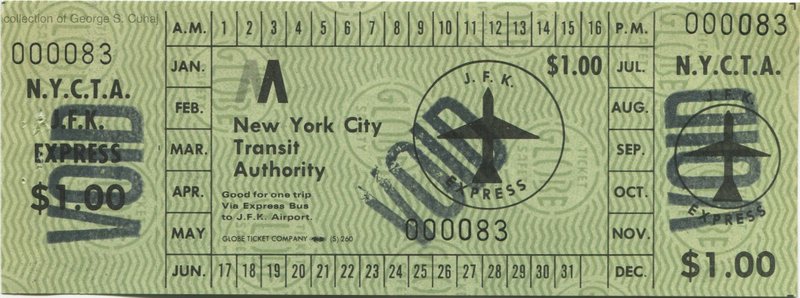 |
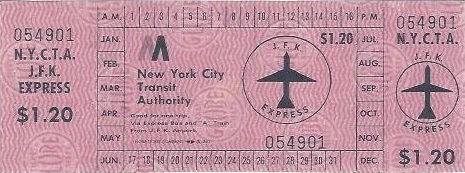 |
|
| $1.00 - Shuttle Bus ONLY to JFK Airport Globe Ticket 6¹³⁄₁₆" (including 1⅜" selvage) x 2½" |
$1.20 - Shuttle Bus and Globe Ticket 6¹³⁄₁₆" (including 1⅜" selvage) x 2½" |
|
|
June 28, 1980 |
||
| intentionally left blank | 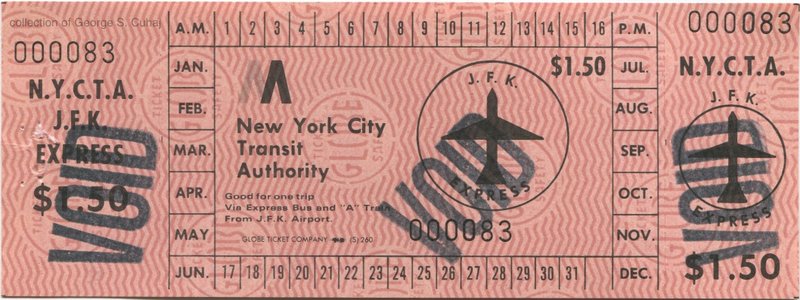 |
|
| $1.50 - Shuttle Bus and Globe Ticket |
||
|
July 3, 1981 |
||
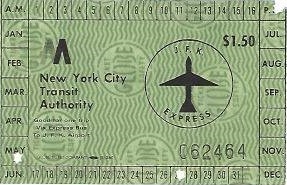 |
intentionally left blank | |
| .$1.50 - Express Bus ONLY to JFK Airport Globe Ticket |
||
|
January 2, 1984 |
||
| intentionally left blank |
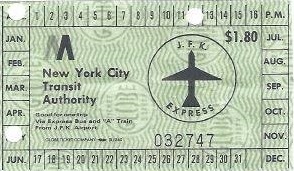 |
|
|
.January 1, 1986 |
||
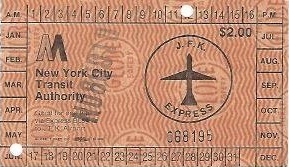 |
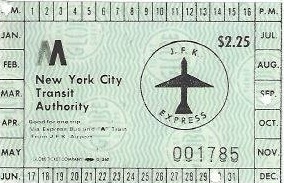 |
|
| $2.00 - Express Bus ONLY to JFK Airport Globe Ticket |
$2.25 - Shuttle Bus and Globe Ticket |
|
Unissued books of JFK Tickets in varying denominations are now appearing on the eBay market.
Individual tickets: $7.00 to $10.00 for circulated and
punch canceled tickets
Books; no more than $15.00 per book as these are unissued remainders.
JFK Express JFK Employee Tickets; are somewhat rarer: $15.00 - $20.00 for issued tickets.
Books; no more than $15.00 per book as these are unissued remainders.
.
.
![]()
.
Aqueduct Racetrack - Thoroughbred Horse Racing
Two items should be noted before we proceed:
| In
1955, the New York Racing Association (NYRA) purchased the
Aqueduct Racetrack located in South Ozone Park, Queens, and the
racetrack
was closed from 1956 through 1959 for renovations. Because of its
proximity to the Long Island Rail Road Rockaway Beach Branch, a station
was constructed by the New York Racing Commission. Ironically, the LIRR
on the verge of bankruptcy, and following a fire on the trestle over
Jamaica Bay; sold the line to the NYCTA for $8,500,000 on June 11, 1952. Under NYCTA ownership, all stations on the segment south of Ozone Park were taken out of service on June 27, 1955 due to reconstruction and as such, the Aqueduct Racetrack station had gone unused. The line reopened on June 26, 1956, albeit with a double fare on the station south of Howard Beach. The Aqueduct Racetrack Station opened on September 14, 1959, along with the newly renovated racetrack. Preceding this event slightly, a trial run of dedicated express service to Aqueduct Racetrack took place on June 2, 1959, with an approximate running time of 29 minutes. Aboard this trial train were 200 members of the National Association of State Racing Commissioners. Transit officials stated that the actual time of the specials would be 30 minutes at a minimum as the pace of the train was too swift; and the trip usually averaged 35 minutes in regular service. The actual start of Aqueduct Special express service to the general public began on Monday, September 19, 1959. Two trains departing from the lower level of the 42nd Street / Port Authority Bus Terminal Station on the IND Eighth Avenue Line in Manhattan. These trains, the first departing at 12:20 pm, and the second at 12:45 pm, ran nonstop to the racetrack in Queens in 28 minutes. These extra-fare trains cost 50¢ and during its first year of operation, the Aqueduct Special carried 341,000 passengers. The NYCTA 1959-1960 Annual Report states: "A special 50¢ fare express service from midtown Manhattan and downtown Brooklyn to the
track was inaugurated with the 1959-60 fall meeting. This was supplemented during the 1960 spring
meeting with a Saturday and holiday express service
from the track to the City. This extra service carried
341,000 riders during the year. It did not in any
way diminish or replace the regular Rockaway Line
service to this area."
A third train, would depart from the Hoyt–Schermerhorn Streets station in Brooklyn. at 12:35 pm utilizing the now-closed outer platforms of this station, which segregated passengers using the special service. Saturday operations had these three train leaving 20 minutes earlier. |
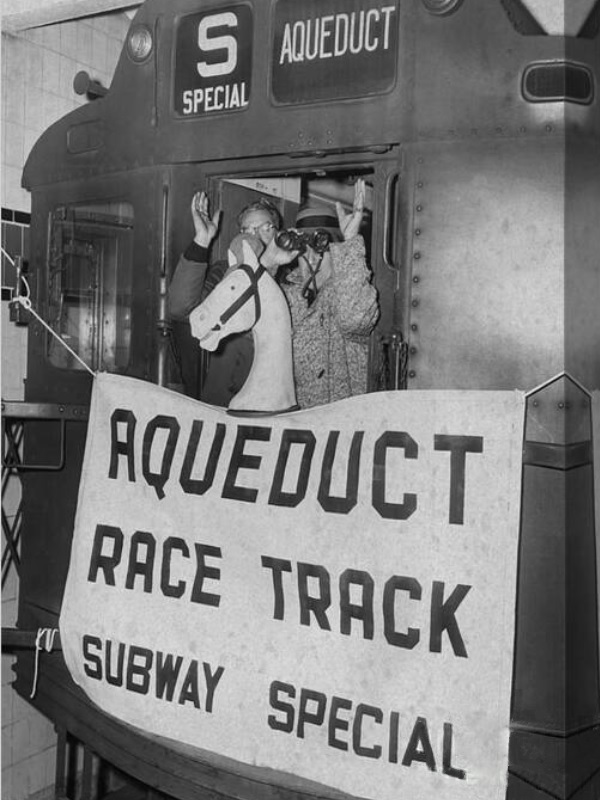 |
|
The Aqueduct Special saw a lot of passengers on its initial opening, so on September 22, 1959, the NYCTA added five "Daily Double" trains on weekdays and eight trains on Saturdays, more than doubling the original number of trains originally designated for this service.
This revelation potentially answers the question why the NYCTA opted to used the "Extra Large Y Cut Out" token (instead of a smaller design token) and upon the raise in fare to 75 cents.
Also, If my understanding of the coin and token mechanisms is correct, coin and token mechanisms like those used in the subway turnstiles, could only be adjusted to a certain degree (within a few millimeters). Therefore, trying to adjust the mechanism from the size of a 16.5mm x 1.14mm slot (the size of the small token for regular fare) |
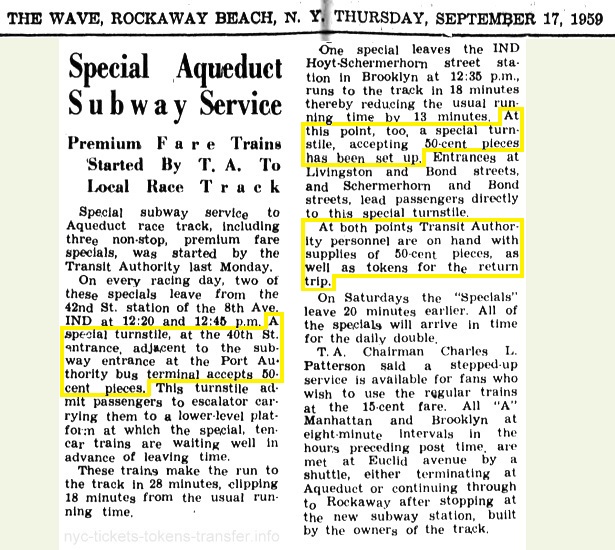 |
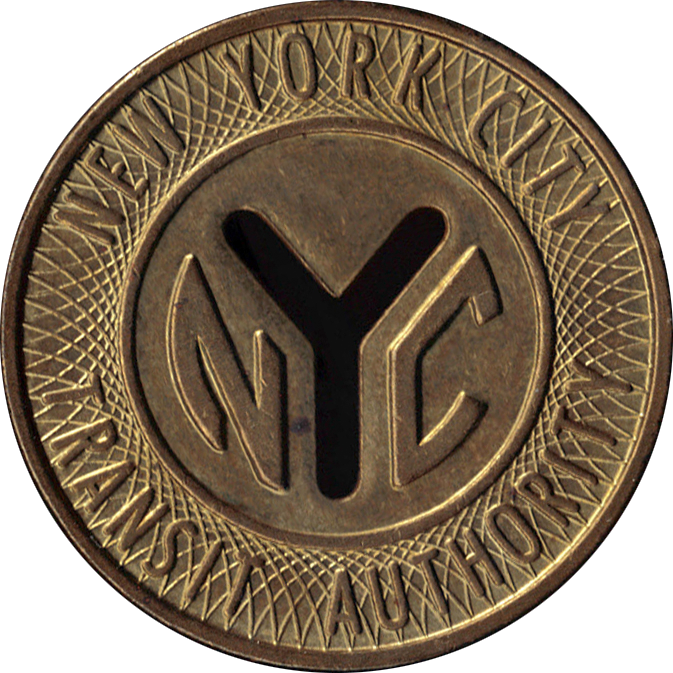 |
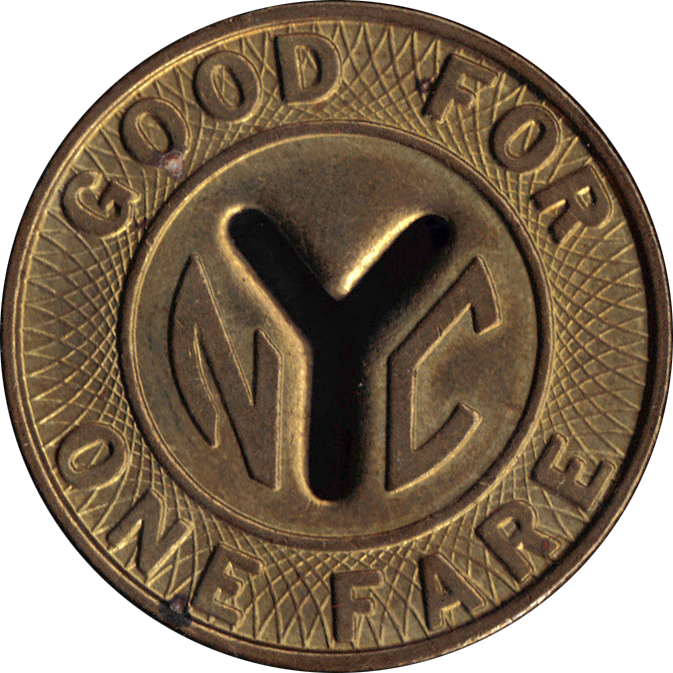 |
"Extra Large Special Fare Y Cutout" issued in 1966 at 75 cents as special fare token for trains to Aqueduct Race Track then repurposed for use for Express Buses late 1980's-1990's. 28mm / 1.10", brass, Y cutout Atwood-Coffee NY630AP uncommon; $15.00 |

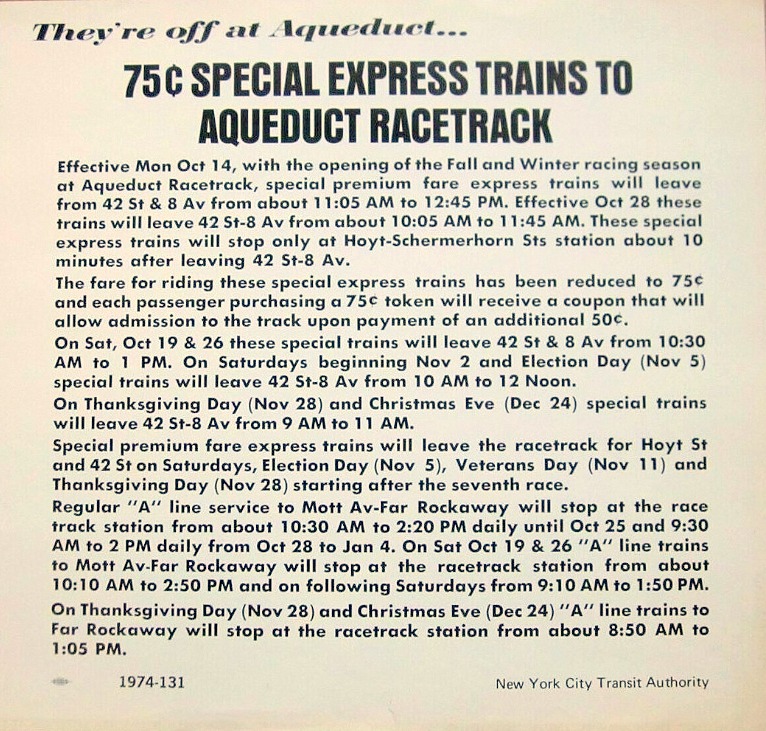
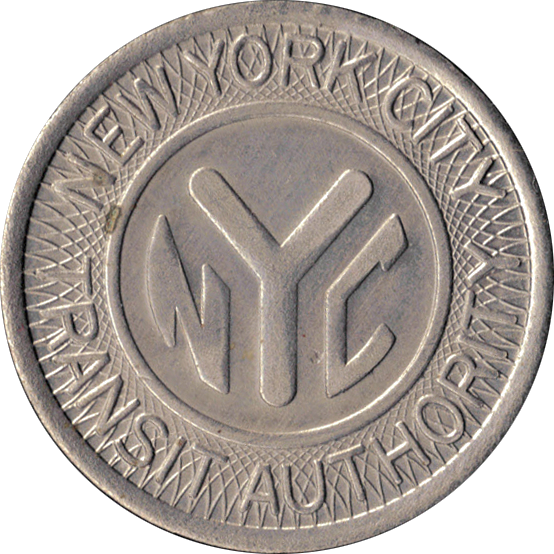 |
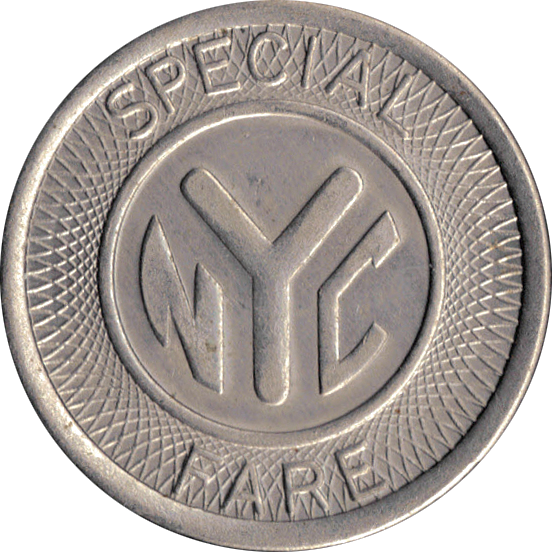 |
"Silver Special Fare" issued April 1979 used as special fare for train to Aqueduct Race Track. 500,000 struck 23mm / .90", white metal, solid Atwood-Coffee NY630AX uncommon; $20.00 |
| regular fare | Aqueduct Special fare | date | notes | |
| 15¢ | 50¢ | June 2, 1959 | US Half Dollars used in turnstiles with special mechanisms for Aqueduct Special |
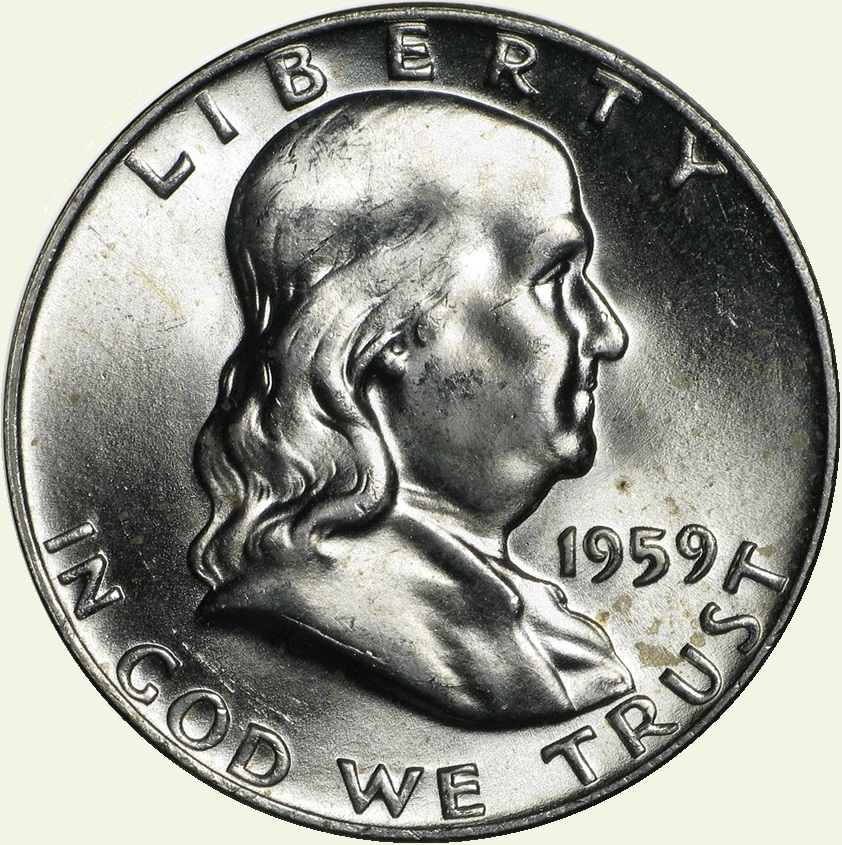 |
| 20¢ | 75¢ | July 5, 1966 | "Extra Large Special Fare Y Cutout" token instituted |
 |
| 30¢ | $1.00 | January 4, 1970 | ||
| 35¢ | $1.50 | January 5, 1972 | ||
| 35¢ | $1.00 | April 1972 | (reduced) | |
| 35¢ | 75¢ | October 14, 1974 | (reduced) 1974 NYCTA advertising card | |
| 50¢ | $1.00? | April 1979 | "Silver Special Fare" token instituted |
 |
| 60¢ | $1.50 | June 28, 1980 | ||
| 75¢ | $3.00 | October 1981 | end of "Silver Special Fare" token usage | |
| 75¢ | $5.00 | October 1981 | "Aqueduct Racetrack Special Fare Tickets" instituted: (to and from via JFK Express) |
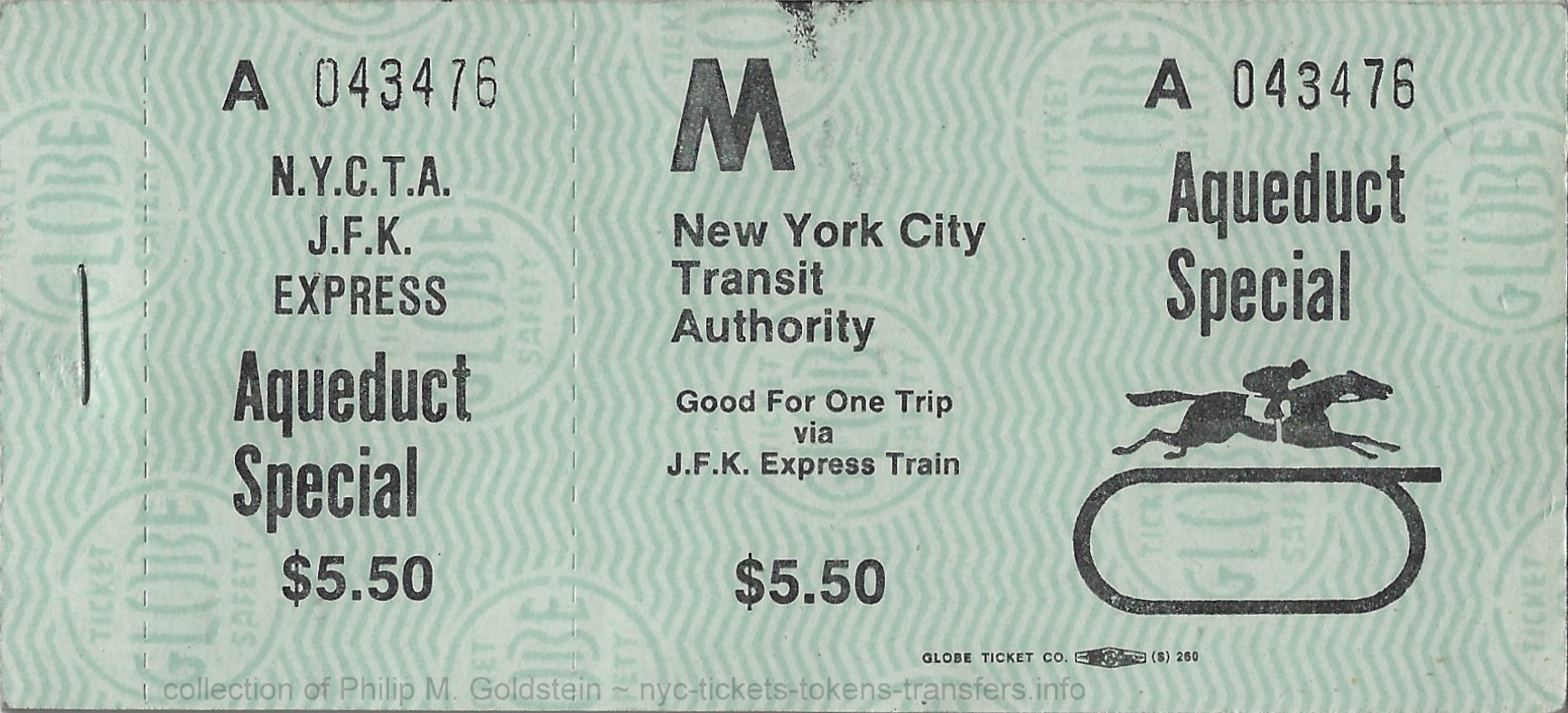 |
| $1.00 | $5.50 | January 1, 1986 | ||
 |
|
| N.Y.C.T.A. JFK Express Aqueduct Special $5.50 - 1986 Good for one Trip via J.F.K. Express Train received upon payment to on board agent upon boarding train It is understood the following tickets were issued beginning January 1, 1986, which is commensurate with the $5.50 JFK Express fare. These tickets would be sold by the railroad clerk onboard the JFK Express, not the conductor! (NYCTA conductors were not bonded to handle money.) 5 ⁹⁄₁₆" x 2 ½" |
|
| . . |
|
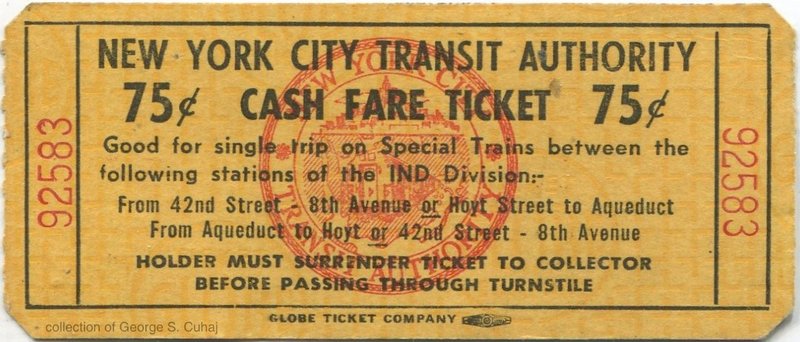 |
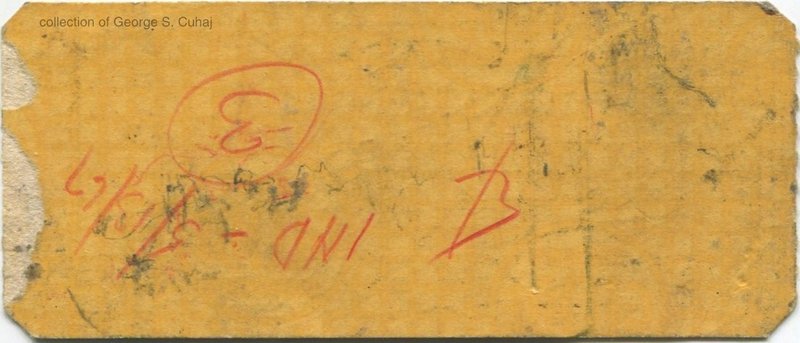 |
| 75¢ Cash Fare Ticket - 1967 Good for single trip on Special Trains between the following stations of the IND Division- From 42nd Street - 8th Avenue or Hoyt Street to Aqueduct From Aqueduct to Hoyt or 42nd Street - 8th Avenue Holder must surrender ticket to Collector Before Passing through Turnstile Special Trains to Aqueduct Racetrack May 15, 1967 Globe Ticket |
|
| .. . |
|
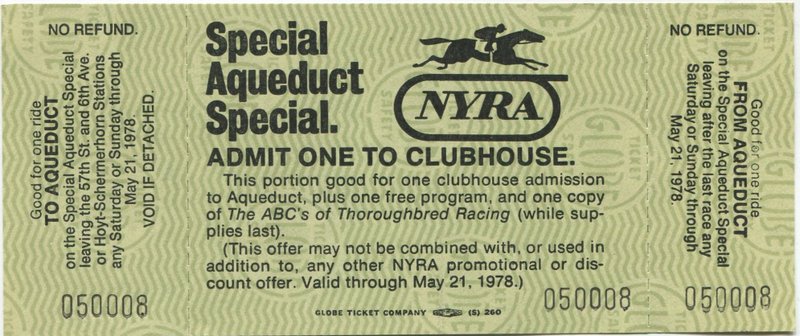 |
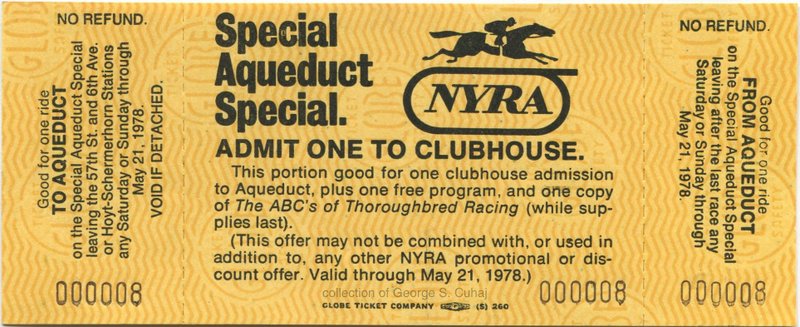 |
| "Special Aqueduct Special" - May 21, 1978 Subway fare (both directions), and clubhouse admission and one free program ticket to Aqueduct Racetrack issued by the New York Racing Association valid to May 21, 1978 Globe Ticket |
"Special Aqueduct Special" - May 21, 1978 Subway fare (both directions), and clubhouse admission and one free program ticket to Aqueduct Racetrack issued by the New York Racing Association valid to May 21, 1978 Globe Ticket |
| currently unknown why two different colors | |
Aqueduct Cash Fare Tickets
rarely encountered; $30.00 - 40.00 in good condition.
Special Aqueduct Special
rarely encountered; $30.00 - 40.00 in good condition.
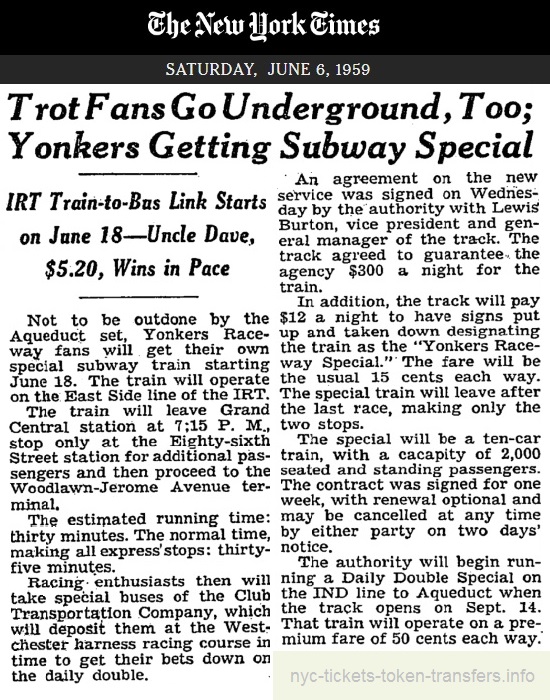 |
While
the Aqueduct Special is fairly well remembered and documented, I was taken aback when
I discovered there was a Yonkers Raceway counterpart. Well, sort of, anyway. After the NYCTA announced the creation of the Aqueduct Special in 1959, it also announced it would initiate a limited express service to Yonkers Raceway as well. Yonkers Raceway ran trotters also known as harness racing (horses with sulkies) and not thoroughbred racing like at Aqueduct or Belmont. From the following New York Times article, the train cost the standard 15 cent fare each way (and not a 50 cent premium fare like the Aqueduct Special cost). The train departed from the IRT Grand Central Station at 7:15 pm, with one stop at 86th Street, and the destination being Woodlawn - Jerome Avenue Terminal. From here, passengers will have transfered to special buses operated by Club Transportation for the final leg of their trip to Yonkers for an additional 25 cents. For the return trip, the train would depart Woodlawn- Jerome Avenue after the last race at 12:20 am, making two stops (86th Street) and Grand Central Station. This train was to operate though the end of the Yonkers meeting on July 31. I could find no other information on this train in later editions of the NY Times, so it is presumed this Yonkers Raceway Special did not see a second running. As it used regular fare, it is not expected that special tokens or tickets existed. |
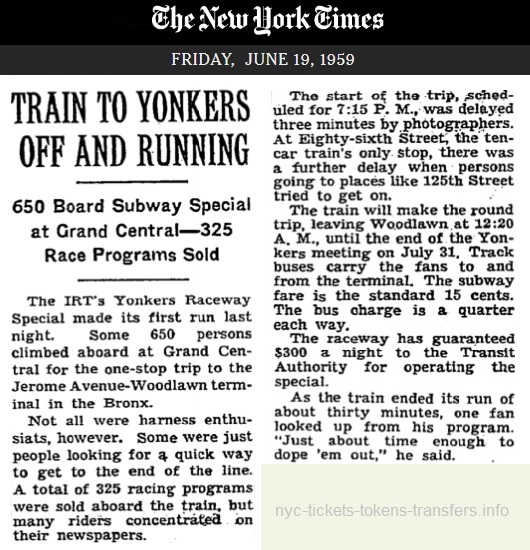 |
.
.
![]()
Football Subway Special at the Polo Grounds:
Stepping back in time by a few decades; the NYCTA operated N. Y. Titans Football Specials, which departed from the IND Parsons Boulevard Station in Queens at 6:40 pm, with one stop at 42nd Street and Eighth Avenue and terminating at the 155th Street Station which serviced the Polo Grounds at 7:35 pm.
Tickets for the Football Subway special were sold at the Parsons
Boulevard and the 42nd Street Stations for 50 cents. The ticket, when
turned in with $1.25, allowed the passenger a discount on grandstand
seating that was normally priced at $4.00 (a discount of $1.75).
The first mention of this Football Special is published in the
November 2, 1960 edition of the New York Times. The Titans would only
play at the Polo Grounds located in northern Manhattan for three
seasons, after which they were renamed the New York Jets, and took up
residence in the newly built Shea Stadium in Flushing Meadows - Corona
Park in Queens.
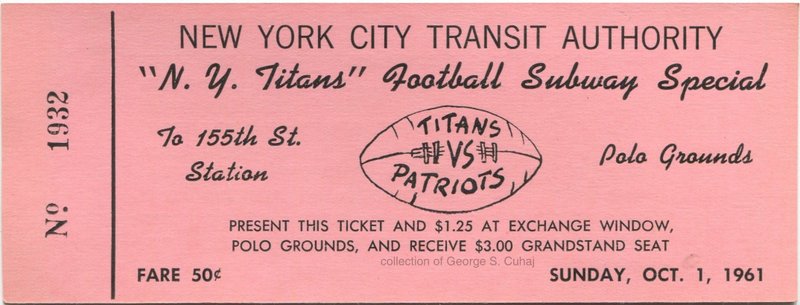 |
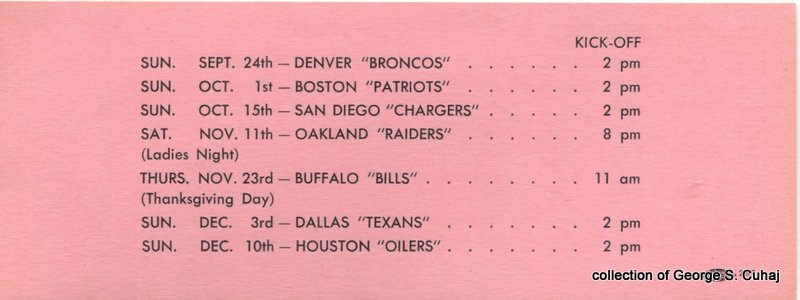 |
| October 1, 1961 - New York Titans vs. Boston Patriots (American Football League) | |
| . | |
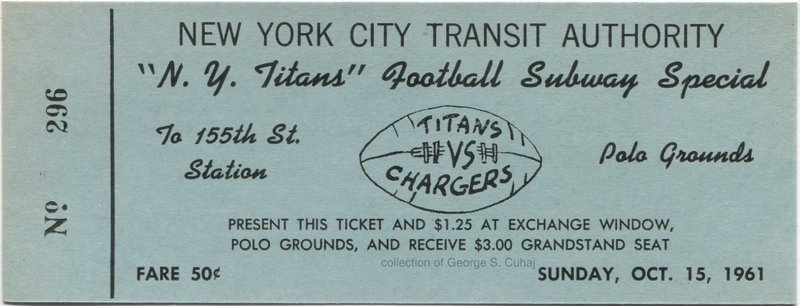 |
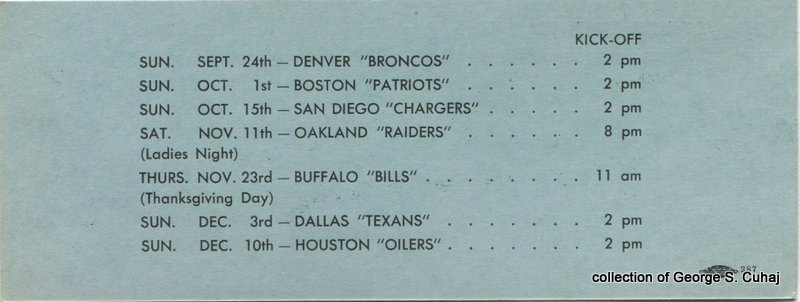 |
| October 15, 1961 - New York Titans vs. San Diego Chargers (American Football League) | |
.
.
![]()
|
Not much was known about this item; and frankly it was not known
to exist until the following advertising sign appeared on eBay. July 1958
Research commenced of the New York Times Article archives, and they revealed that the NYCTA inaugurated a daily reserved seat express service to Rockaway Playland station commencing in July 1958, for a one station-stop express train departing 42nd Street & Eighth Avenue IND, a stop at IND Hoyt-Schermerhorn startion; departing that station 10:42 AM and concluding at Playland Station (Beach 98th Street) in the Rockaway, Queens. As first offered, the train schedule departure time was 9:30 am from 42nd Street and Eighth Avenue; and departure time from Rockaway at 3:30 pm. Tickets at first were sold only at 42nd Street and Eighth Avenue station and running time was 38 minutes. From the sign at right, a $1.55 fare purchased a round trip ticket (which was worth 60 cents - remember the Rockaways were a double fare zone then!) When the ticket was was presented at the admission booth of Playland:
Revised 1958 Service
Upon immediate public feedback however, the NYCTA adjusted the departure time from 42nd Street and Eighth Avenue to 10:30 am (one hour later), and the Rockaway Playland / Beach 98th Street departure to 5:45 pm (2 hours and 15 minutes later); Furthermore, the NYCTA added additional special ticket booths at the IND 34th Street and Sixth Avenue station, at the IRT Times Square and 34th Street and the IRT Lexington Avenue and Grand Central stations. |
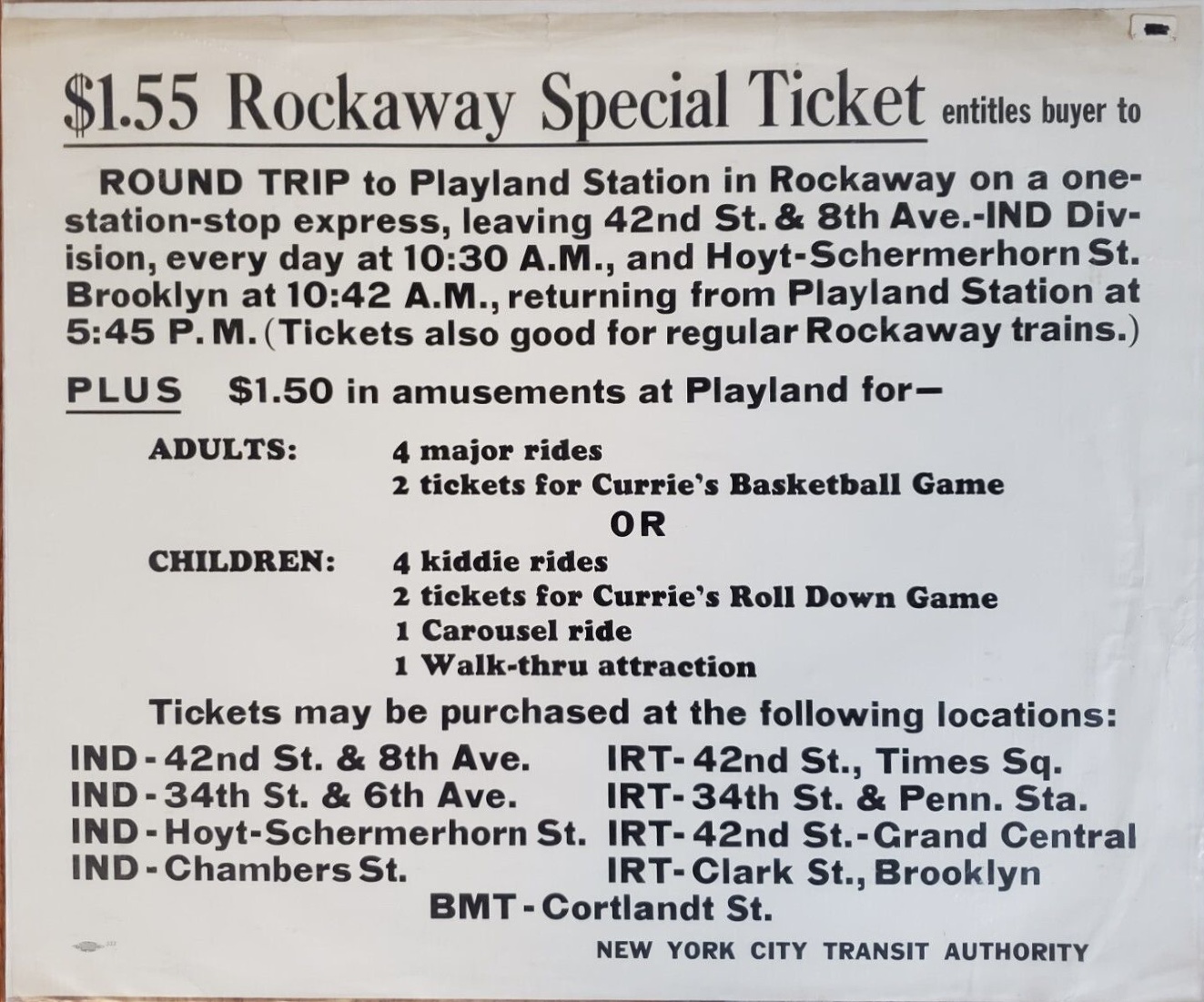 |
Summer 1959 Service
For the 1959 Summer Season, service was curtailed to weekend only operation and Labor Day; and service was not run on rainy days.
Tickets were now being sold both individually for $1.55 and in a 6 ticket family pack for $7.50. This afforded a savings of $1.80 over individually purchased tickets.
Ticket sales locations was expanded once again, and were now available at four IND stations at 42nd Street & Eighth Avenue, 34th Street & Sixth Avenue, Hoyt-Schermerhorn Street, Chambers Street; IRT 42nd Street & Times Square, 42nd Street and Grand Central, 34th Street and Penn Station, Clark Street; and one BMT station at Cortland Street and tickets were sold from 8 am to 9 pm at these locations
End of Service Date - The Big Question Mark
There is no mention of the Rockaway Special Service in 1960 or in any other newspaper editions or public notices, so this service is not believed to be survived into the 1960 Summer season, however this requires confirmation.
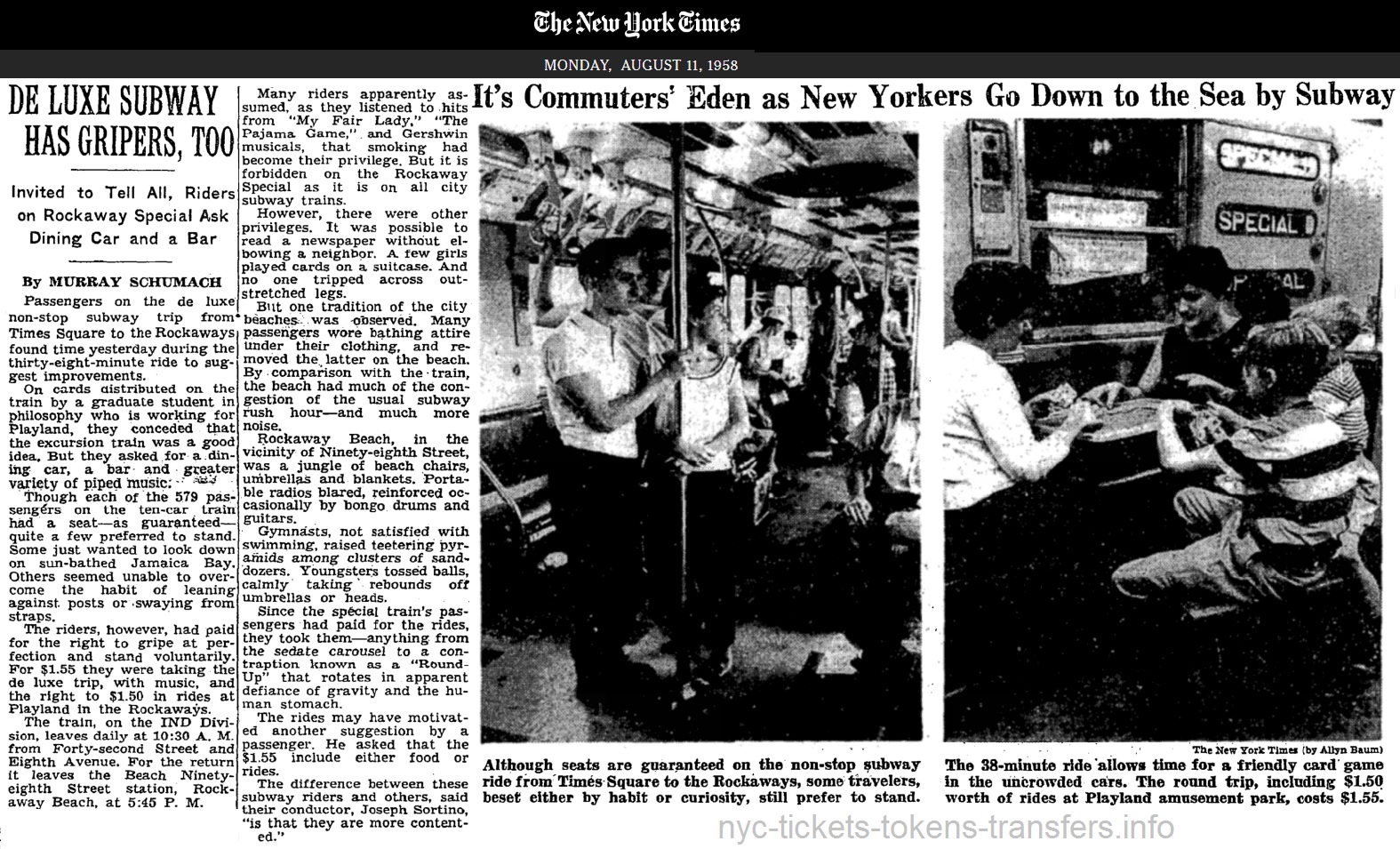 |
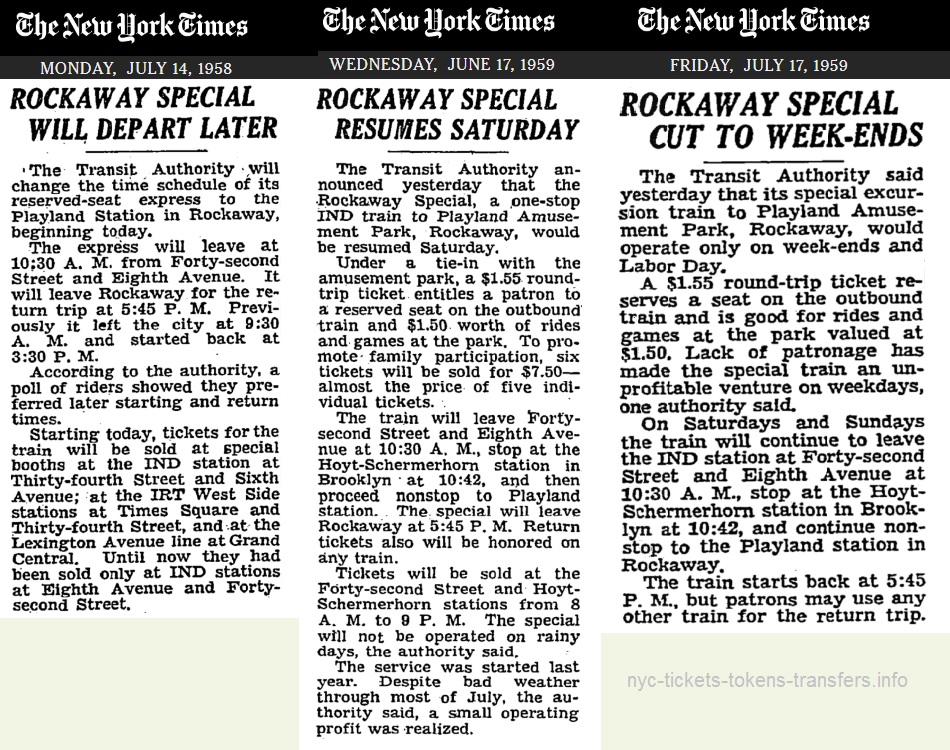 |
.
.
.![]()
| Child Fare | . . | Adult Fare |
| 1976 | ||
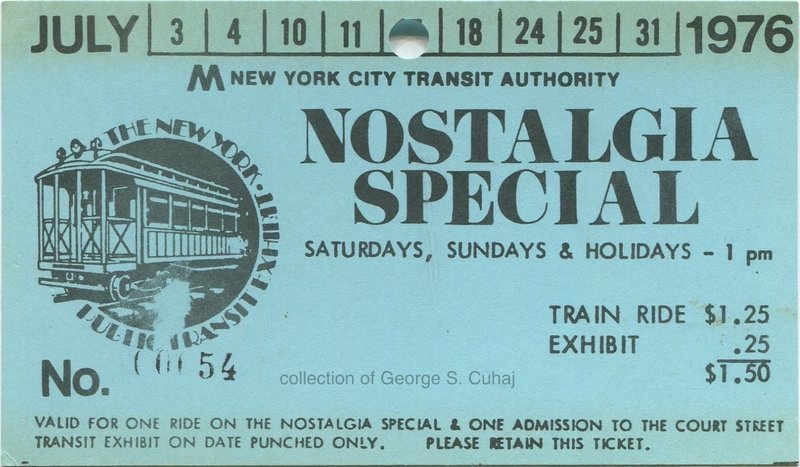 |
intentionally left blank | |
| July 17, 1976 - issued | ||
| . | ||
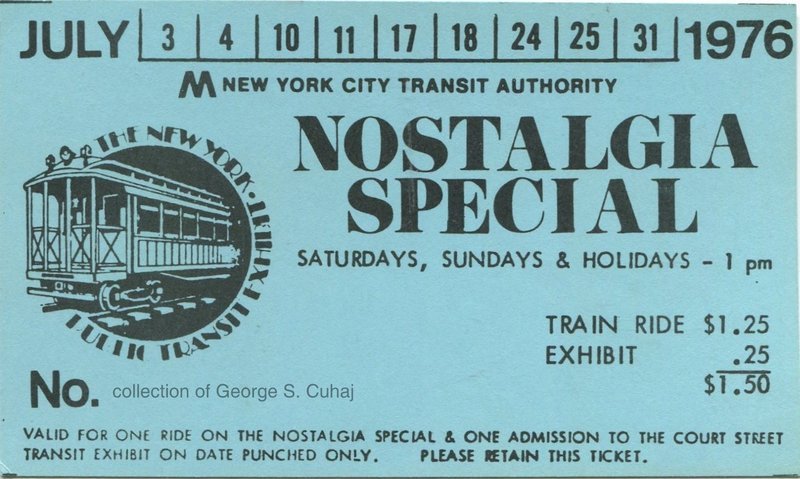 |
intentionally left blank | |
| unissued - undated - Child Fare | ||
| . | ||
| .intentionally left blank | 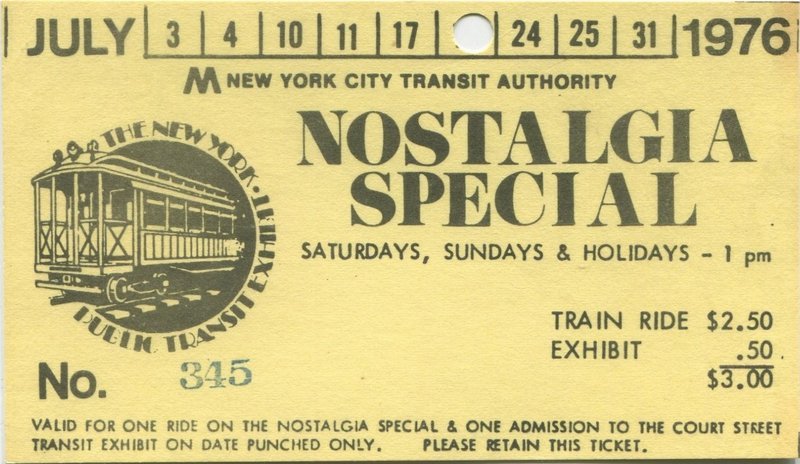 |
|
| July 18, 1976 - Adult Fare | ||
| . | ||
| intentionally left blank | 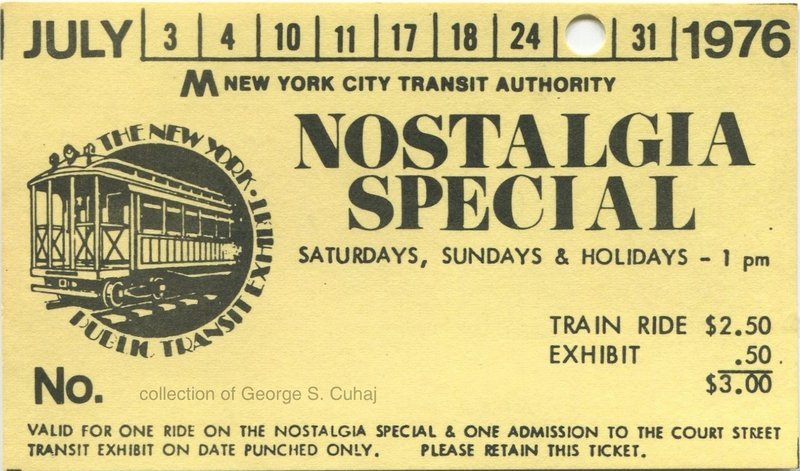 |
|
| July 25, 1976 - Adult Fare 4 7/8" x 2 15/16" these seem cut on a table top cutter probably should have been 5x3 |
||
| . | ||
| intentionally left blank | 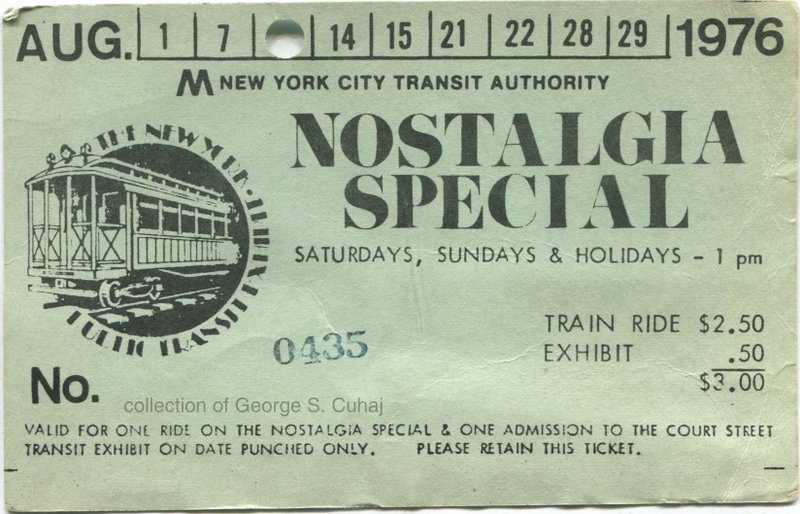 |
|
| August 8, 1976 - Adult Fare | ||
| . | ||
| intentionally left blank | 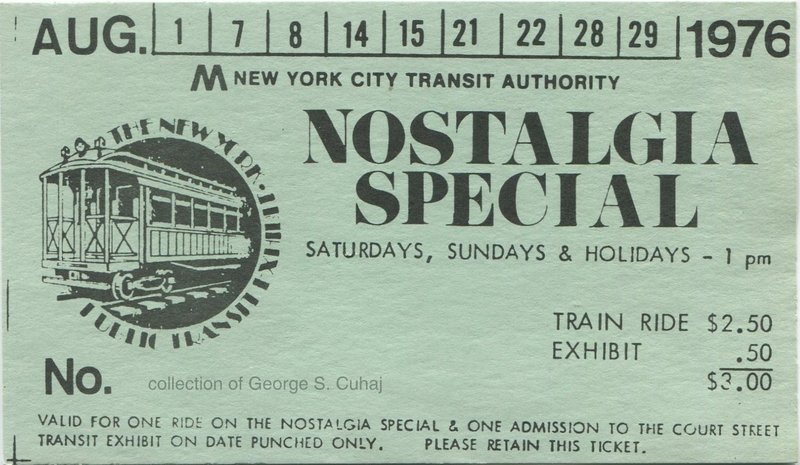 |
|
| August 8, 1976 - Adult Fare and unissued August 1976 5" x 3 3/16" |
||
| . | ||
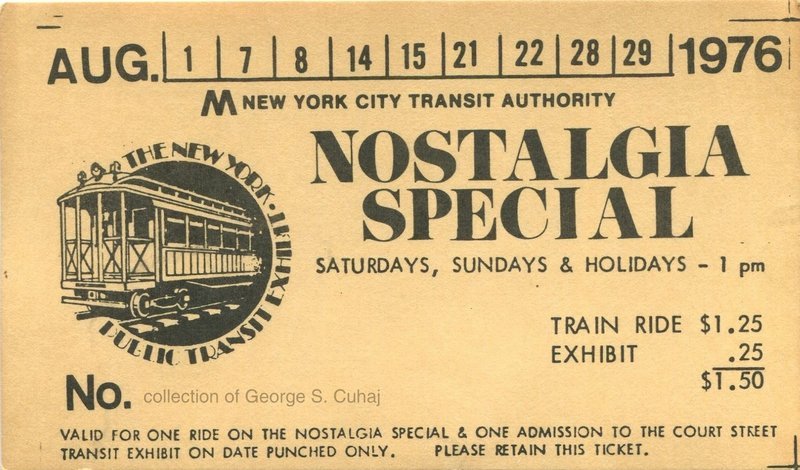 |
intentionally left blank | |
| unissued August 1976 - Child Fare | ||
| . | ||
| intentionally left blank | 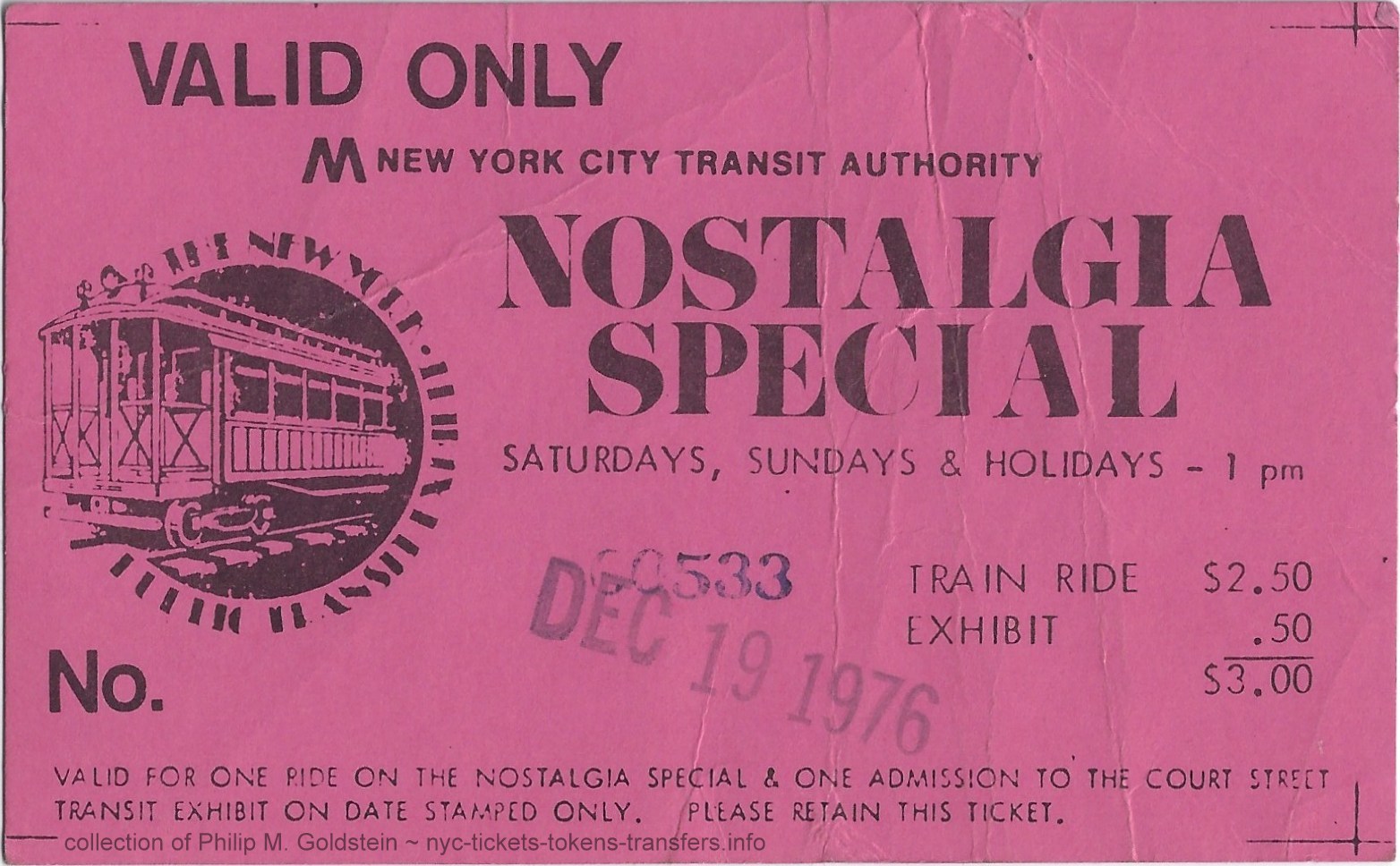 |
|
| December 19, 1976 - Adult Fare 5⅛" x 3⅛" |
||
| . | ||
| . | 1977 | |
| intentionally left blank | 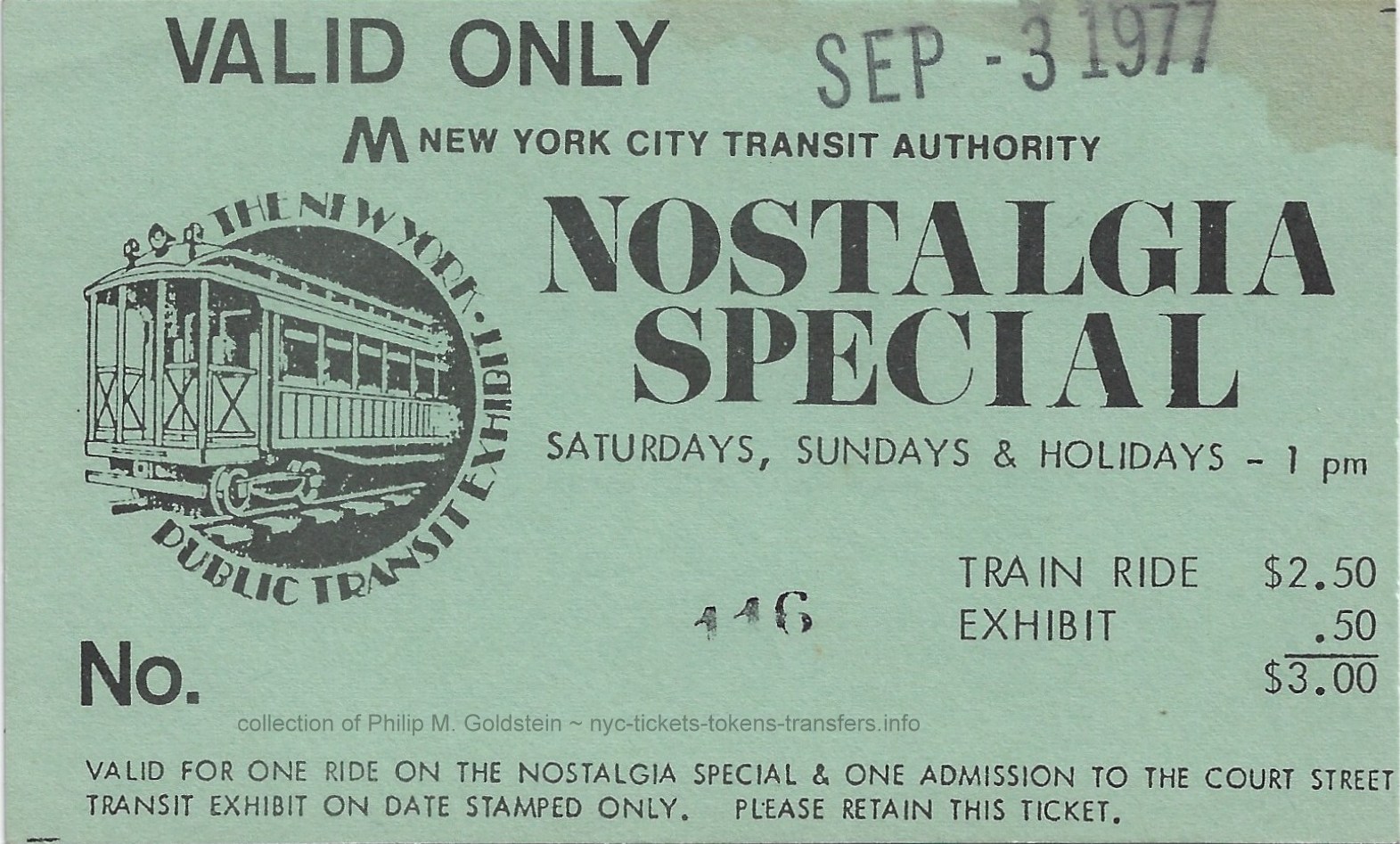 |
|
| September 3, 1977 - Adult Fare 5⅛" x 3⅛" |
||
| . | ||
| . | 1978 | |
| intentionally left blank | 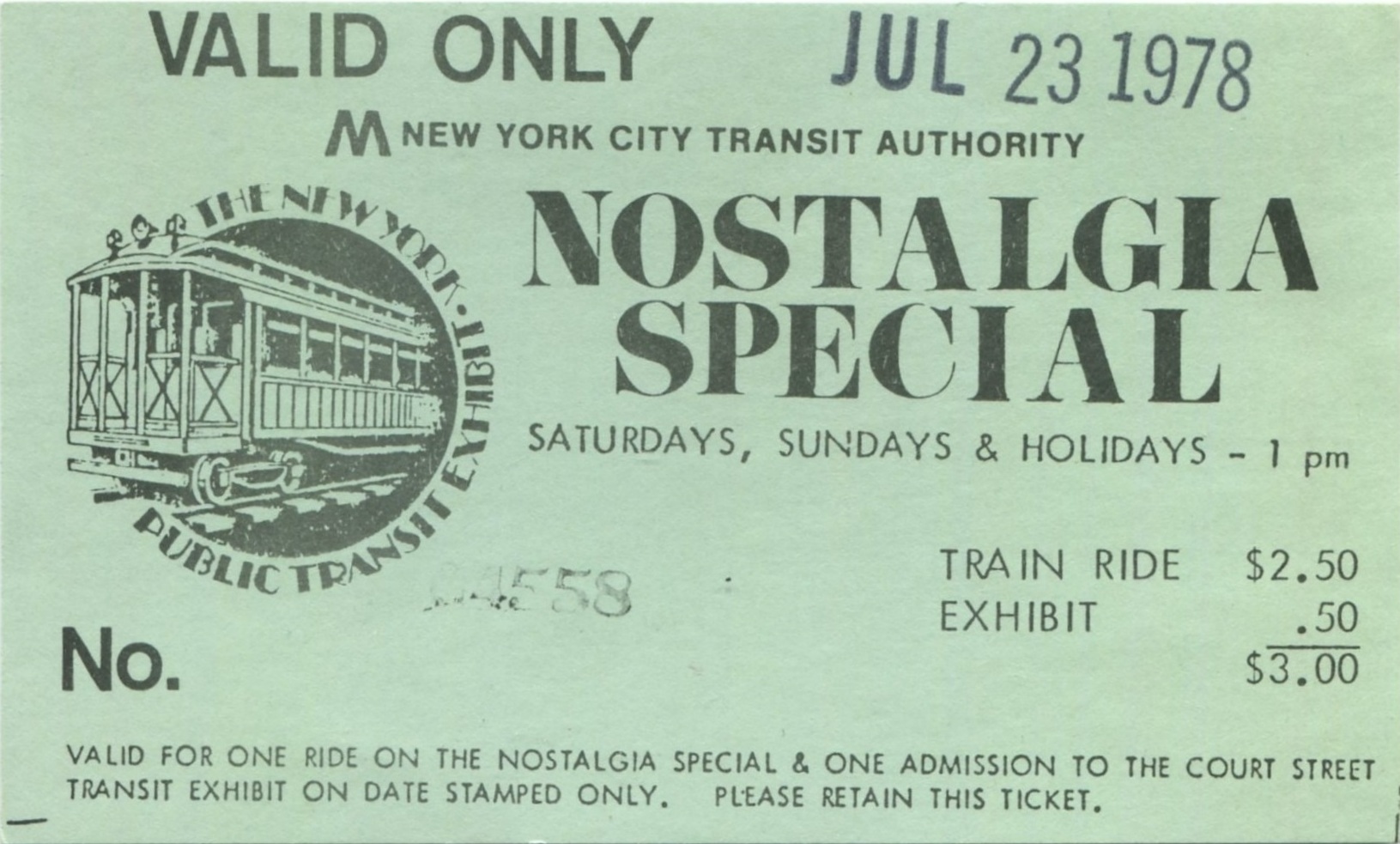 |
|
| July 23, 1978 - Adult Fare (green) | ||
| . | ||
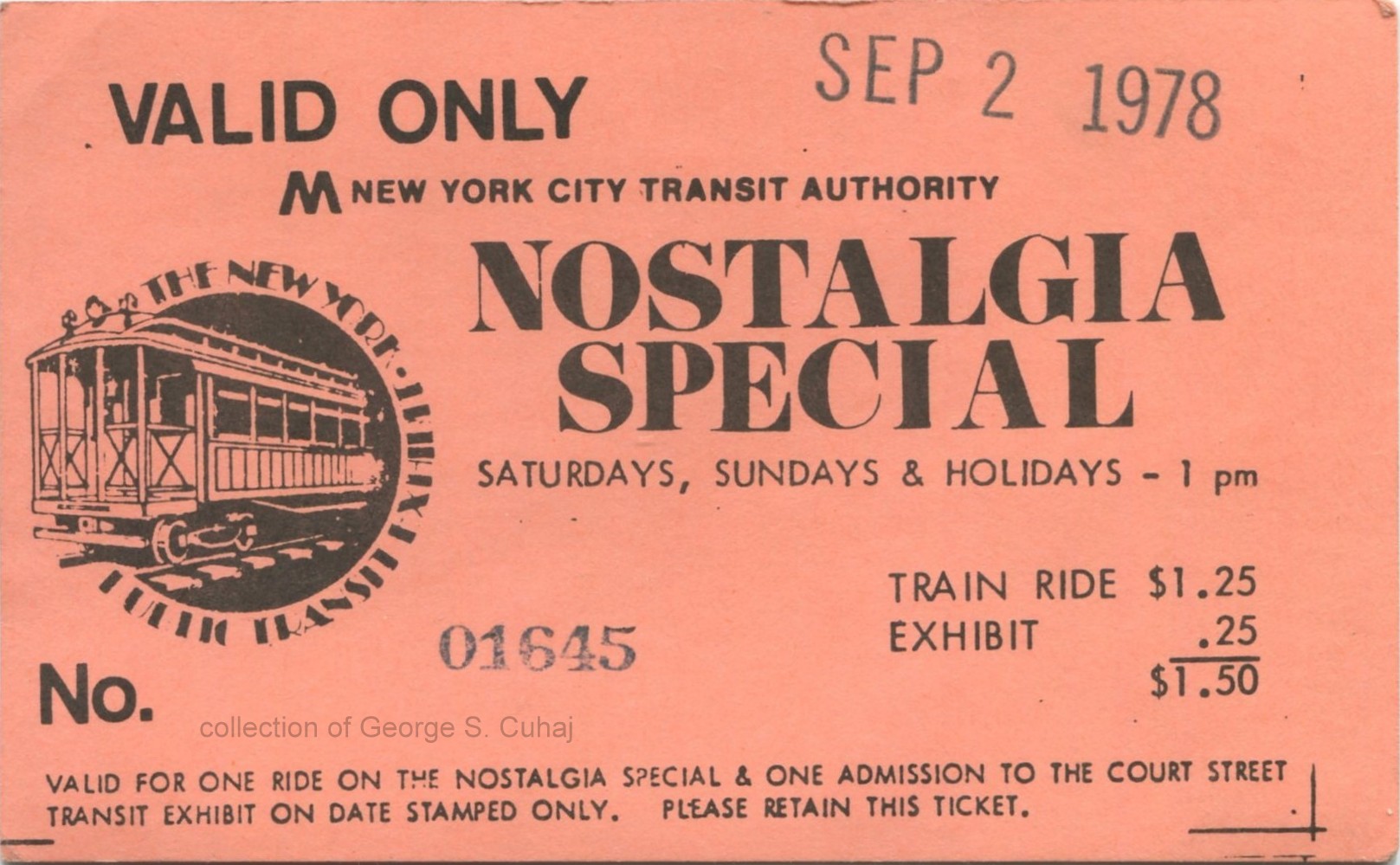 |
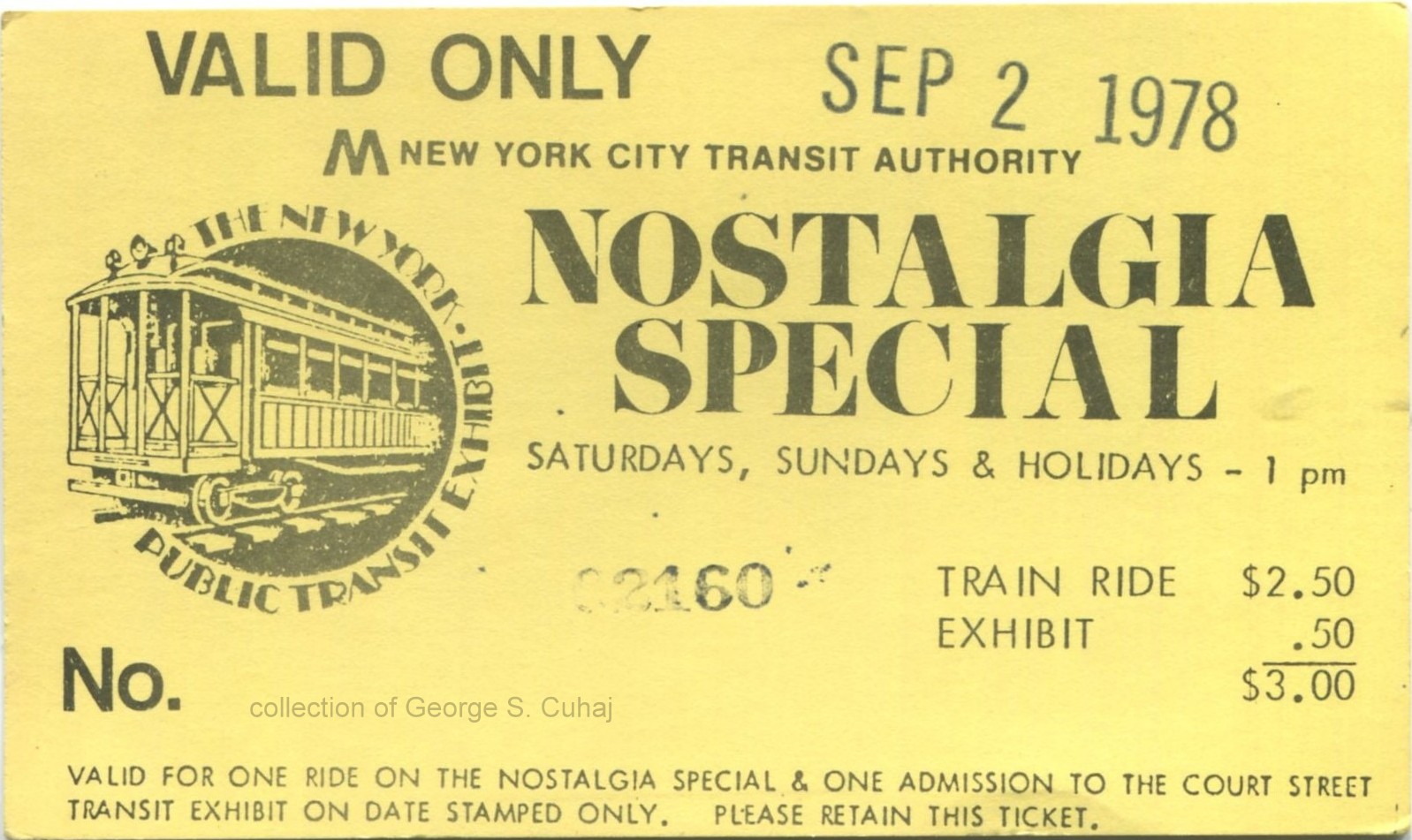 |
|
| September 2, 1978 - Child Fare (salmon) | September 2, 1978 - Adult Fare (yellow) | |
| . | ||
| intentionally left blank | 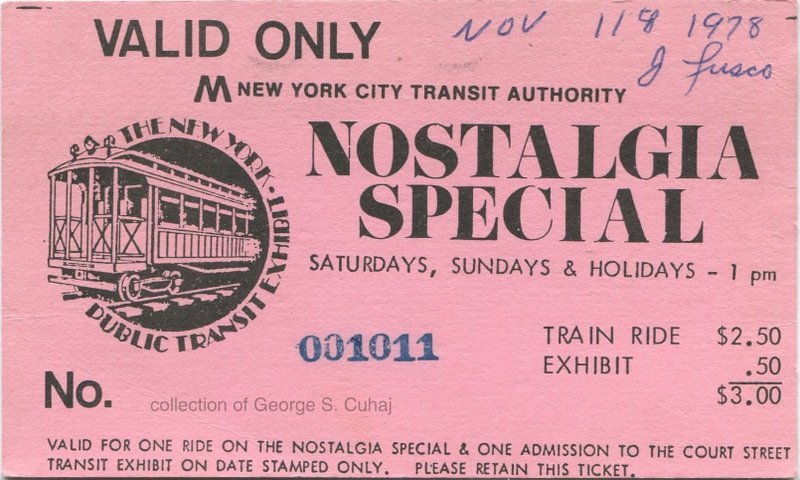 |
|
| November 11, 1978 - Adult Fare (pink) | ||
| Undated / Unissued | ||
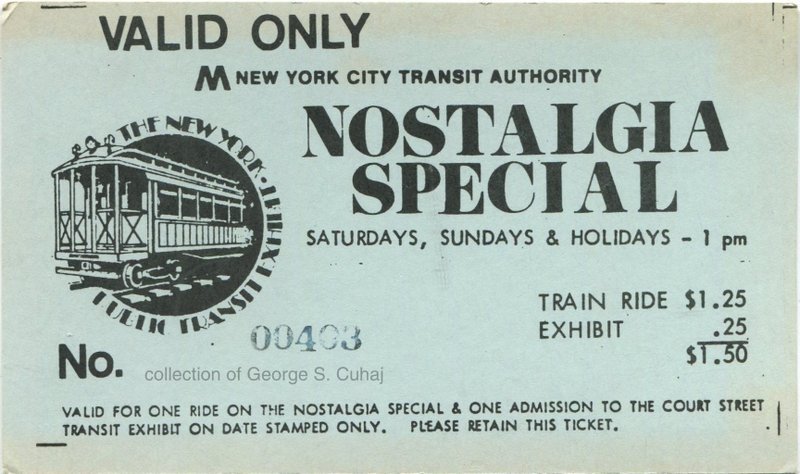 |
intentionally left blank | |
| undated - Child Fare (blue) | ||
| . |
||
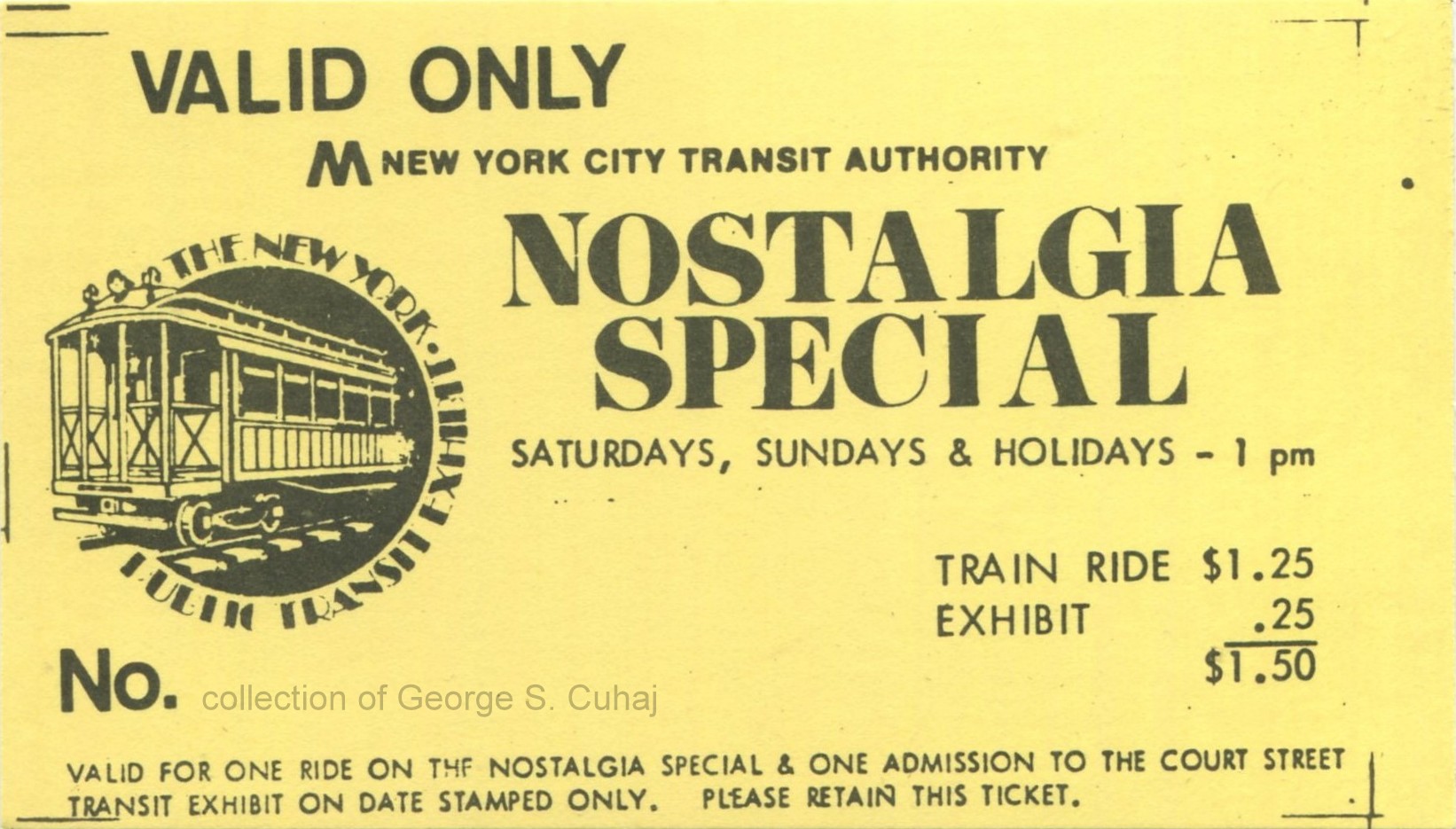 |
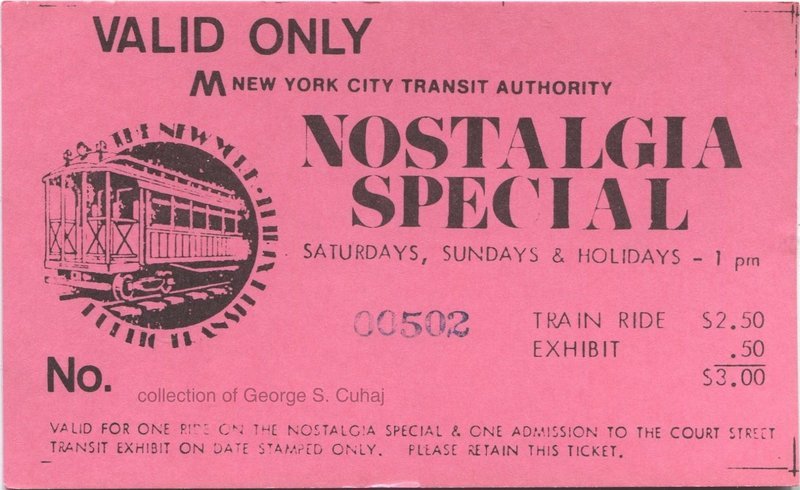 |
|
| undated - Child Fare (yellow) | undated - Adult Fare (pink) | |
| . | ||
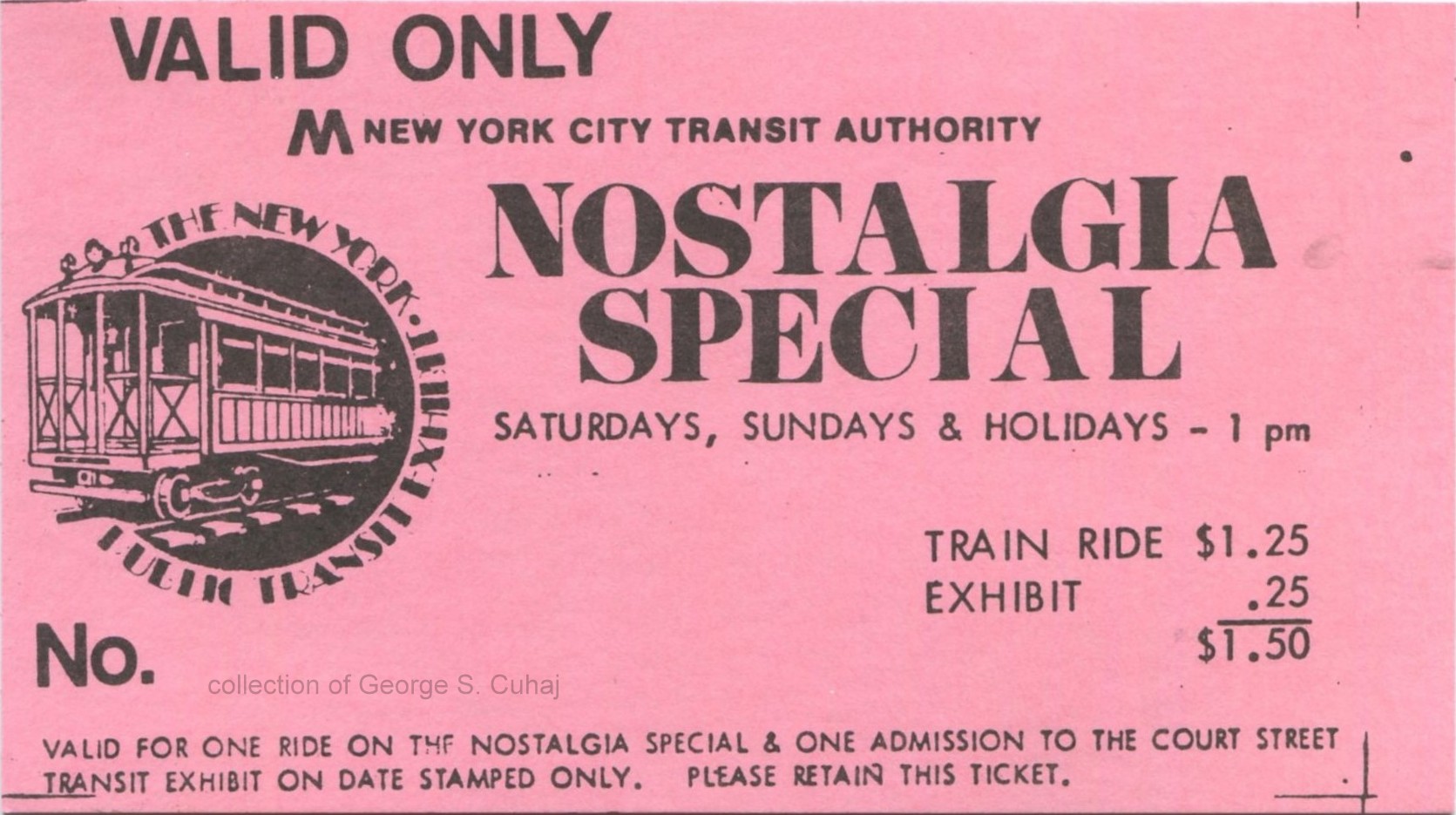 |
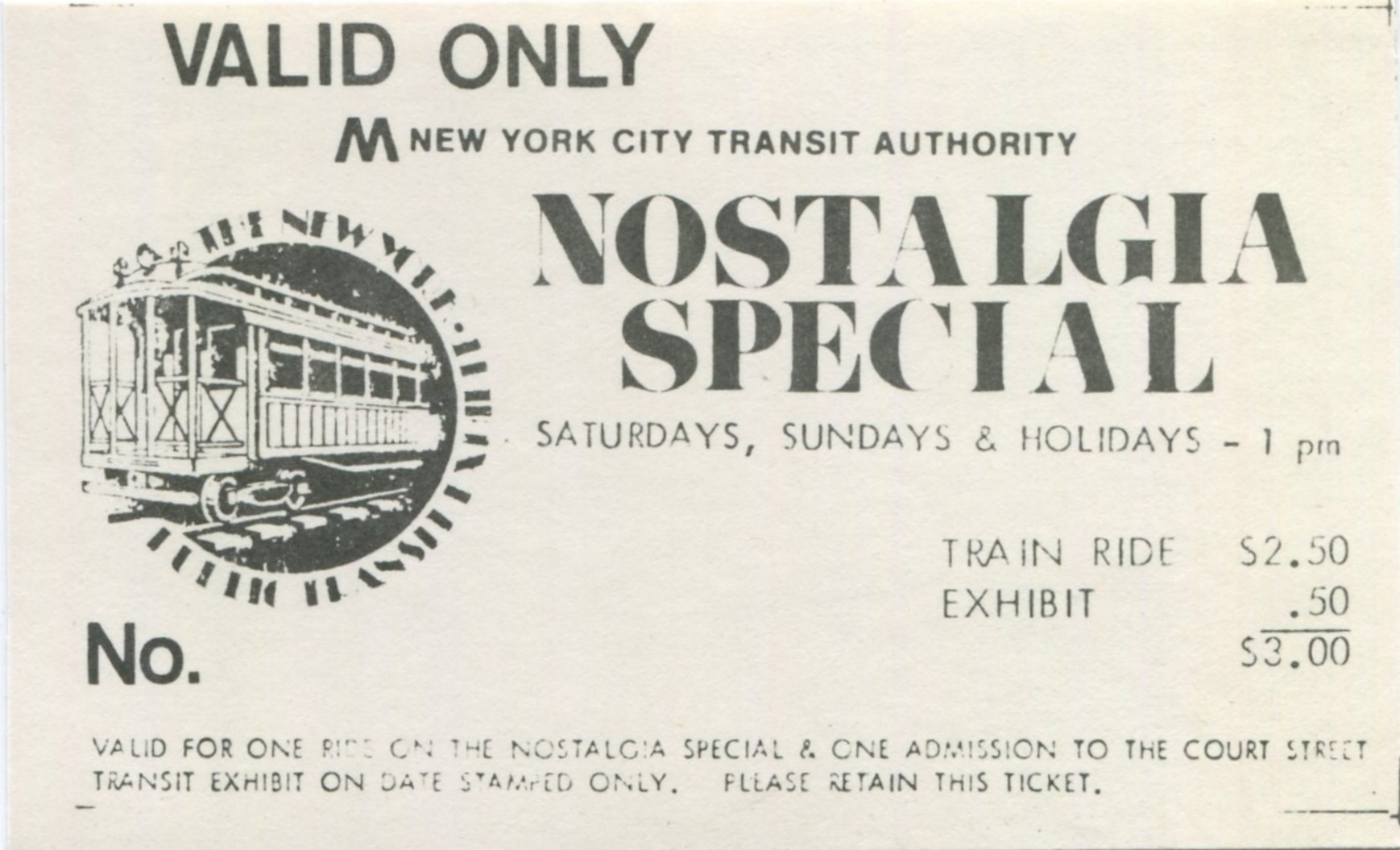 |
|
| undated - Child Fare (pink) | undated - Adult Fare (white) | |
| 1979 | ||
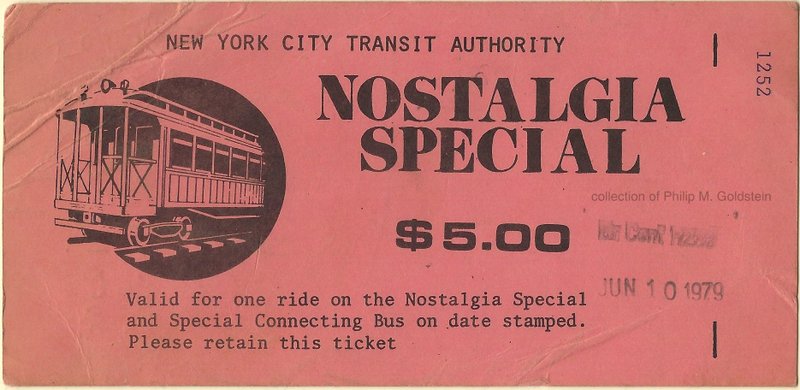 |
||
| June 10, 1979 - with Special Connecting Bus 6³⁄₁₆" x 3" all adult and child's tickets for Nostalgia Special above are common; $3.00 to $5.00 each. |
||
| . | ||
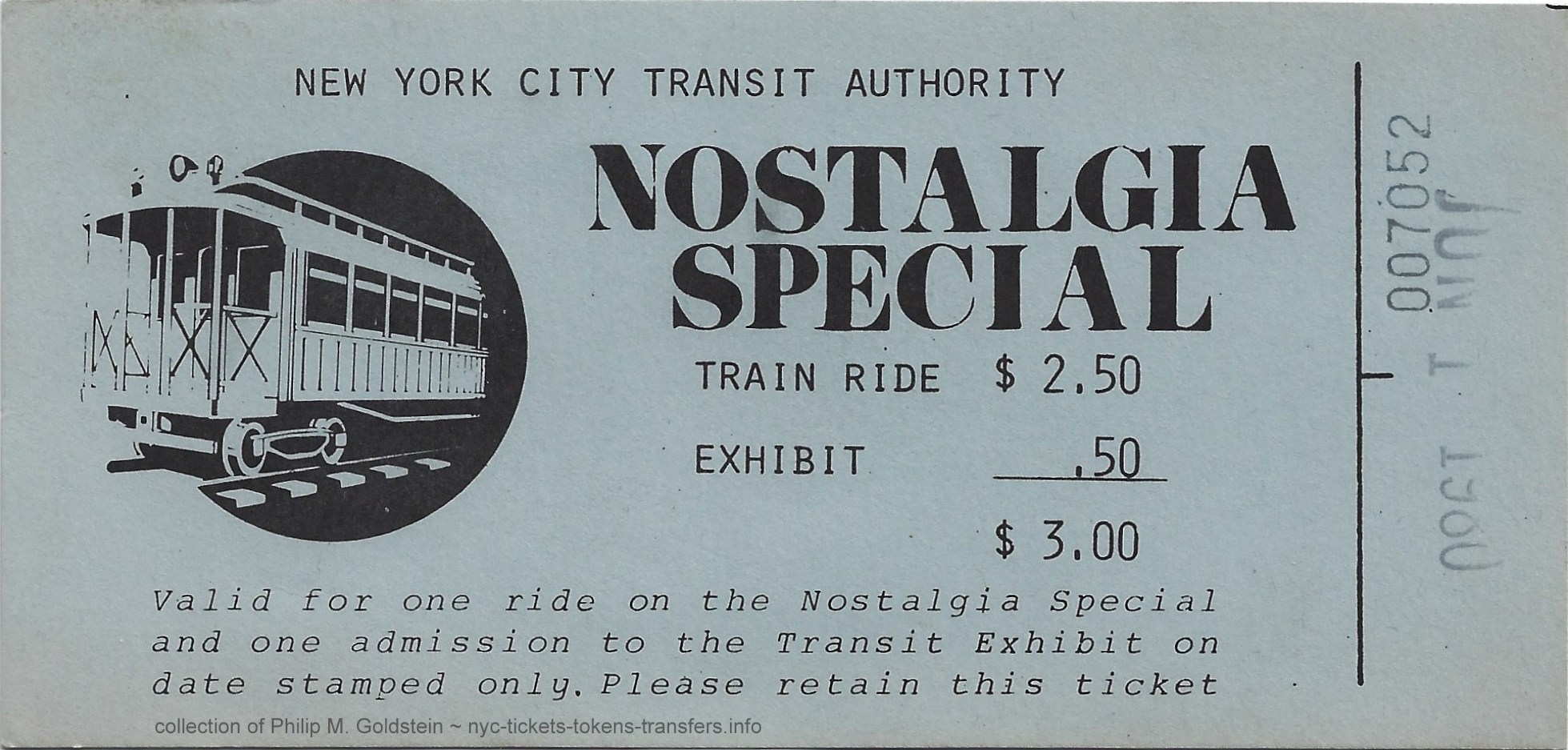 |
||
| . | ||
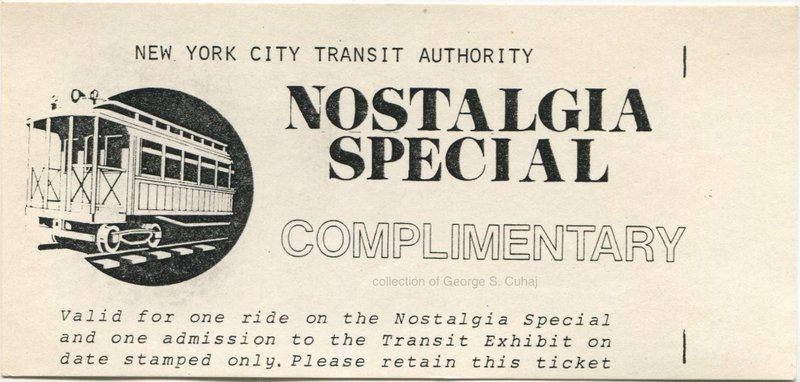 |
||
| Nostalgia Special Ticket - Complimentary uncommon, but sporadically encountered - $15.00 to $20.00. |
||
June 28, 1980 Fare for the Nostalgia Train rose 50 cents from $3.00 to $3.50 for adults and 25 cents for under 17: $1.50 to $1.75.
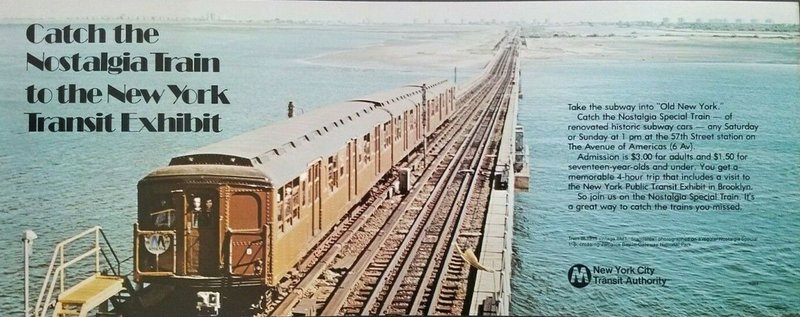
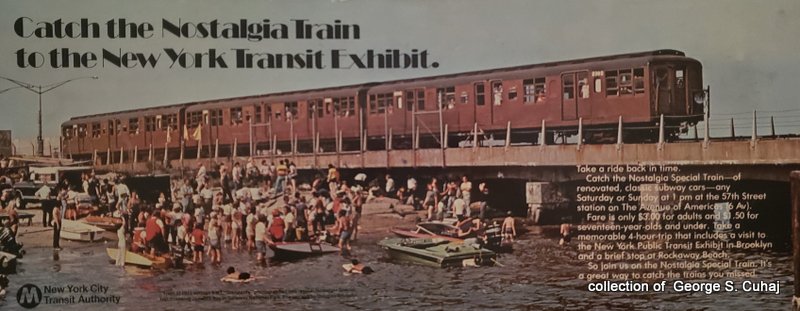
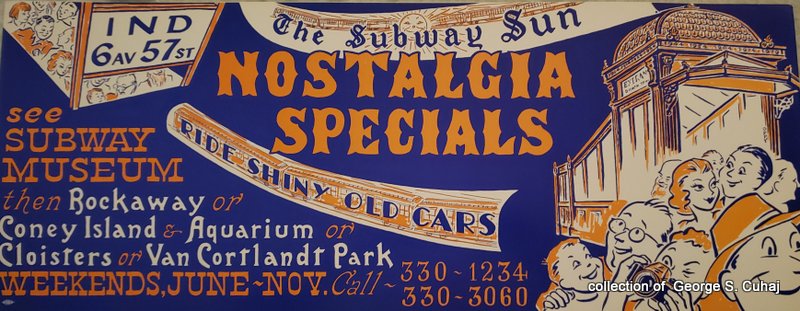
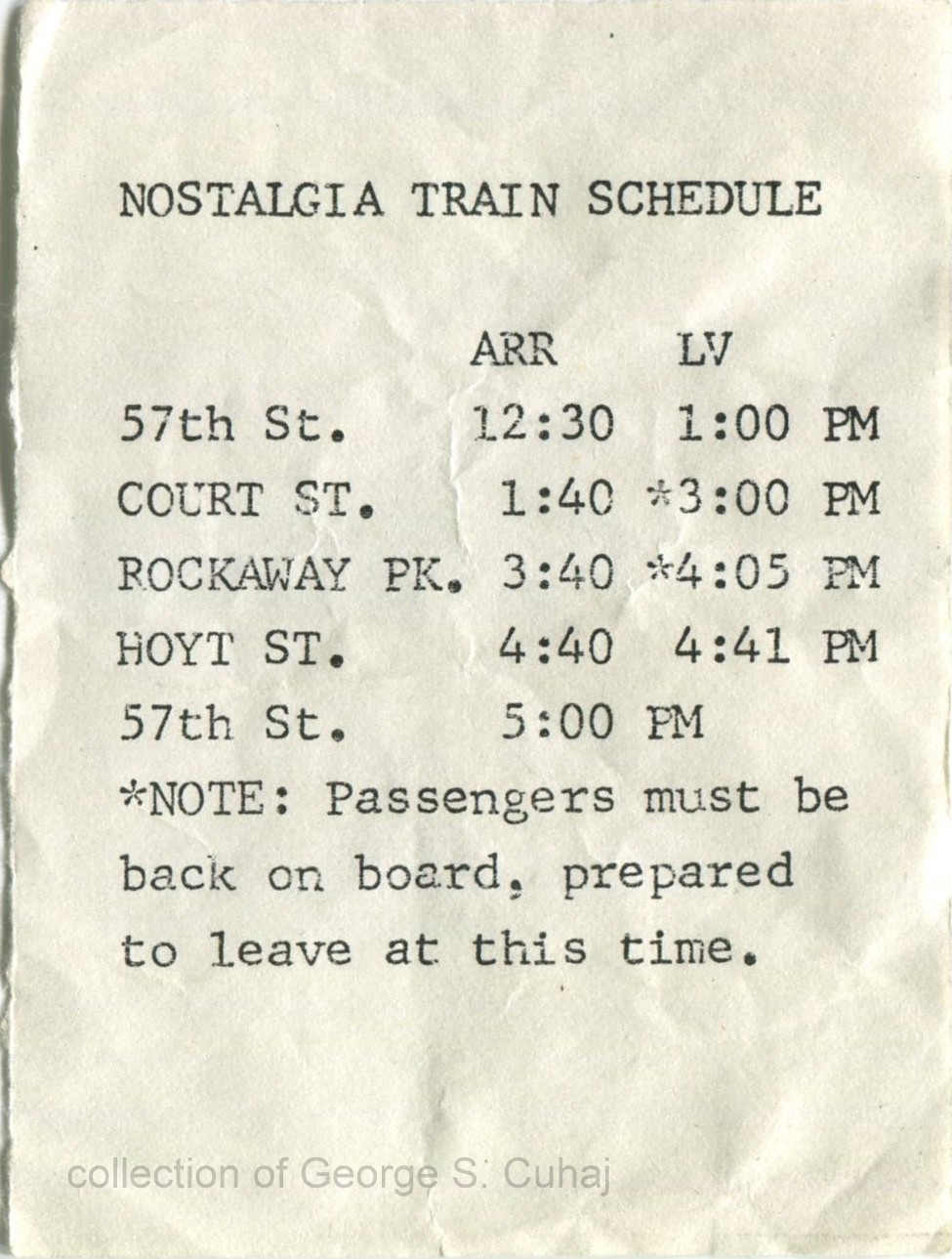
3³⁄₁₆" x 4¼"
.
.
Block tickets are issued for unplanned temporary interruptions of service due to fire, flood, derailment, law enforcement activity, signal problems, or power outages.
This ticket allows a
passenger of whom has already paid their fare, to alight from a subway
train, exit the paid portion of the system and
reenter at another location to take an alternative subway line or bus
instead, without having to pay a second fare.
These tickets are good for 48 hours but are seldom marked with a date or time. The meaning
of the N & B letter codes is currently unknown - if you know please send me
an email .
| Brooklyn Manhattan Transit System |
|
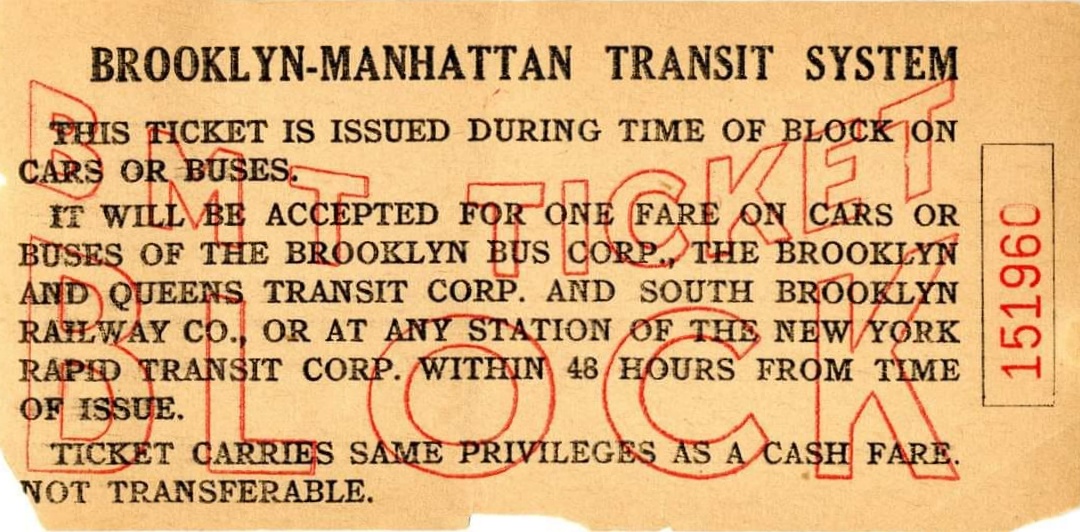 |
|
| . . |
|
| First Unification - 1940-1953 | |
| The
reason of the letter codes 'B', 'N' and 'R' remain unknown at this time.
The printers information reflect they were two separate issues,
and not a reprint of of a single issue as both printing dates are "Dec '40". A fleeting thought was
perhaps the letters denoted particular subway lines of usage, but route letters were not
in use at time of this issue (December 1940), and furthermore a single
change booth could serve different lines. Nor does it denote rapid or
surface methods "at any station or surface car" as all are listed on both tickets. Update: 3/25/2025: upon reading Eric R. Oszustowicz's "The Elevated Railways of Brooklyn and the BMT Subway; Volume 2", page 302; there is/was in place a letter code system denoting station ranges. Granted, this letter code system is shown in the book during the 1960's era; but these letters are represented as such seen on the block tickets below, and I can't help but wonder if the system was carried over from Board of Transportation era of operation. This needs to be confirmed. A = Broadway BMT: Lexington Avenue - Whitehall St; Nassau St Subway at Essex St, Bowery, and Broad Street |
|
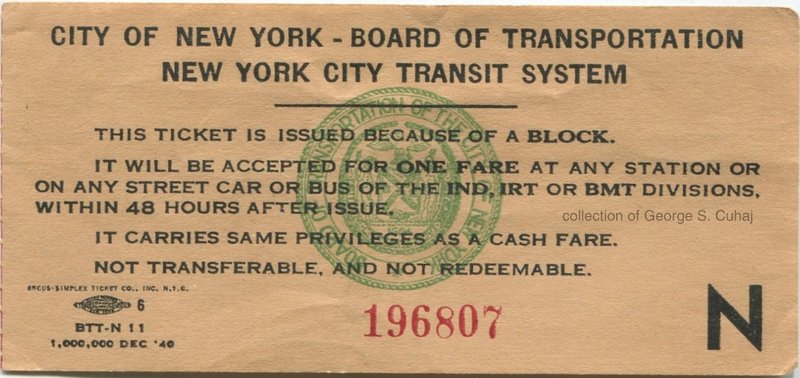 |
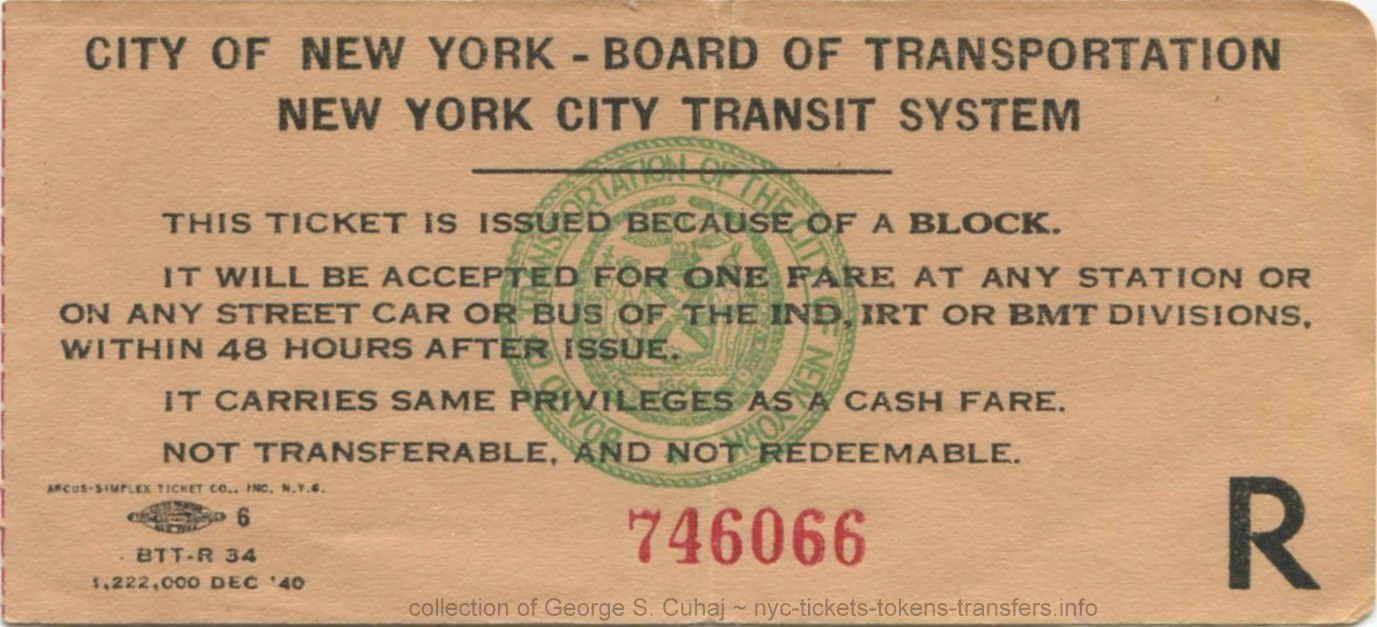 |
| sans-serif "N" December 1940 BTT-N 11 Arcus Simplex Brown 4⅜" x 2-¹⁄₁₆" |
sans-serif "R" December 1940 BTT-R 34 Arcus Simplex Brown 4⅜" x 2" inches high. |
| . | |
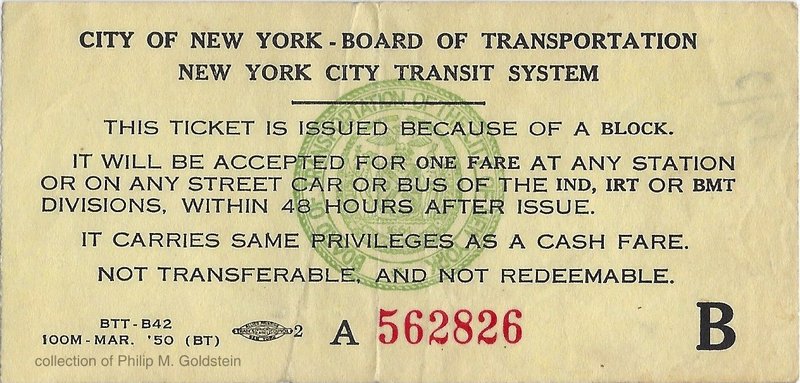 |
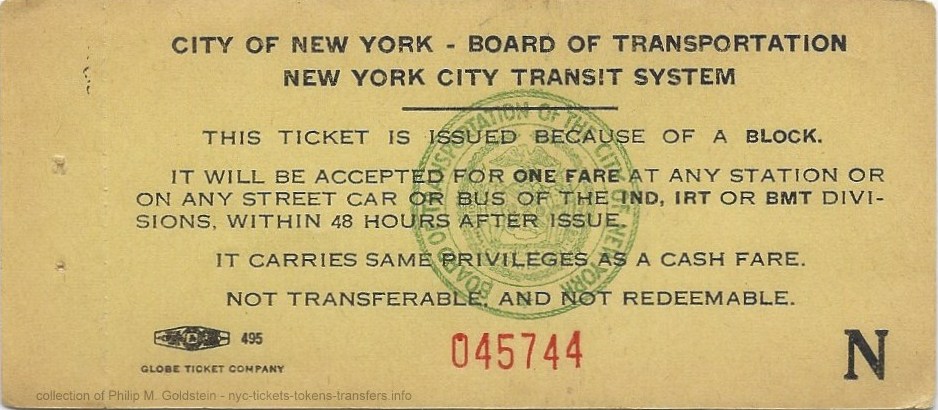 |
| "A" prefix - serif B BTT - B42 - March 1950 (BT) unknown printer 4³⁄₁₆" x 2" |
serif 'N' Globe Ticket 4⅝" (including ½" selvage) x 2" |
| . . |
|
| Second Unification; 1953 to 1962 (old Transit logo) | |
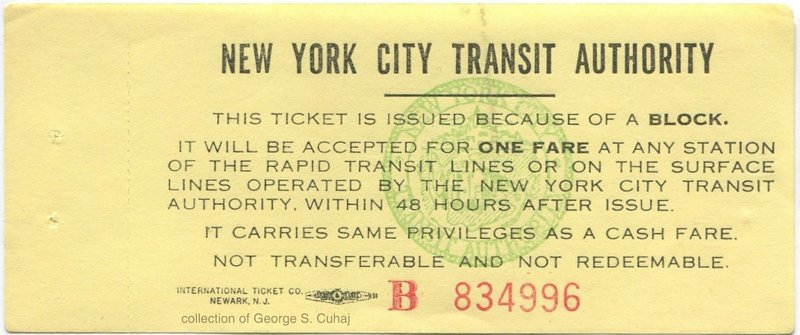 |
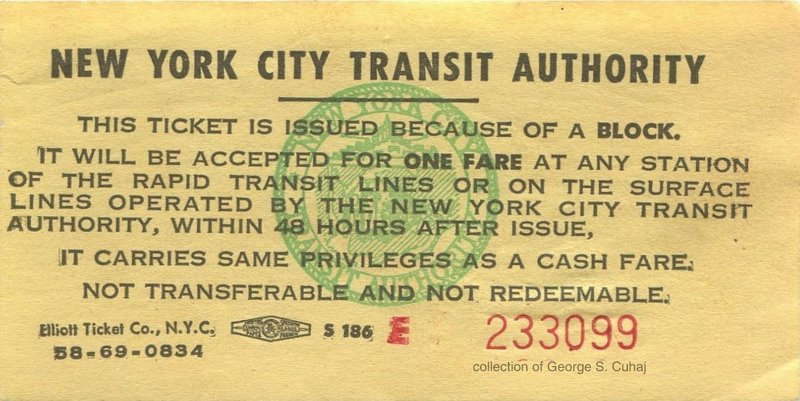 |
| serif "B" prefix ca. 1953 - 1962? International Ticket - serif B 4¾" by 2", including selvage |
sans-serif "E" prefix ca. 1953 - 1962? Elliott Ticket 58-69-0834 |
| . | |
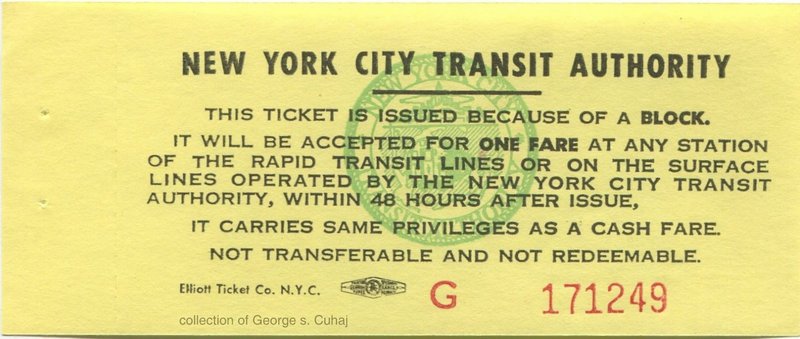 |
intentionally left blank |
| sans-serif "G" prefix ca. 1953 - 1962? Elliott Ticket - sans-serif G 4¾" by 2", including selvage |
|
| . | |
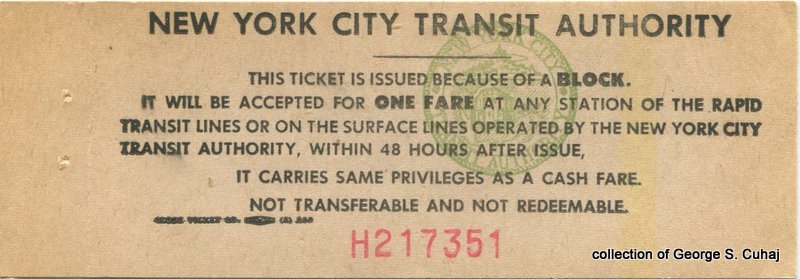 |
intentionally left blank |
| H prefix - buff yellow stripe ca. 1953 - 1962? Globe Ticket - 5¹³⁄₁₆" with selvage by, and 2" |
|
| . | |
| In regard to the next group of issues, it has not yet been determined if the prefix letter played a part in relation to the color of the issue; or what (if anything); the color of the paper denoted. | |
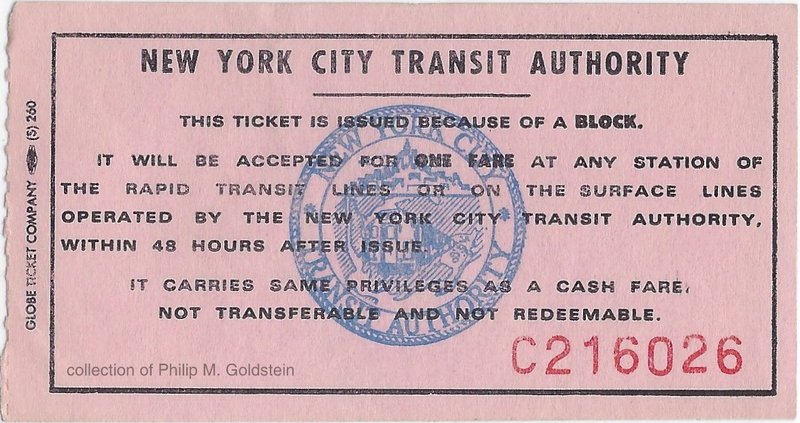 |
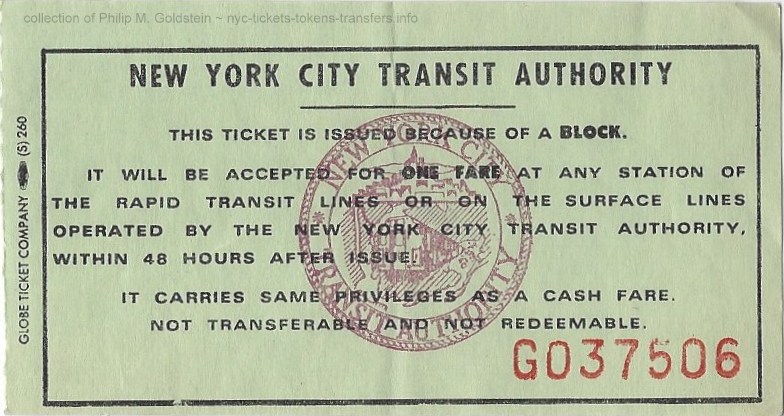 |
| C prefix (pink) ca. 1970's - 1980's? Globe Ticket 3¹³⁄₁₆" x 2" |
G prefix (green) ca. 1970's - 1980's? Globe Ticket 3¾" x 2" |
| . | |
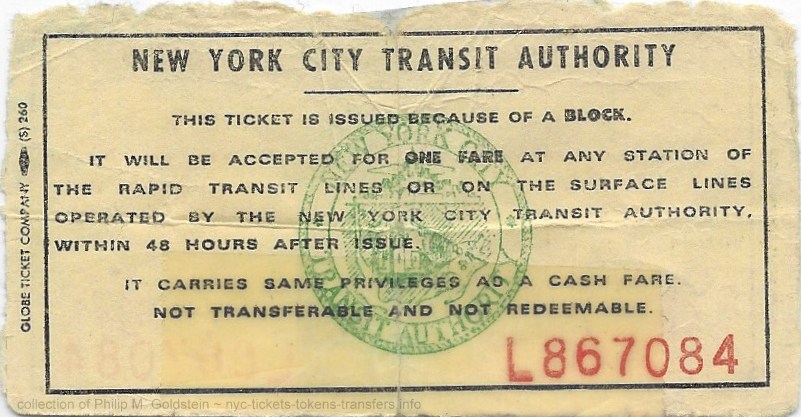 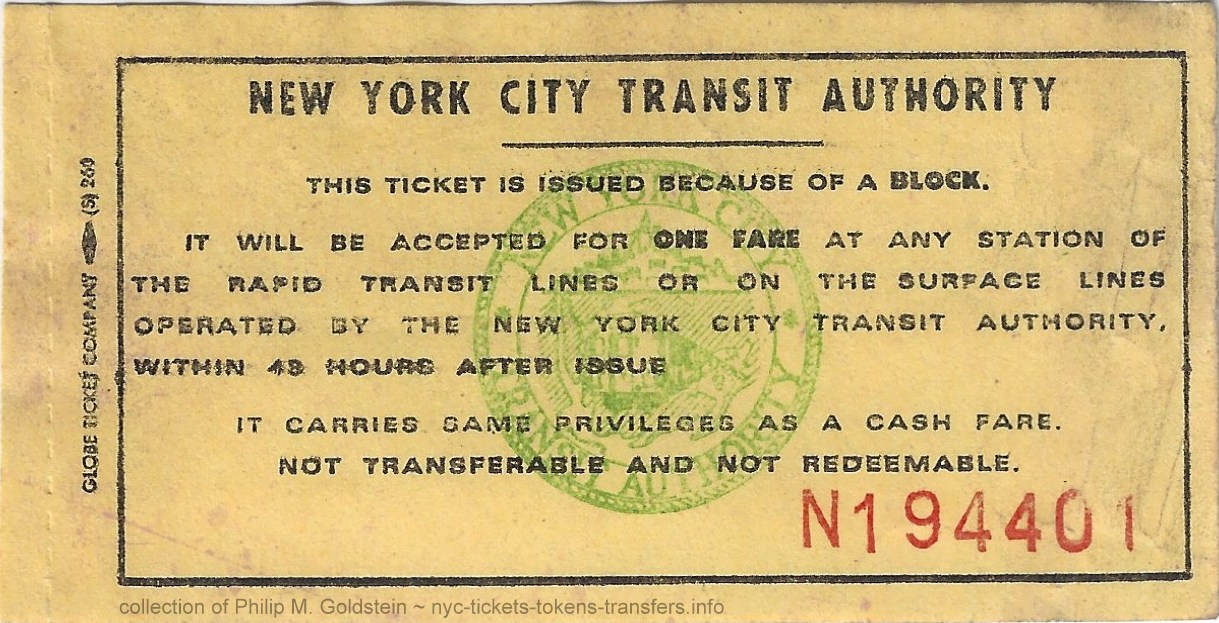 |
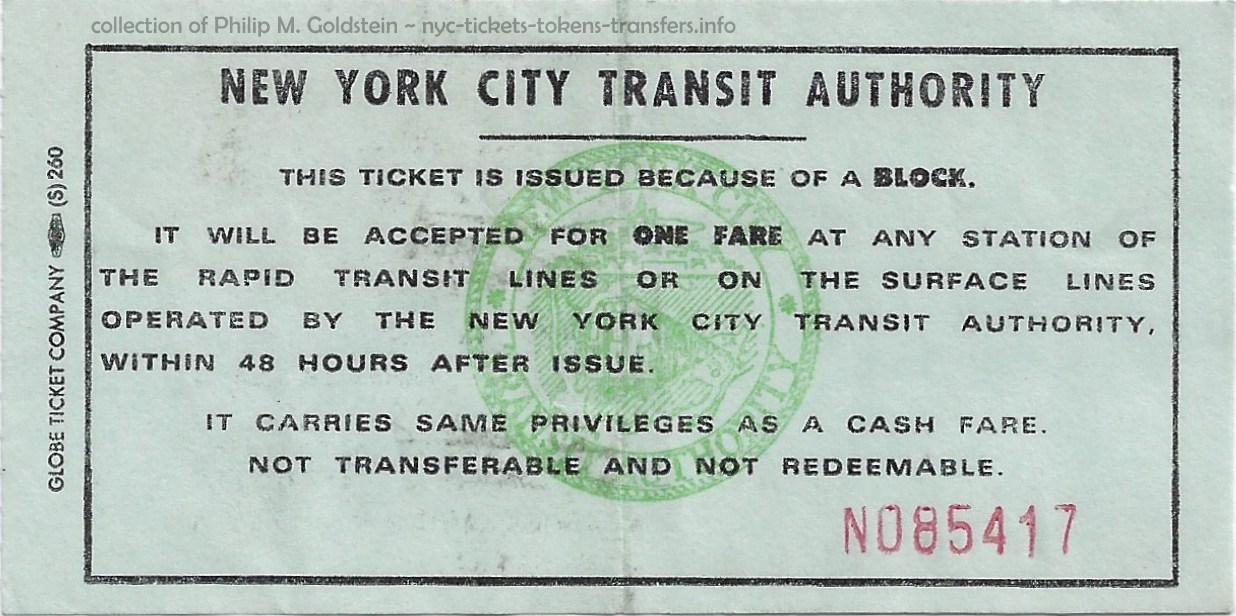 |
| L, N prefix (yellow) ca. 1970's - 1980's? Globe Ticket 3¹³⁄₁₆" x 2" |
N prefix (blue) ca. 1970's - 1980's? Globe Ticket.. 3¹³⁄₁₆" x 2" |
| . v |
|
 |
|
| A prefix (orange) ca. 1990's? without "subway service" 7" x 2" (without selvage) |
|
| Second Unification; 1994 to present ( |
|
 |
|
| 1994 - 2006 This Block Ticket lists the private bus companies: Command Bus, Green Bus Lines, Jamaica Buses, Queens Surface and Triboro Coach |
|
| . | |
 |
|
| 2006 and later: this Block Ticket does not list the private bus companies which have been absorbed in the NYCTA. s/n prefix A & C known 7¼" long and 2" |
|
(on pulp paper); rare - $10.00 to $12.50.
![]()
It appears the MTA has renamed the "Block Ticket" to "Courtesy Pass" in 2018.
| The MTA will soon be handing out new courtesy passes as a way to say sorry to passengers inconvenienced on their commute. The agency says the new initiative replaces the old system to include commuters with disabilities or strollers who have to deal with elevator breakdowns. Under previous rules, riders were only given block tickets when a mechanical issue forced them off a train. The new courtesy passes are valid for 48 hours and can be used for reentry into another train station or bus. The passes will be available starting tomorrow. BY SPECTRUM NEWS STAFF NEW YORK CITY - PUBLISHED 4:29 PM ET DEC. 08, 2018 |
Conditions appear to remain the same as before, to be used with 48 hours of issue on all subway stations and all local NYCTA, MABSTOA and MTA Bus Company buses.
As I do not have an example in my collection, I am willing to purchase one; please feel free to contact me.
 |
| ca. 2022 - present It appears the Block Ticket has been renamed. prefix A length 7¼" long and 2"? |
![]()
The use for this type of transfer is unknown. Information is needed.

November 1992
7⁷⁄₁₆" (including ⁵⁄₁₆" selvage) x 2"
.
![]()
General Order "G. O." Transfers
Daily General Order
This type of G. O. was previously undocumented until joining the PMG collection in May 2022. Whereas a "general" general order could be issued anywhere and applied to anywhere in the system, this version was issued daily, and for a specific transfer location. From my understanding, it allowed Coney Island bound passengers to transfer from the 7½" (including ⁵⁄₁₆" selvage) x 2" |
Monthly General Order
In contrast to Block Tickets in the above section of this page, of which are issued for unplanned temporary
interruptions of service and are only valid for 48 hours after punched; General Order Transfers are issued for
planned prolonged outages or rerouting due to
construction or reconstruction.
As such, G. O. Tickets are issued monthly, and are valid
until the end of that month; as all dates seen thus far are for the
last day that month.
1990's through 2010(?): solid beige, pink, green paper;
2010's: white paper with magenta, lavender, yellow stripes (possibly other
colors as well)
all appear to have unprinted backs.




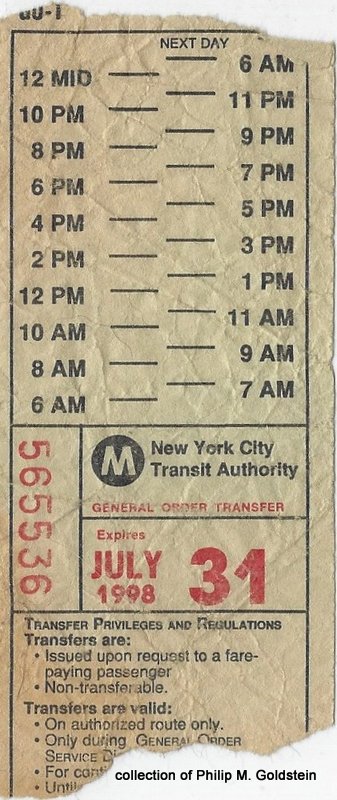

June 30, 1992
7½" (including ⁵⁄₁₆" selvage) x 2"September 30, 1992
7¹⁄₁₆" x 2"March 31, 1993
7⅝" x 2" March 31, 1996
note that despite the MTA logo being changed in 1994,
this ticket still bears the M logo above but the new ![]() logo below.
logo below.
7¹⁄₁₆" x 2"July 31, 1998
September 30, 1999
.






September 30, 2003
7" x 2"December 31, 2003
7" x 2"December 31, 2004
December 31, 2005
7⅛" x 2"December 31, 2007
7½" (including ⁹⁄₁₆" selvage) x 2"December 31, 2008
7½" (including ⁹⁄₁₆" selvage) x 2"
.

intentionally left blank
intentionally left blank
intentionally left blank
intentionally left blank
intentionally left blank
December 31, 2010
7⅛" x 2"
intentionally left blank



intentionally left blank
December 31, 2018
September 30, 2019
7" x 2"December 31, 2019
7" x 2"
.
.
![]()
With the opening of the 1939-1940 Worlds Fair in Flushing Meadows - Corona Park, the City of New York Board of Transportation constructed both a rapid transit spur to the Worlds Fair off the IND Queens Boulevard Line, and instituted a bus route to and from the Fairgrounds that was routed through Brooklyn & Queens.
To pay for the construction of the spur line as well as the bus service, the BoT charged a premium fare: 10 cents, when almost all other trolley lines and bus routes were only 5 cents.
Special turnstiles were installed at the Worlds Fair Terminal: for subway riders arriving at the Fair, an additional 5 cents was charged when exiting the Worlds Fair Station turnstiles. Those departing the Fair, paid 10 cents at the turnstiles to access the subway platforms. Images of these turnstiles and further information can be found on the Turnstile Chapter on the Introduction Page of this website.
5 cents was collected upon boarding an intersecting trolley line or bus route. Those wishing to transfer to the Worlds Fair bus route paid an additional 10 cents and received the "Worlds Fair Ten Cent Transfer" ticket seen below left, for a total fare of 15 cents.
However those boarding the Worlds Fair bus directly along it route, only paid 10 cents.
From the Worlds Fair
Upon leaving the Fair, passengers paid 10 cents to board the Worlds Fair bus, and upon request, specially marked transfers were issued to connect to other surface transportation (trolley lines & bus routes) as well as on intersecting trolley line and bus routes. There was not additional charge for the transfer. Applicable transfer points to / from the Worlds Fare bus were:
| Trolley Lines | Bus Routes | ||||||
| 2 24 50B 41 58 47 25 |
Bergen Street Broadway Bushwick Avenue Flatbush Avenue Flushing-Ridgewood Franklin Avenue Fulton Street |
27 48 53 69 44 49 11 |
Jamaica Avenue Lorimer Street Metropolitan Avenue McDonald-Vanderbilt Nostrand Avenue Ocean Avenue Ralph Avenue |
10 55 5 7 71 46 14 |
Ralph-Rockaway Richmond Hill St. Johns Place Tompkins Avenue Union St Utica-Reid Wilson Avenue |
B-7 B-12 B-13 B-14 B-17 B-18 B-20 |
Kings Highway East New York Crescent Street Pitkin Avenue Remsen Avenue Wyckoff Avenue Decatur Street |
These transfers were used from April 30, 1939 through October 27, 1940.
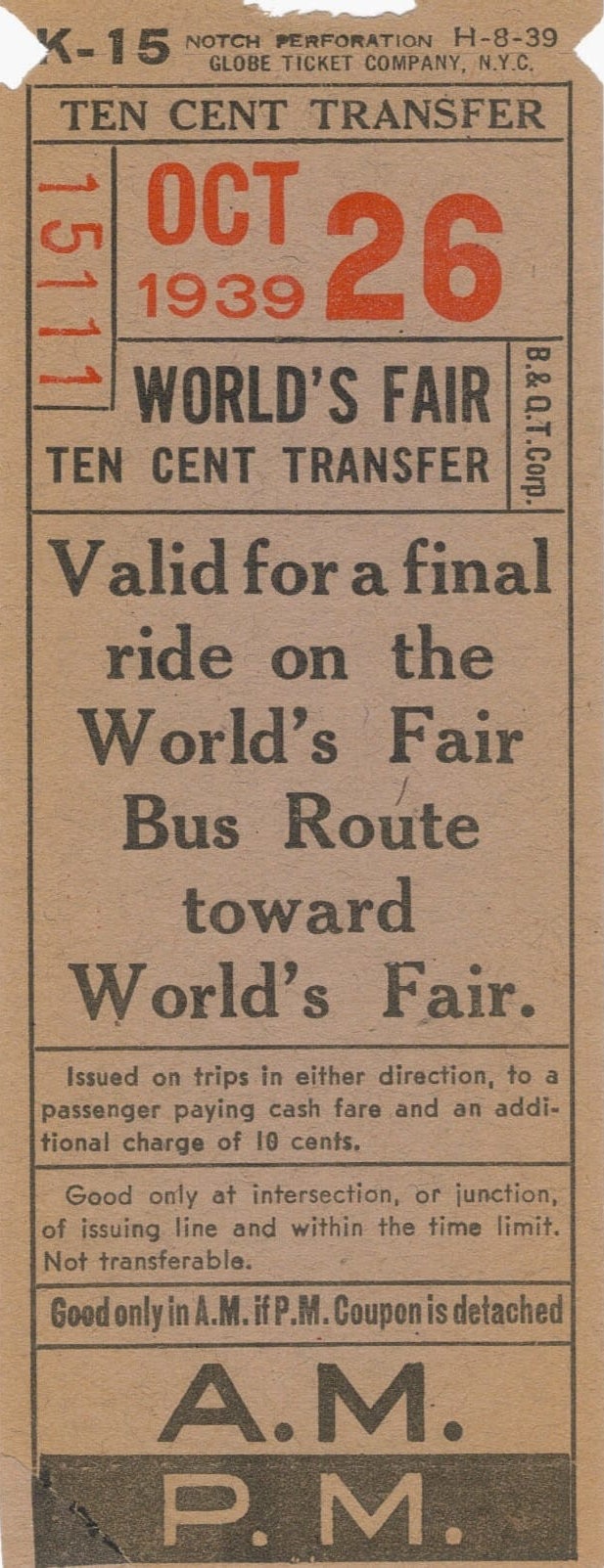 |
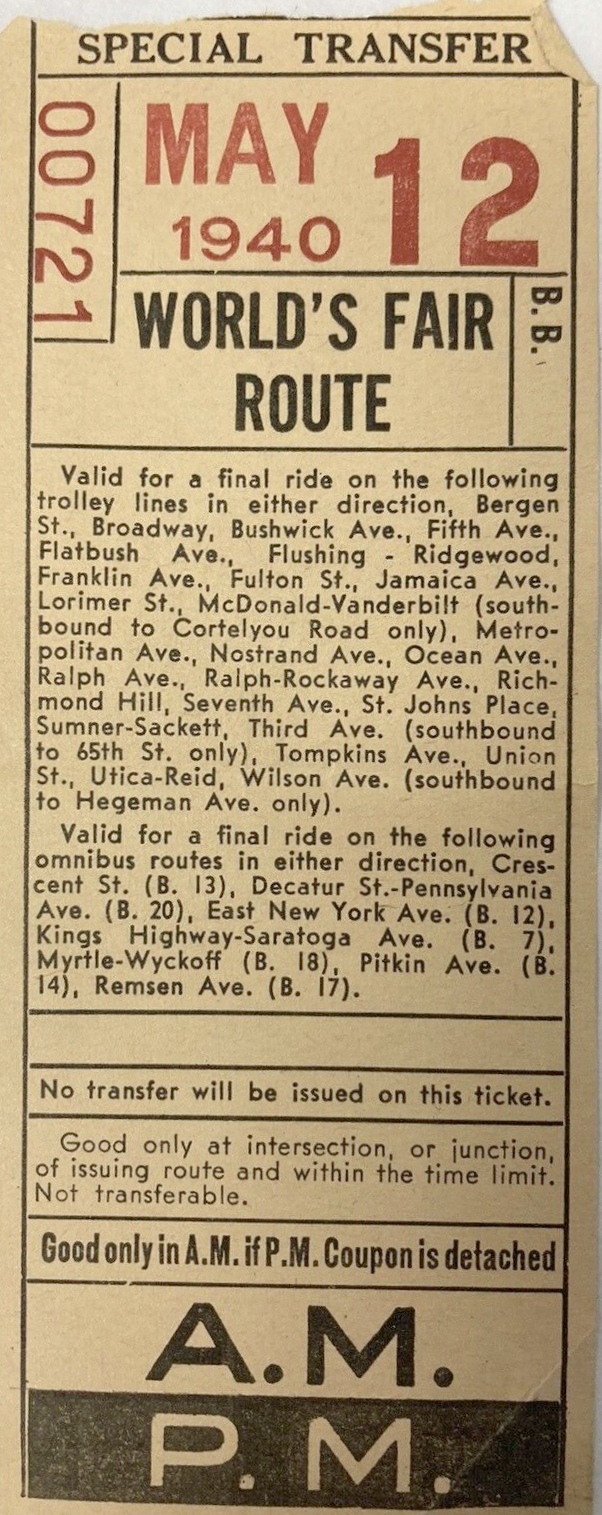 |
Note in the description how the points of connection are listed:
◄ trolley lines ◄ omnibus routes It was this ticket that led me to learn how the transit agencies denoted between "lines" and "routes". |
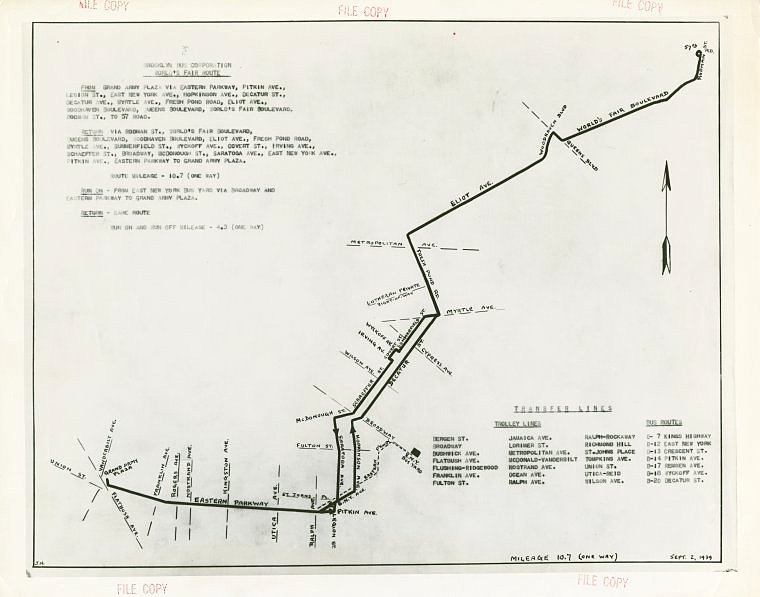 |
| K-15 (buff) H-8-39 Ten Cent Transfer World's Fair Brooklyn & Queens Transit |
(buff) May 12, 1940 Special Transfer World's Fair Route Brooklyn Bus Corp |
Map of Worlds Fare Bus Route north / eastbound: Grand Army Plaza - Eastern Parkway - Pitkin Avenue - Legion Street - East New York Avenue - Hopkinson Avenue - Decatur Street - Myrtle Avenue - Fresh Pond Road - Eliot Avenue - Woodhaven Boulevard - Queens Boulevard - World's Fair Boulevard south / westbound: |
|
| This issue was purchased on intersecting lines to allow transfer onto the World's Fair Bus Route, hence the ten cent fare. | This issue was received upon request when boarding the World's Fair Bus Route (where one already paid the 10 cents), allowing free transfer to intersecting lines and routes. | ||
| Perhaps
one of the rarest and more desirable of the known transfers. The
'39-'40 World's Fair holds a lot of fond memories for quite a few
people. Since it took place beforeWW2 and before a lot of people could
afford a private automobile much less a second-hand one. I'd say a fair price for an example of this would be in $10 to $15 dollar range. |
|||
.
.
![]()
Culture Bus I - Midtown Manhattan & Harlem
The Culture Bus Loop I (M-41 Route in Manhattan) and Culture Bus Loop II (B-88 in Brooklyn) operated from May 26, 1973 through September 3, 1984 and on weekends and holidays only. The Culture Bus Loop III (Bx-56 in the Bronx) operated briefly from August 3, 1974 through September 2, 1974, and a Staten Island Culture Bus Loop operated sometime between 1974 through 1977.
The Culture Bus Loops allowed a passenger to disembark and visit museums and places of interest along the route, then reboard a later bus to continue their journey to their next destination pretty much door to door. This allowed passengers greater flexibility than having to walk several blocks to a subway station, make a transfer to adjoining line, et al; then walk back to their next destination..
The following two sided five panel brochure, explains in detail how and when the Culture Bus Loop I and Culture Bus Loop II operated, their routes and the places of interest on each route.
As an added bonus, it also explains the other discounted special services such as the Sunday Half Fare, Add-A-Ride, Shoppers Special, and Nightcoach programs (as shown on this particular page and on others in this website); so without a doubt this brochure was worthy of display.
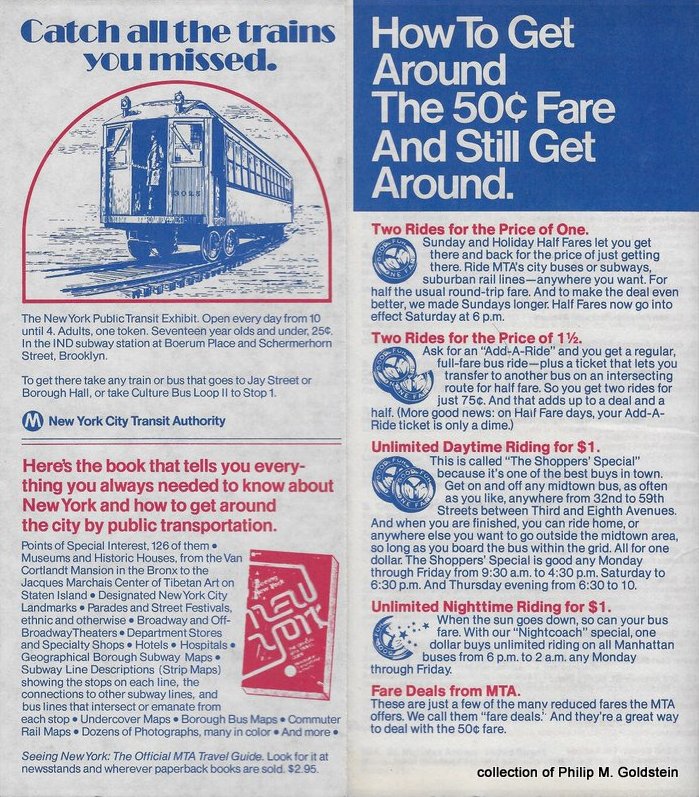 |
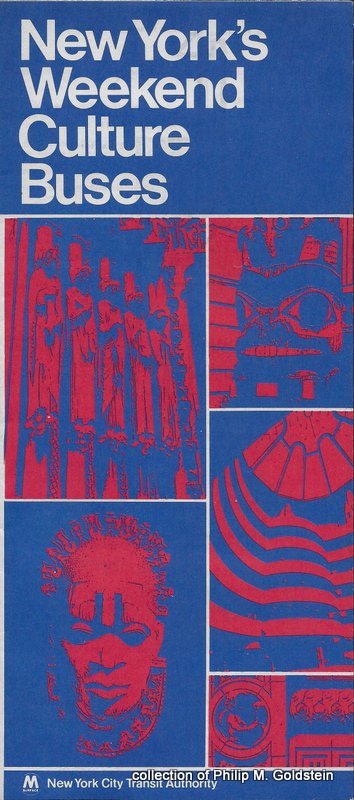 |
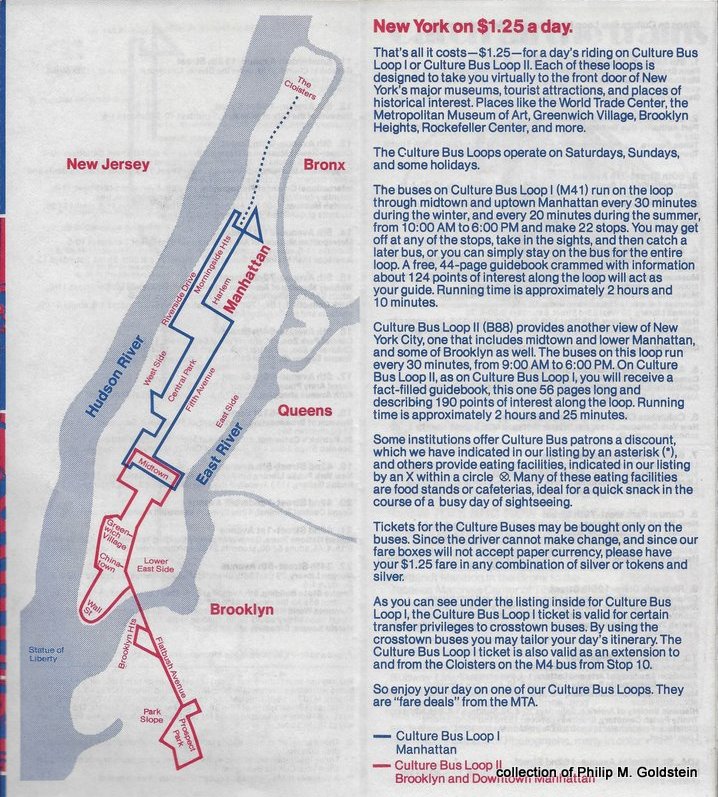 |
||
| above: back cover | above: front cover | |||
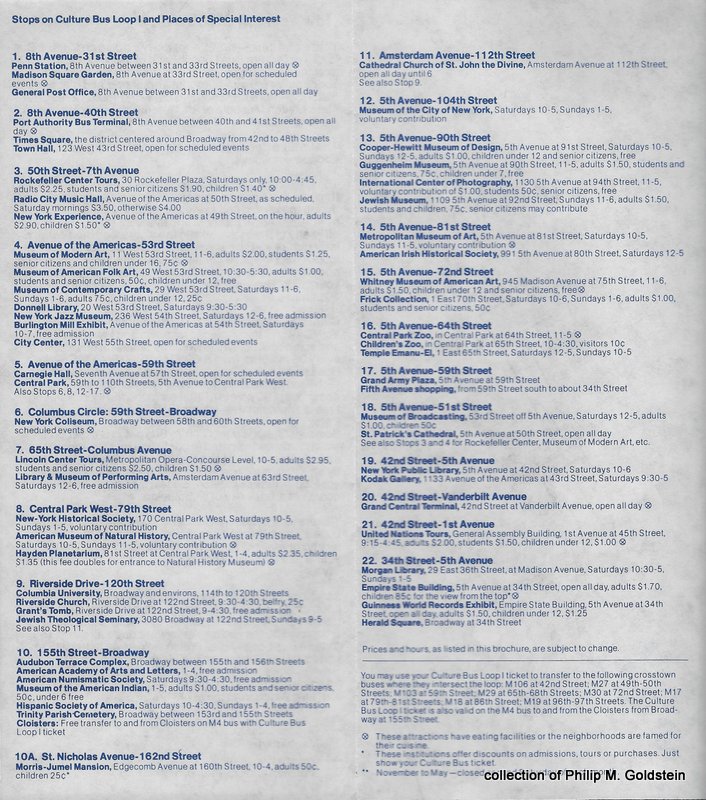 |
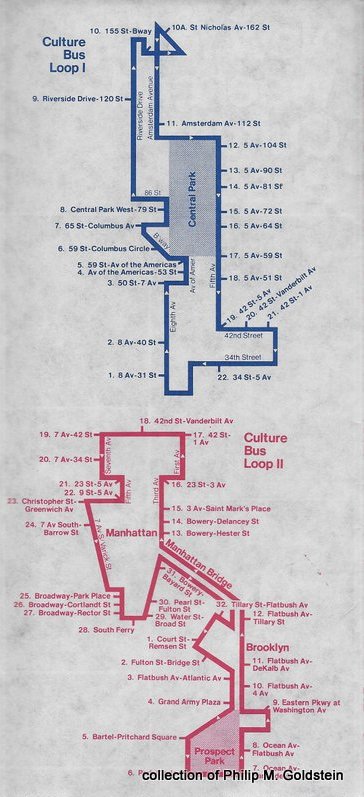 |
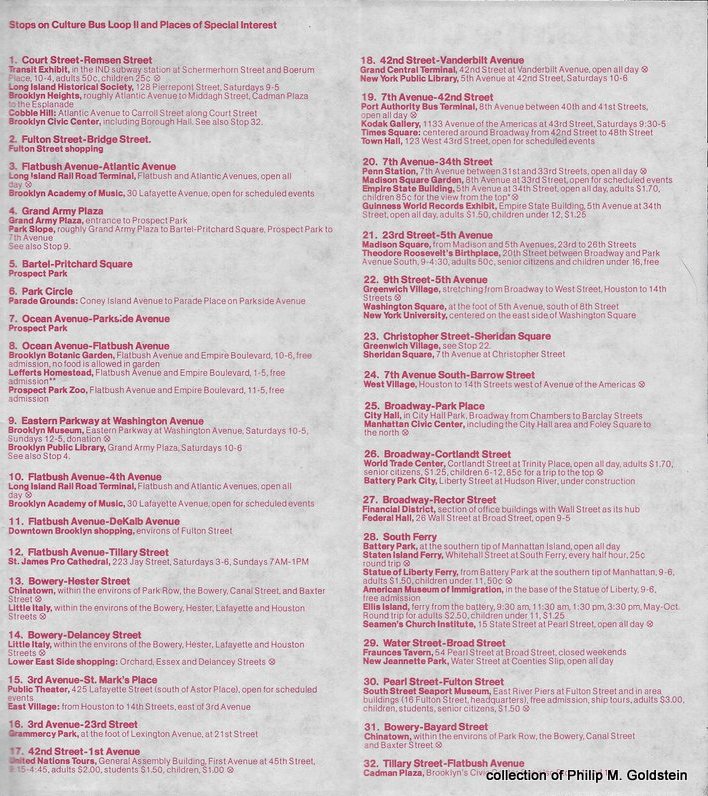 |
||
| 5 panels; 20" x 9 1/8"; undated (but mention of 50 cent fare usage has this brochure fall into the September 2, 1975 - June 27, 1980 date range). | ||||
The Culture Bus Loop I ran in Manhattan, and for the price of $1.00 a Culture Bus ticket was issued to the passenger. This Culture Bus gave the passenger access to dozens of New York City's Museums and Tourist Attractions as listed in the above brochure.
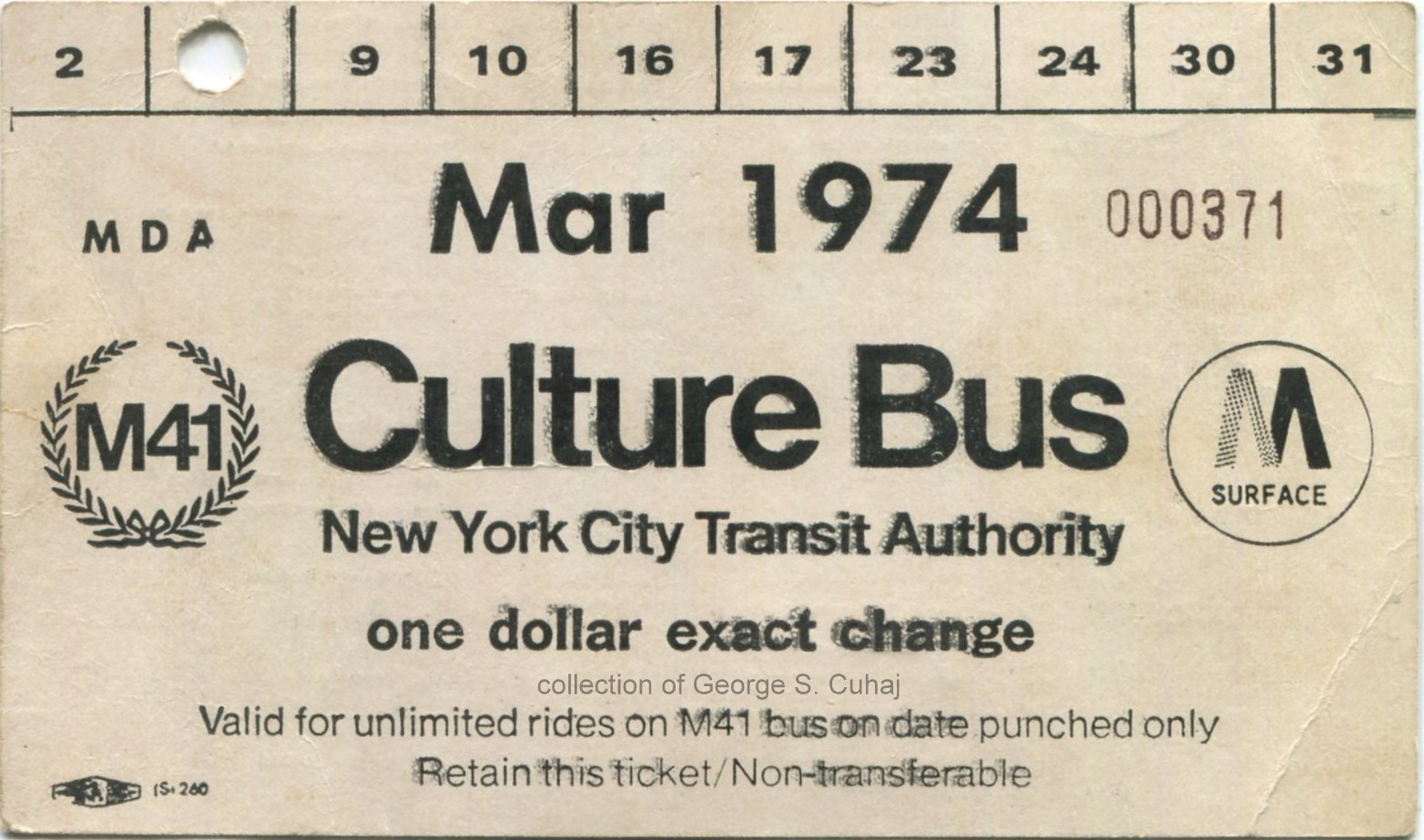 |
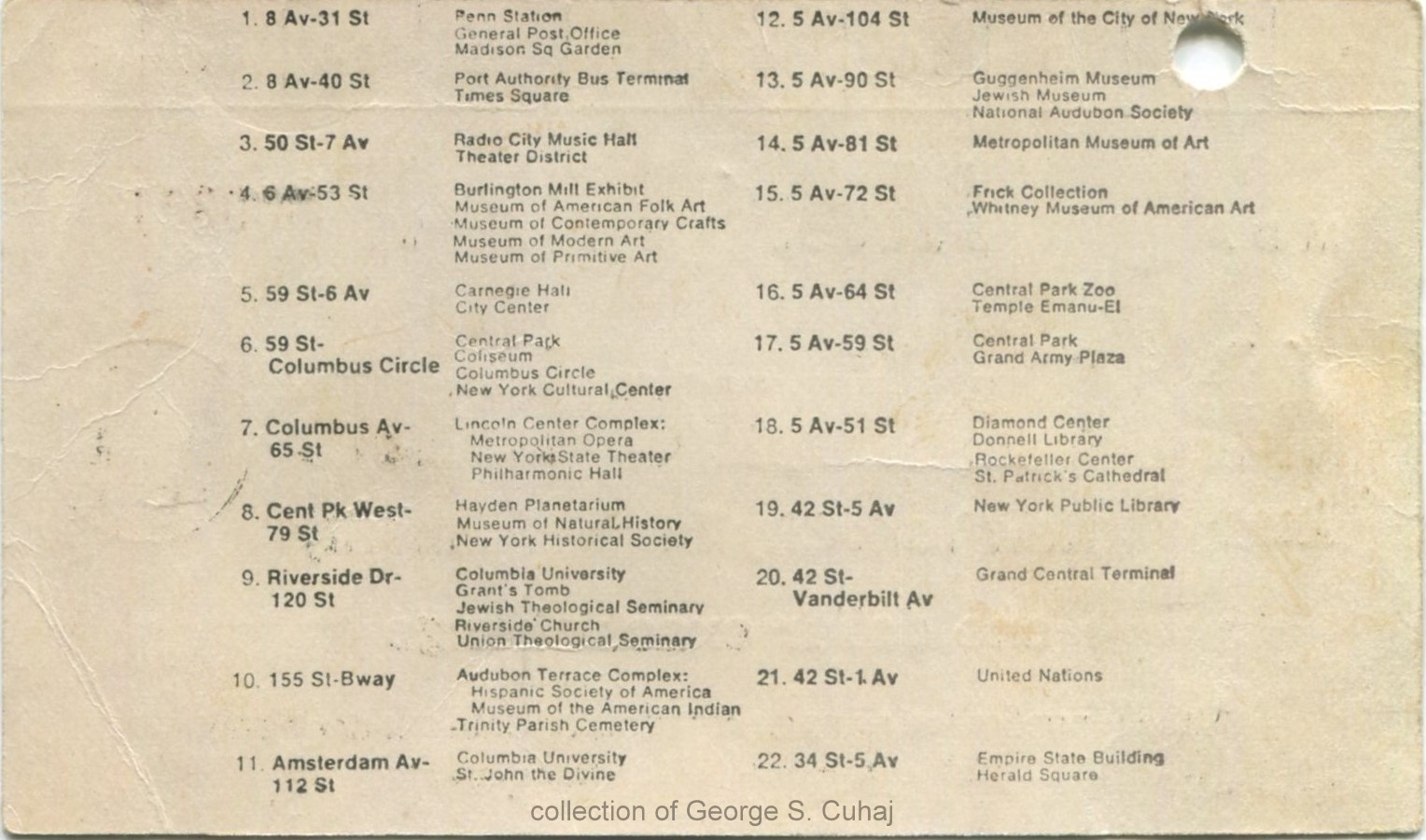 |
| March 1974 - MDA one dollar exact change 5" x 3⅛" |
|
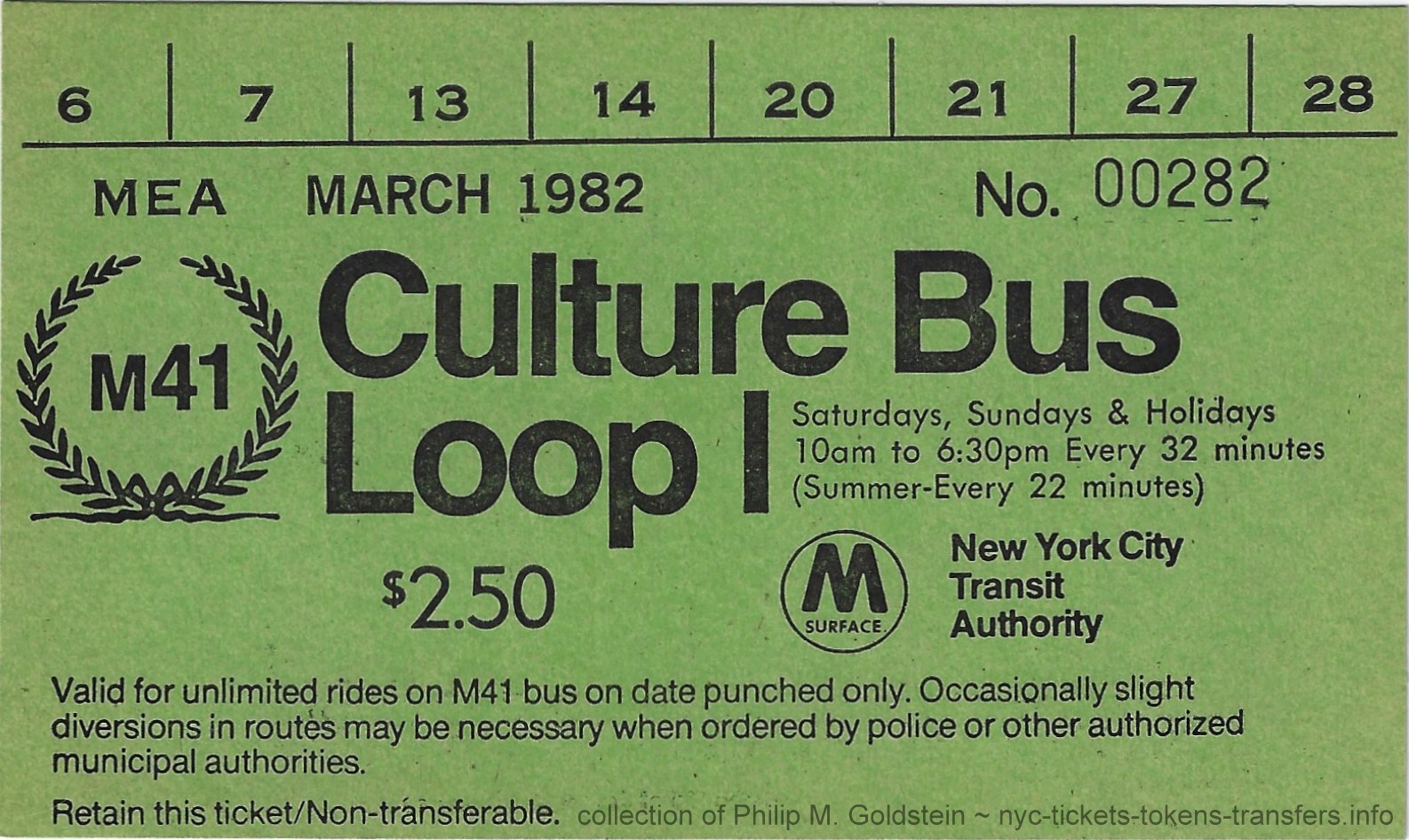 |
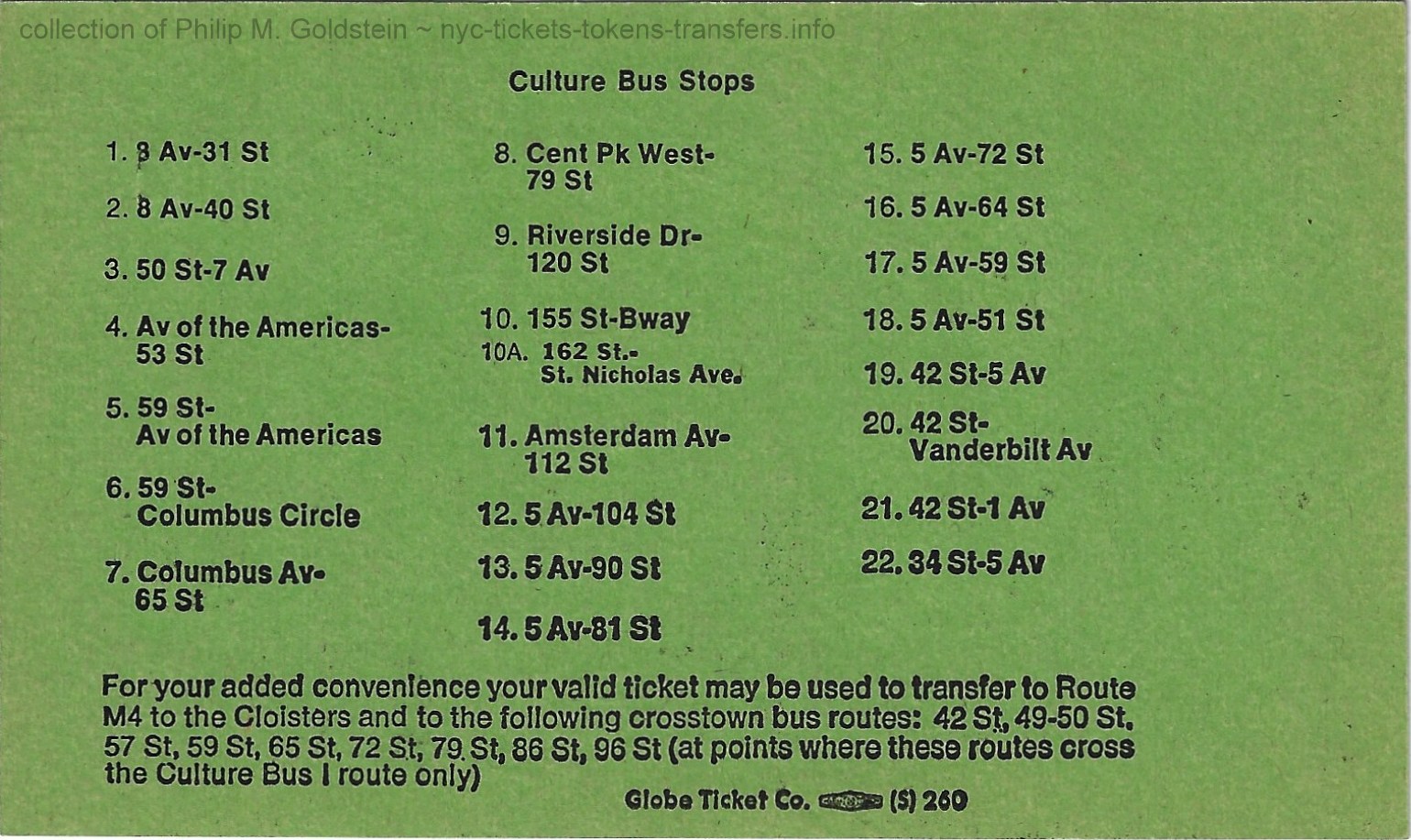 |
| March 1982 - MEA "Culture Bus Loop I" $2.50 5" x 3" |
|
Culture Bus tickets were also sold at subway token booths located at: Grand Central Terminal, Penn Station, Port Authority Bus Terminal, Times Square, Rockefeller Center and Columbus Circle stations during the hours of operation of the Culture Bus.
We know on June 28, 1980 the price of a Culture Bus ticket rose from $1.25 to $1.75.
Culture Bus II - Brooklyn & Midtown Manhattan
There was also a Culture Bus that operated in Brooklyn. This was known as "Culture Bus II" and ran the route of the B88:
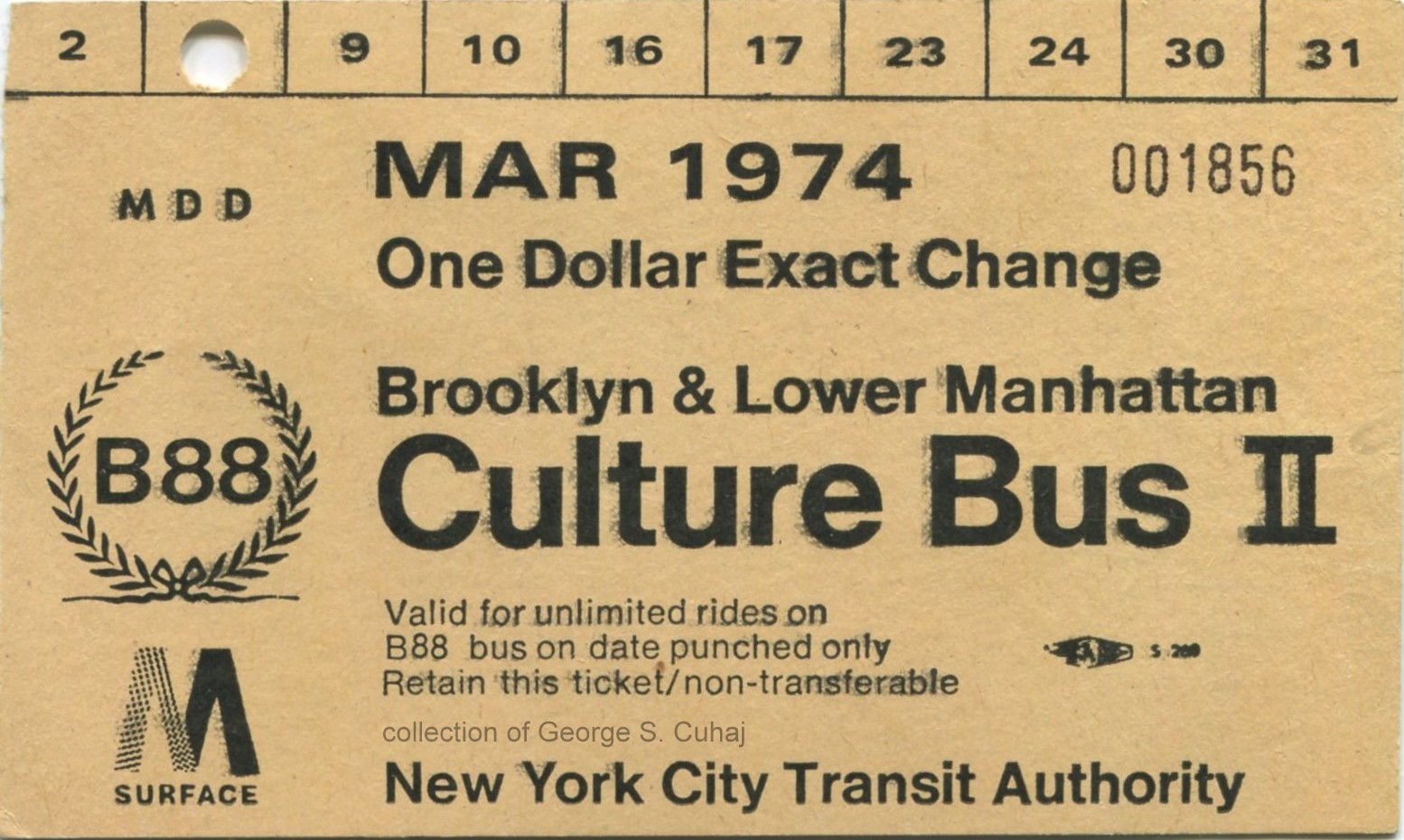 |
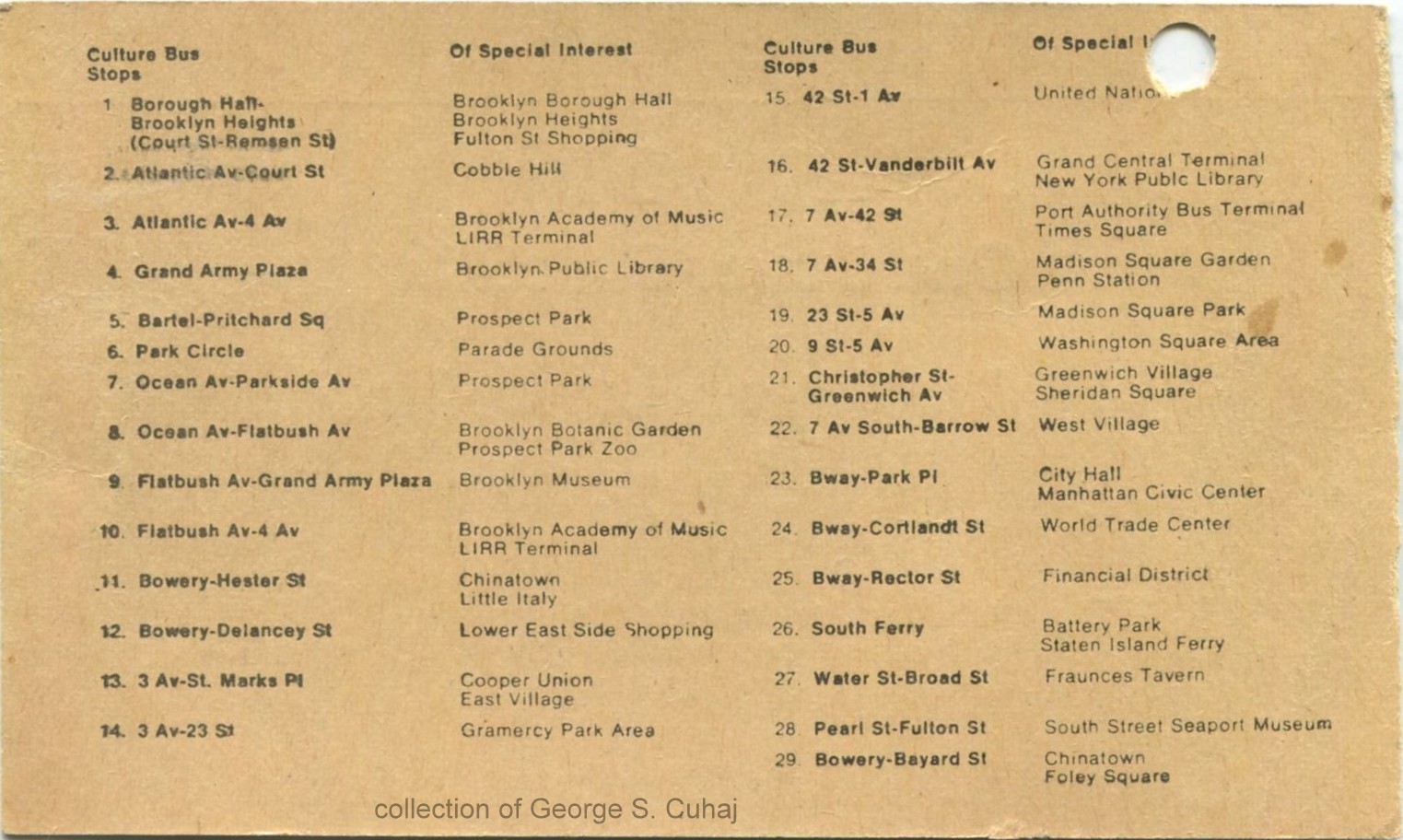 |
| March 1974 - MDD One Dollar Exact Change |
|
| . . |
|
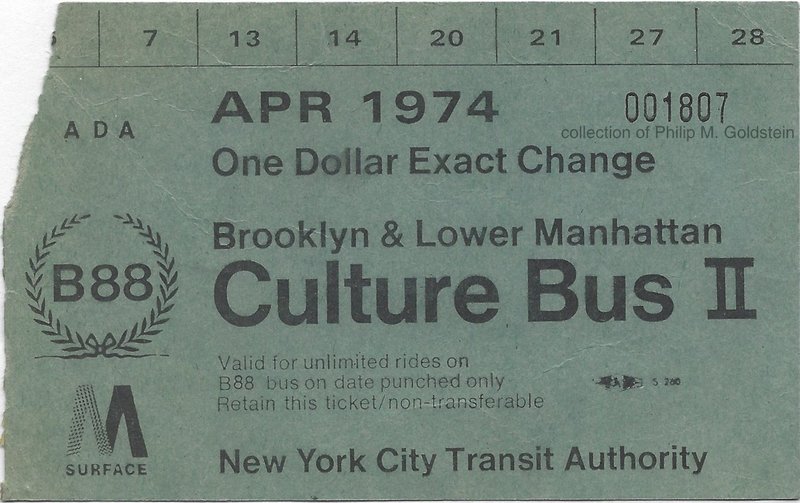 |
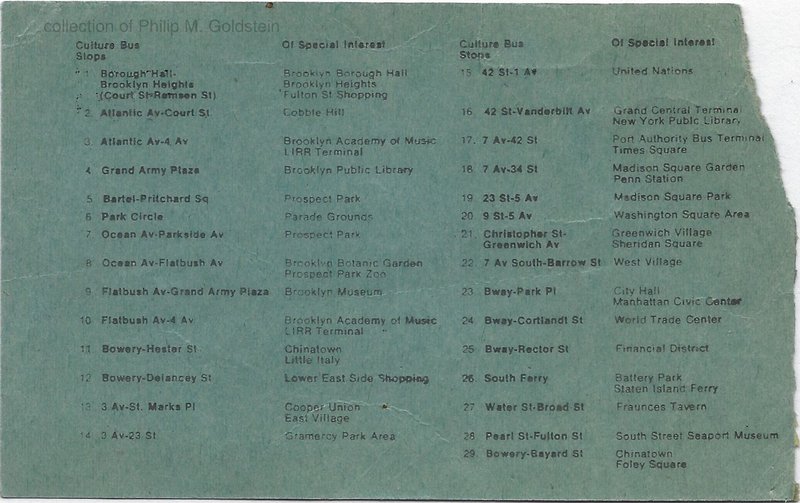 |
| April 1974 - ADA One Dollar Exact Change 5" x 3" |
|
| . .. |
|
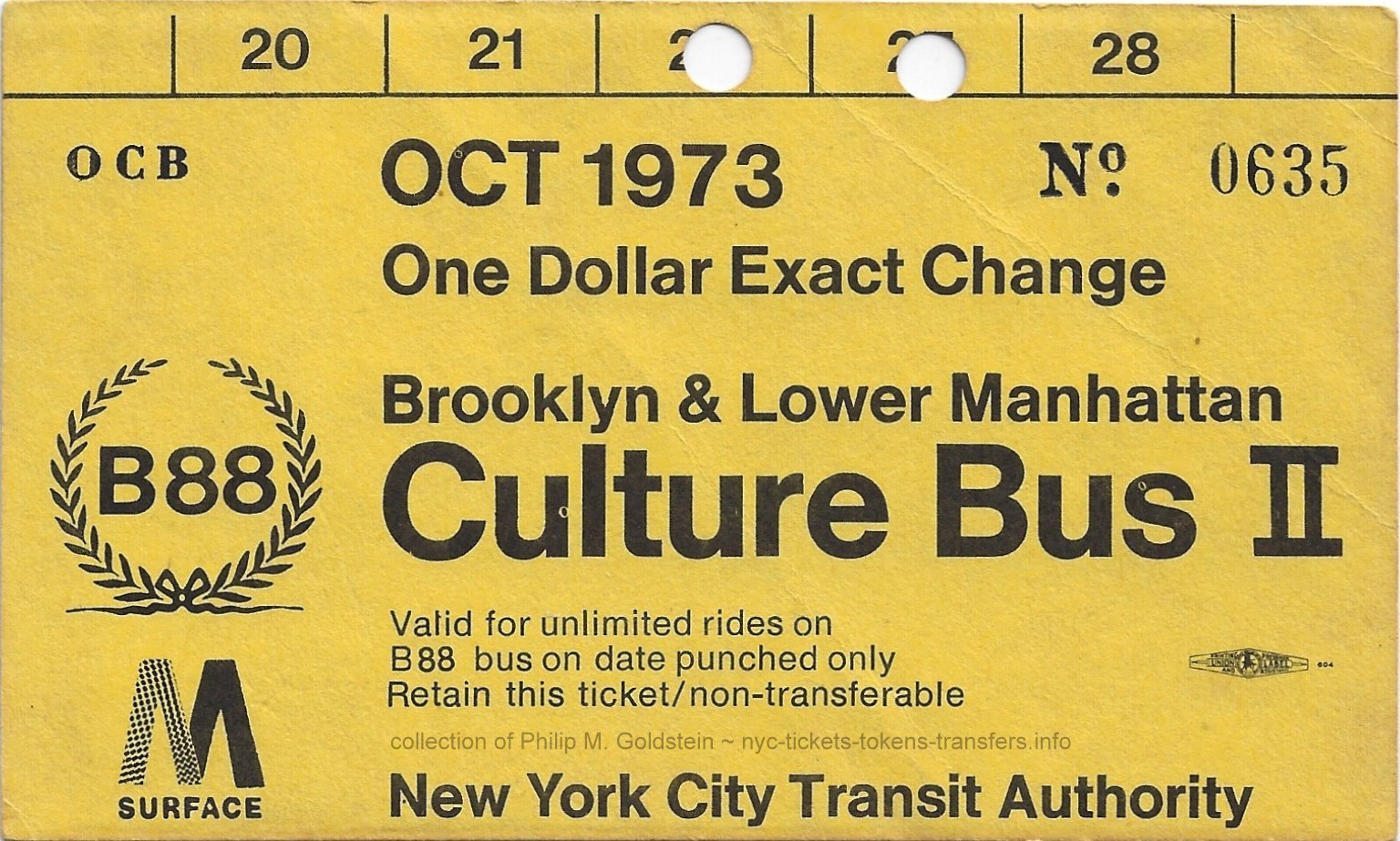 |
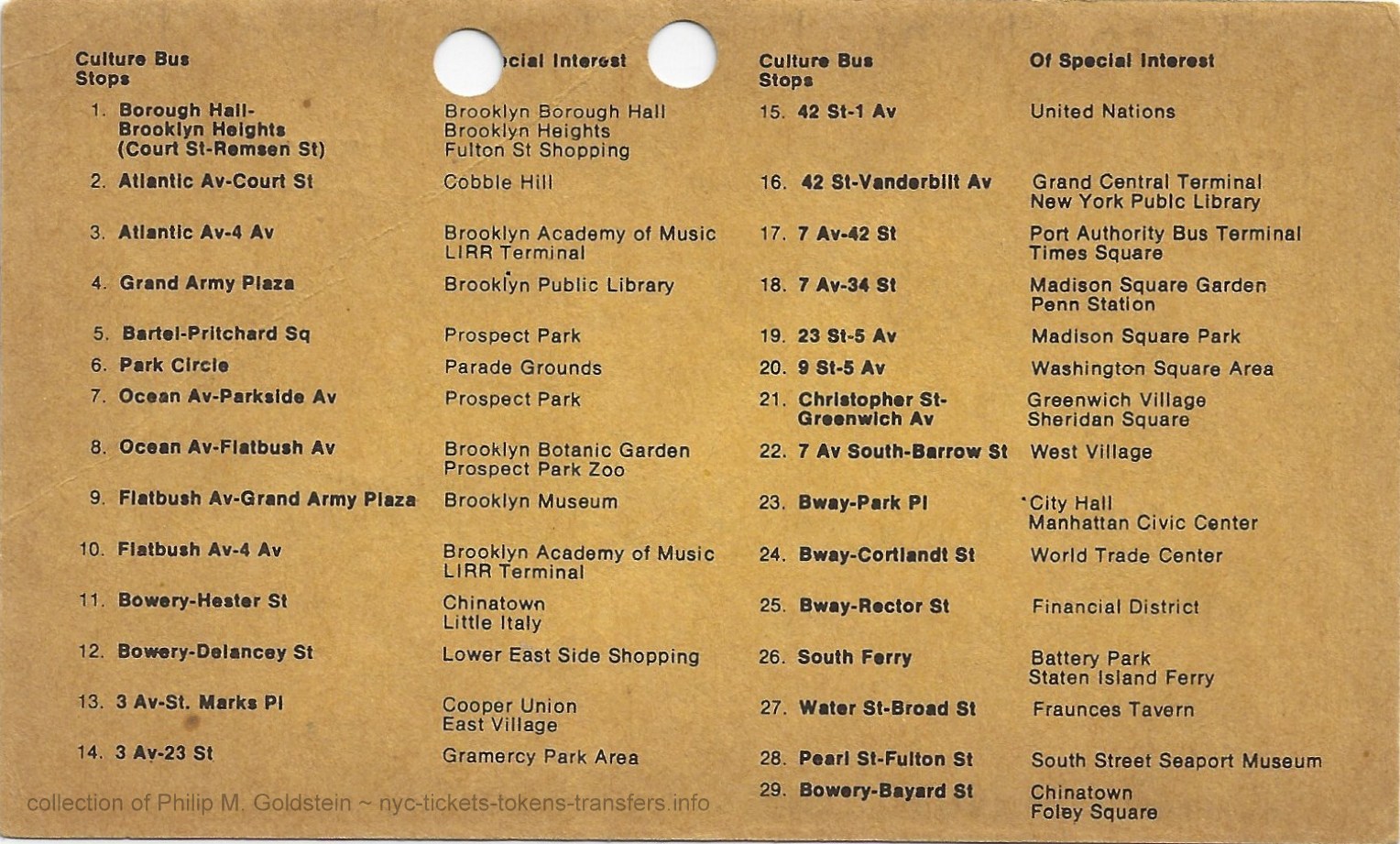 |
| April 1974 - OCB One Dollar Exact Change 5" x 3" (two tone cardstock) |
|
| . . |
|
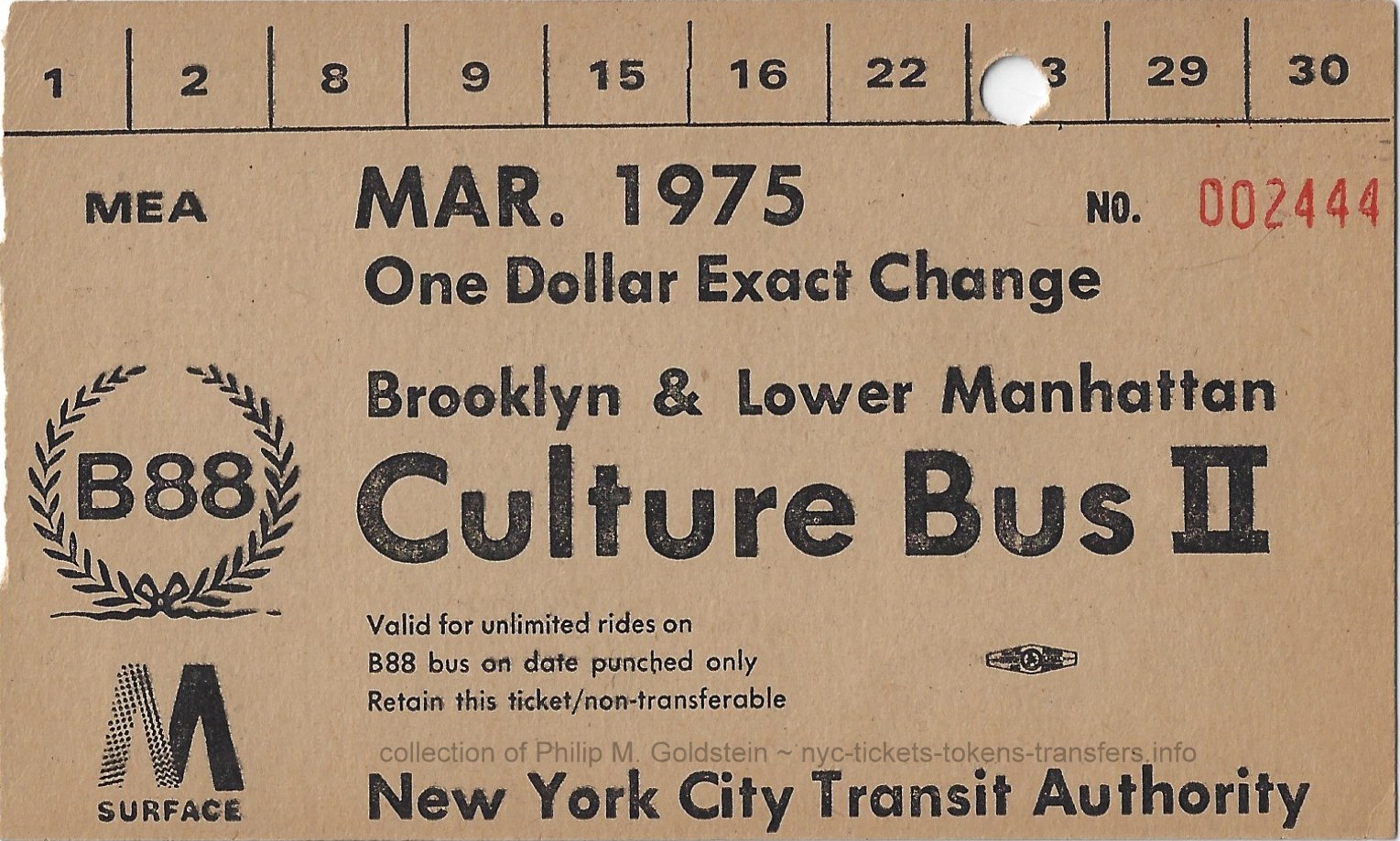 |
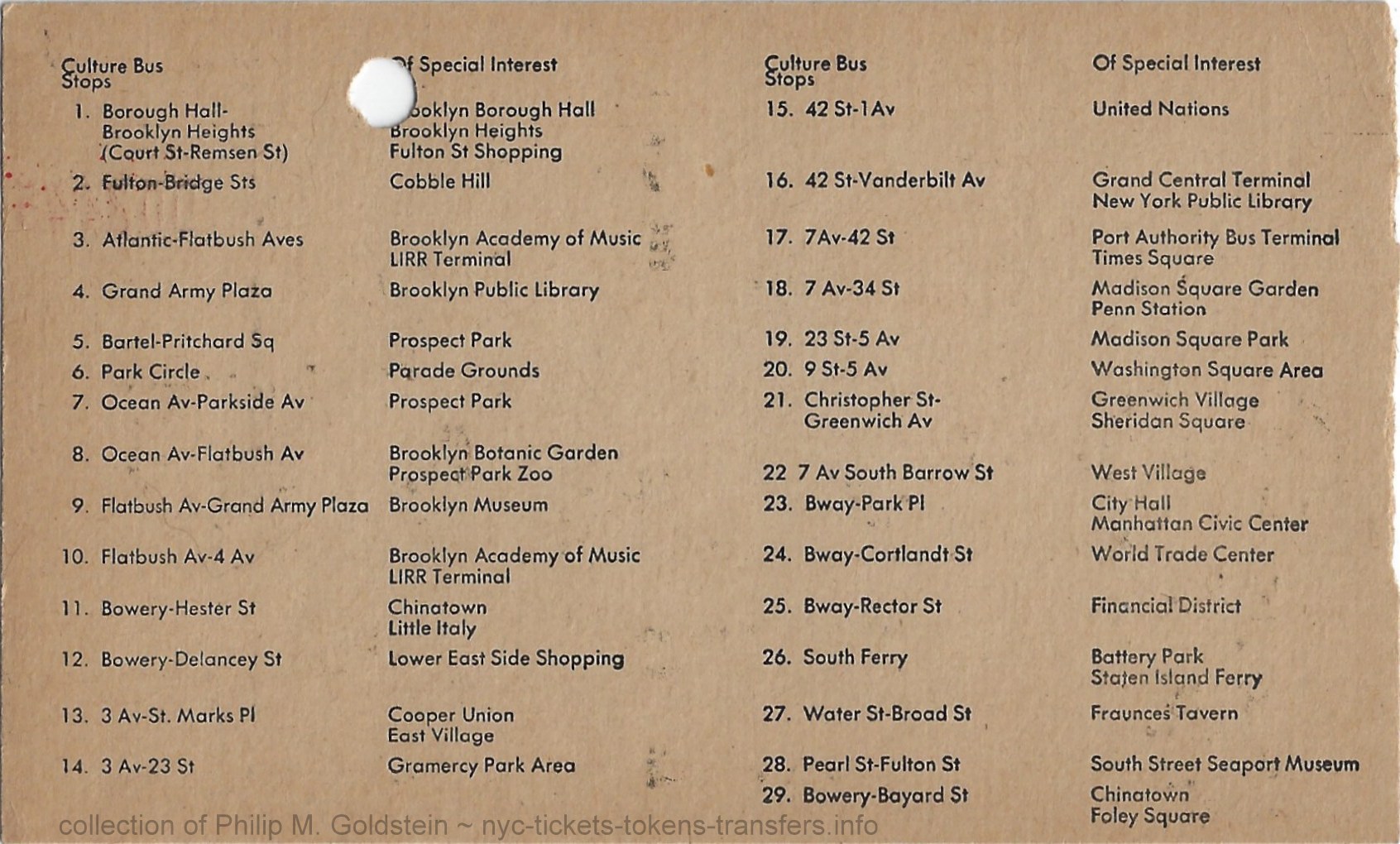 |
| March 1975 - MEA One Dollar Exact Change 5" x 3" Culture Bus & Culture Bus II tickets; $15.00 to $20.00 in good condition. Due to the short existence of the Culture Bus III, tickets are worth substantially more: $25.00 - 35.00 |
|
The fares on Culture Buses I and II and Staten Island Culture Bus rose from $1.00 to $1.25 on September 1, 1975. On June 28, 1980 the price of a Culture Bus ticket rose from $1.25 to $1.75.
Culture Bus III - Harlem, Manhattan & Bronx
There was a third culture bus route, the Culture Bus III.
The Culture Bus III route was located in north Manhattan and the Bronx. However, this route was extremely short lived, and only operated from August 3, 1974 (some sources erroneously cite Memorial Day weekend - but the NY Times article at right states otherwise) through September 2, 1974 - Labor Day; at which time this special route was discontinued, and never reinstated.
This loop route was designated the Bx56.
To date, tickets for this route remain undocumented.
.
Staten Island Culture Bus
The Staten Island Culture Bus route started at the Staten Island Ferry Terminal, Ramp F in St. George, and stopped at the Staten Island Museum, Snug Harbor Cultural Center, Jacques Marchais Center for Tibetian Art, and Richmondtown Restoration and back to the Ferry Terminal, where one could visit the Staten Island Ferry Maritime Museum at either the beginning or end of the bus loop.
It is not believed the Staten Island Culture Bus received a route number designation like the other Culture Bus routes.
Fare was $1.25, operating on Saturdays and Sundays, Summer and Fall; however the year is not noted. Abraham Beame is listed as Mayor on the pamphlet, and his single term administration was January 1, 1974 through December 31, 1977 which helps date the pamphlet to some degree.
As with the Bronx Culture Bus III, tickets remain undocumented.
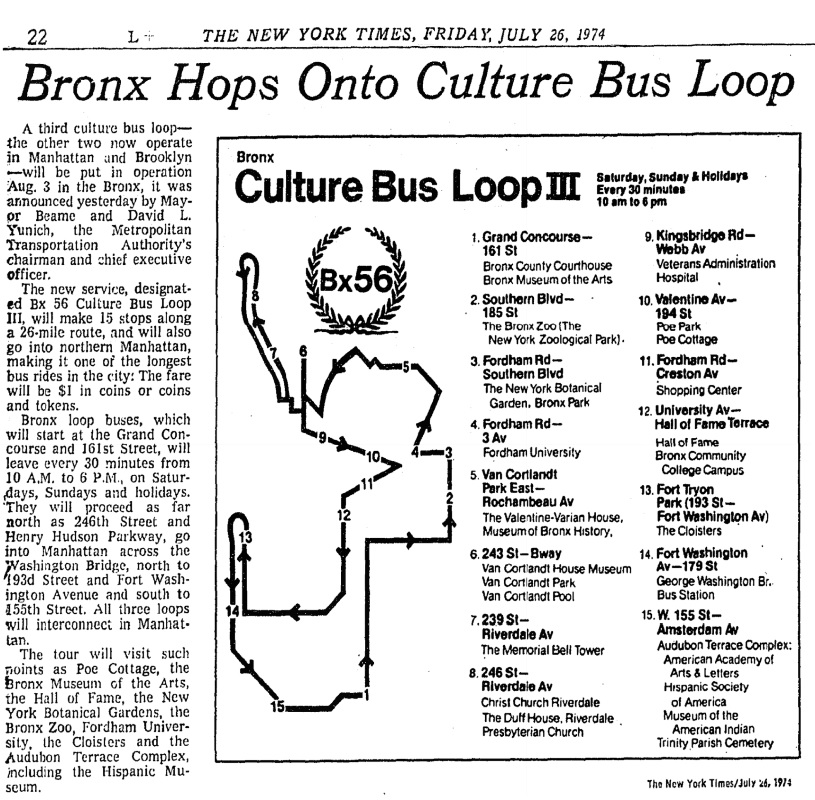
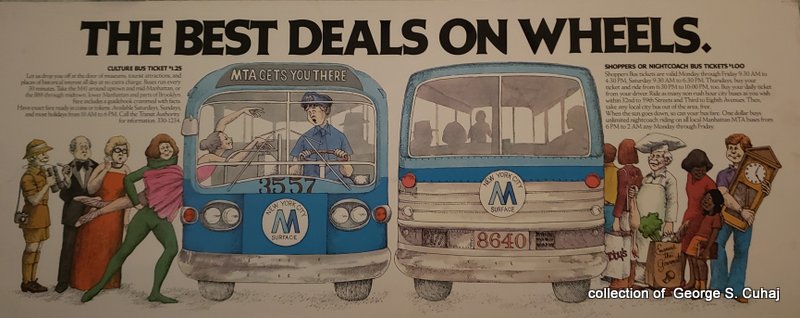
.
.
![]()
In an attempt to drum up business during the midday, when bus occupancy is at its least, the NYCTA advertised for and ran "Shoppers Buses." This was a bus that ran a fixed route throughout the Manhattan Shopping District. With the purchase of a ticket, the passenger could get on or off the bus on that route however many times they chose, to do their shopping in an endless number of stores.
Shoppers Buses rose from 75 cents to $1.00 on September 1, 1975
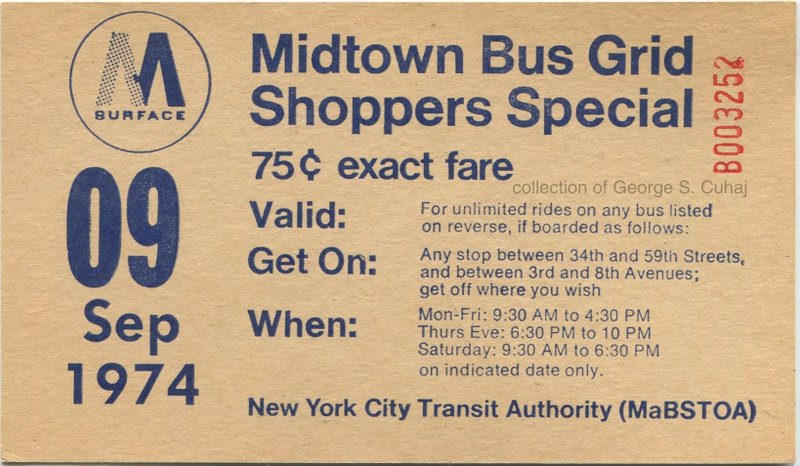 |
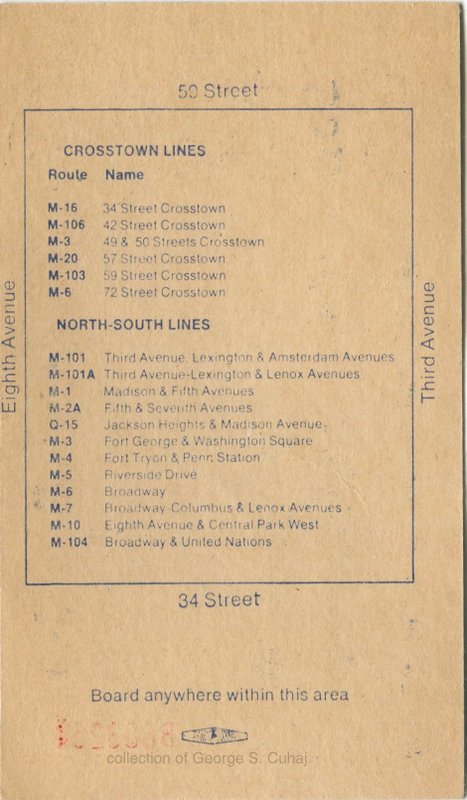 |
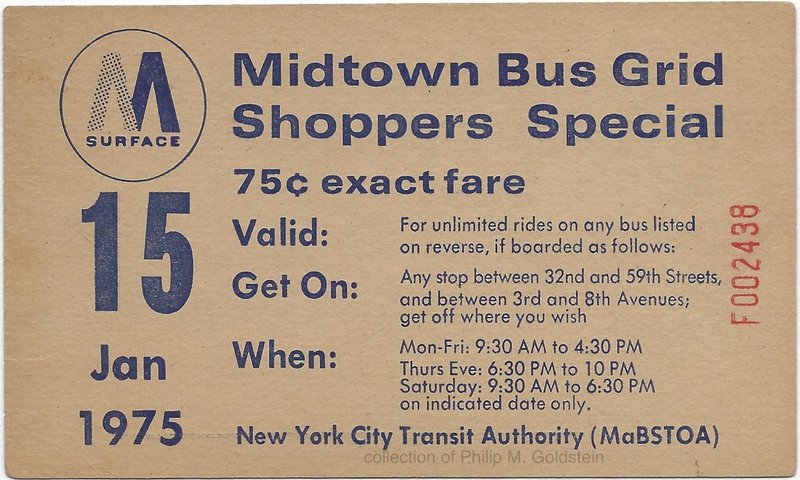 |
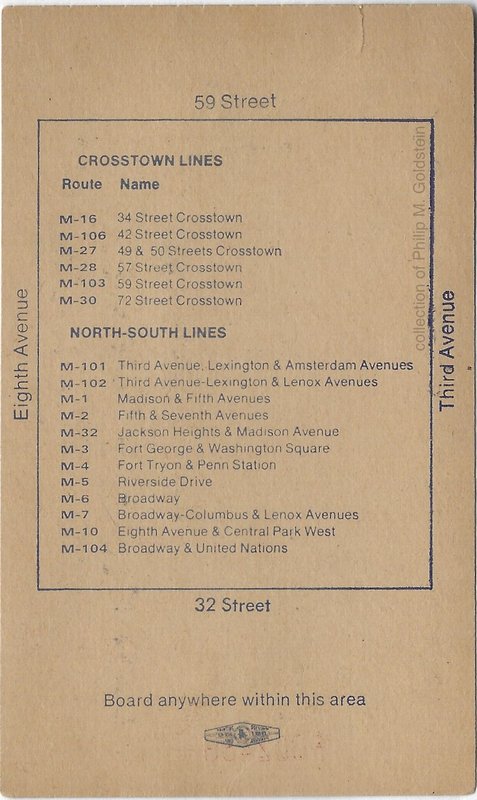 |
| 5¹⁄₁₆" x 3⅛" Shoppers Special Tickets (on cardstock); $15.00 to $20.00 in good condition. |
|
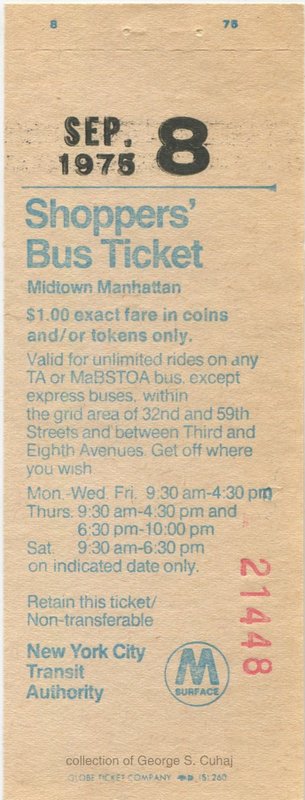 |
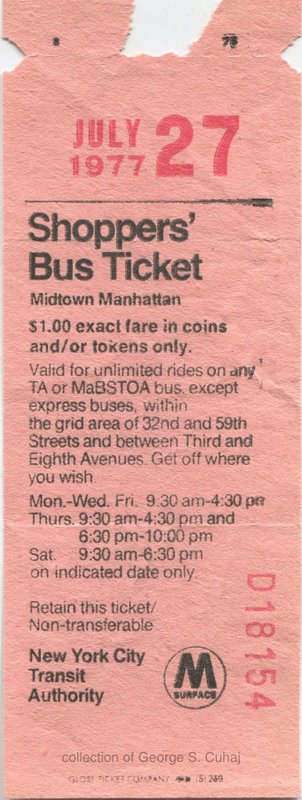 |
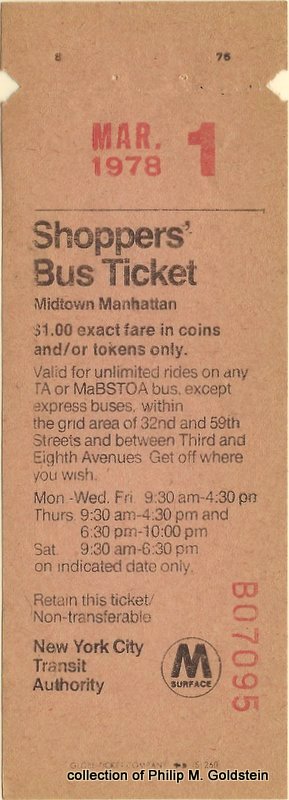 |
| 2" x 5¹³⁄₁₆ (including ⅝" selvage) |
Shoppers Special Tickets (on pulp paper); $8.00 to $10.00 in good condition.
Complete books are known.
.
.
![]()
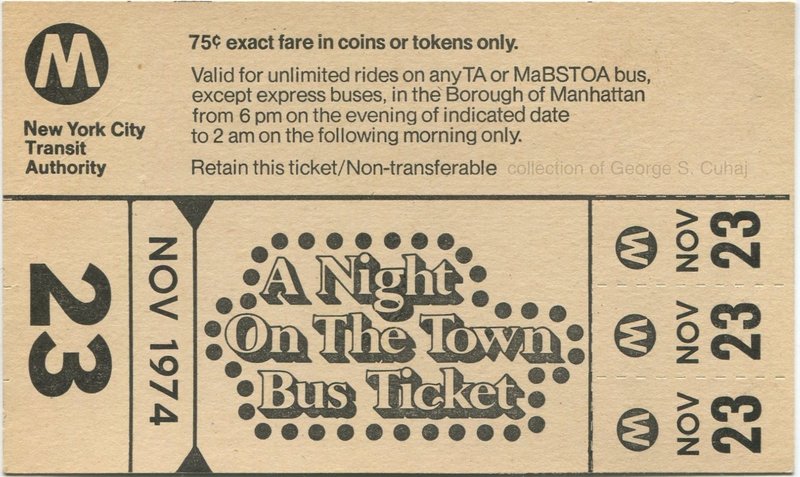 |
|
| buff cardstock A Night on the Town Bus Ticket (on cardstock); $12.00 to $15.00 in good condition. |
|
| . . |
|
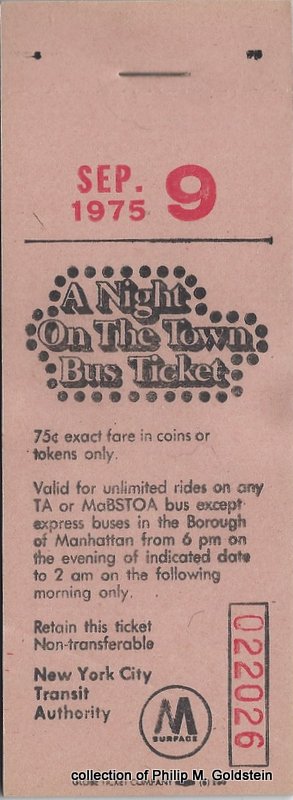 |
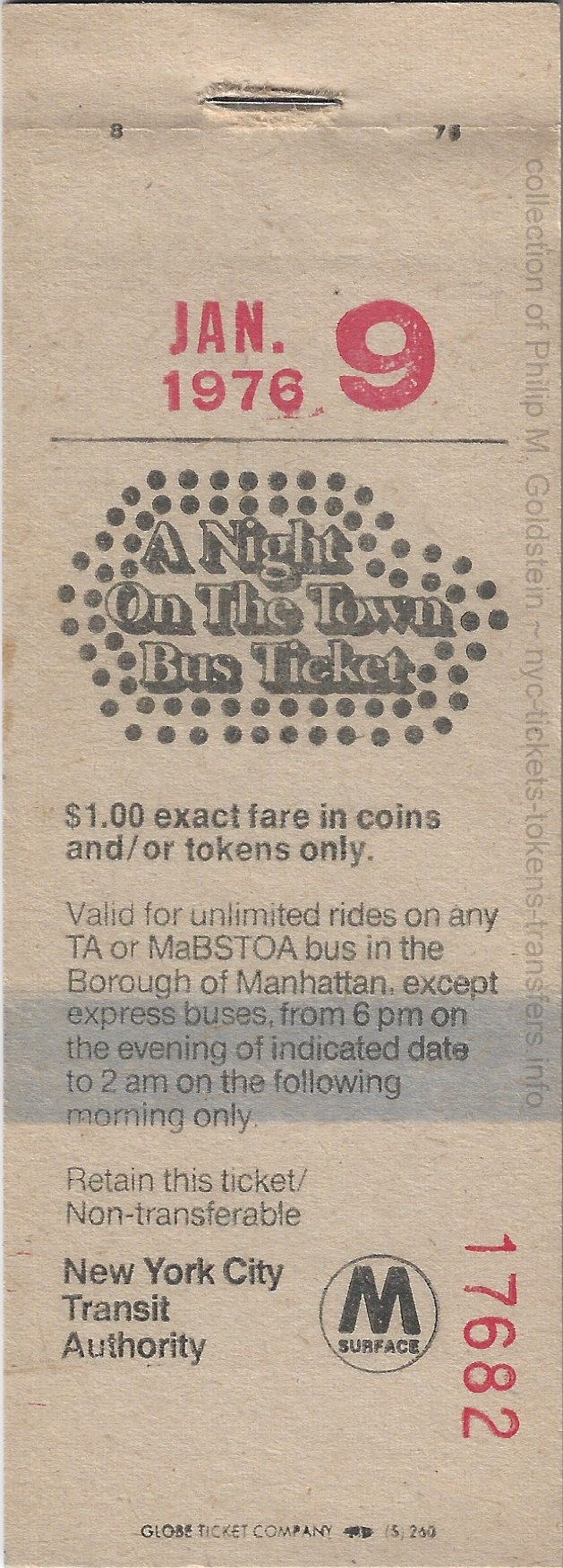 |
| pink pulp paper (5-75) Globe Ticket 2¹⁄₁₆" x 5⅝" with ⅝" selvage |
natural pulp paper with blue stripe (8-76) Globe Ticket 2¹⁄₁₆" x 5¾" with ⁷⁄₁₆" selvage |
complete books $8.00 to $10.00 in good condition.
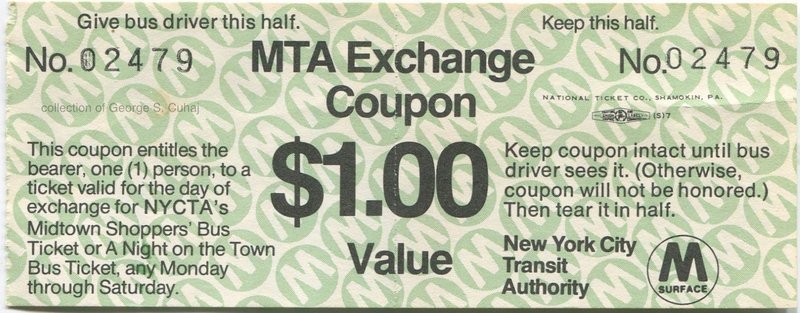 |
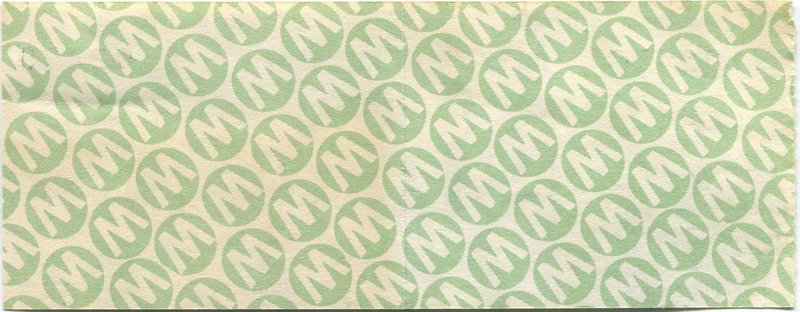 |
| Midtown Shoppers or Night on the Town Exchange Coupon | |
| . | |
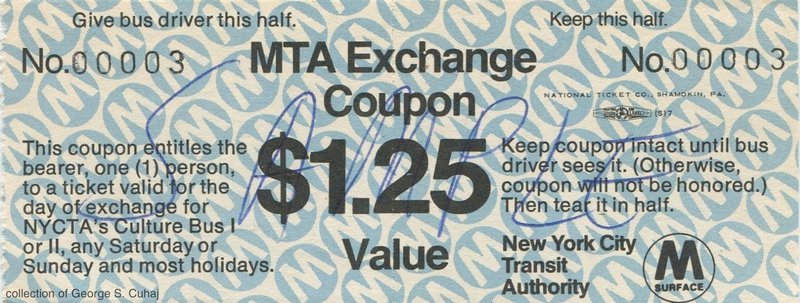 |
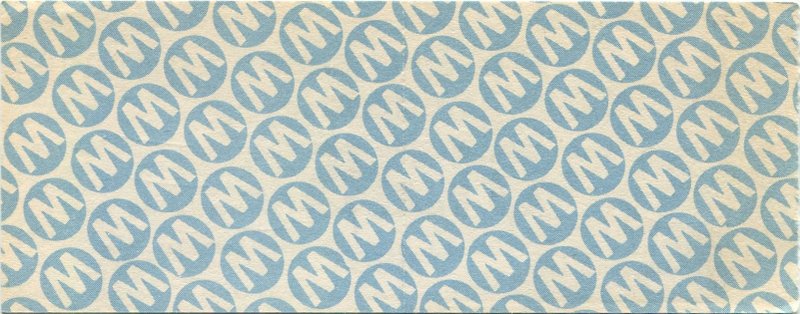 |
| Culture Bus I or Culture Bus II Exchange Coupon | |
![]()
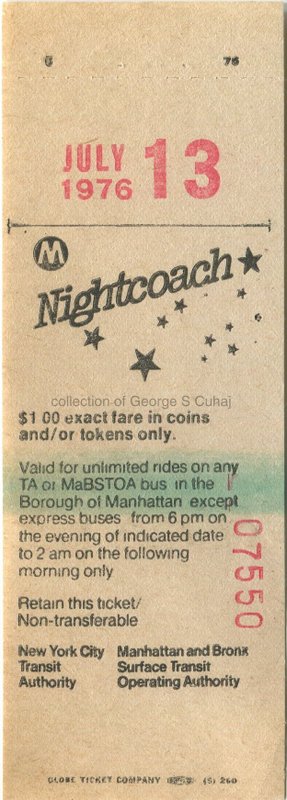
.
.
| New York City Youth Board - Free Transit Pass for Group | |
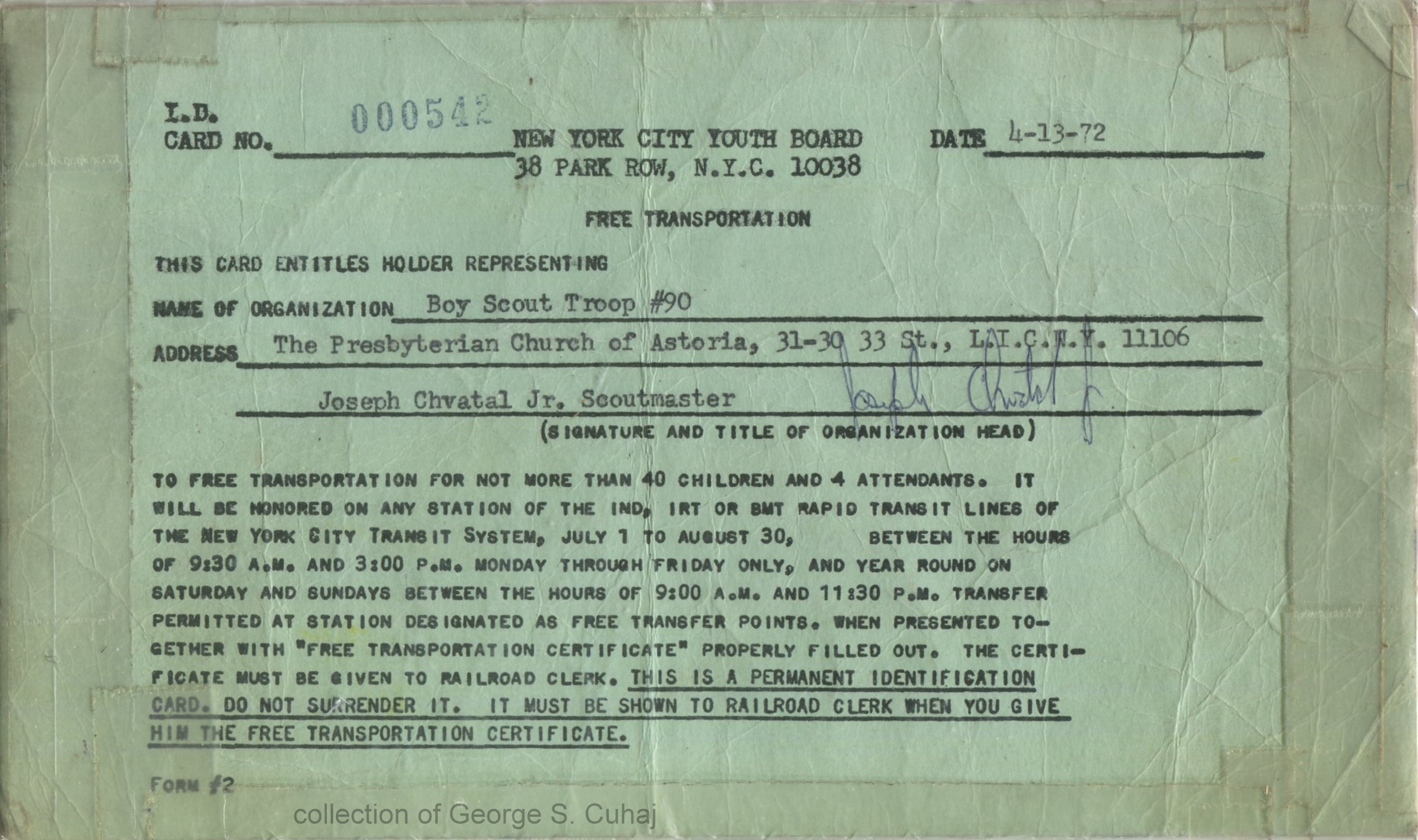 |
|
| Free Transportation Pass for Youth Board / Boy Scouts of America - April 13, 1972 extremely rare; $50.00 8⅝" x 5" |
|
| . . |
|
| Visitor's Pass - 1976 | |
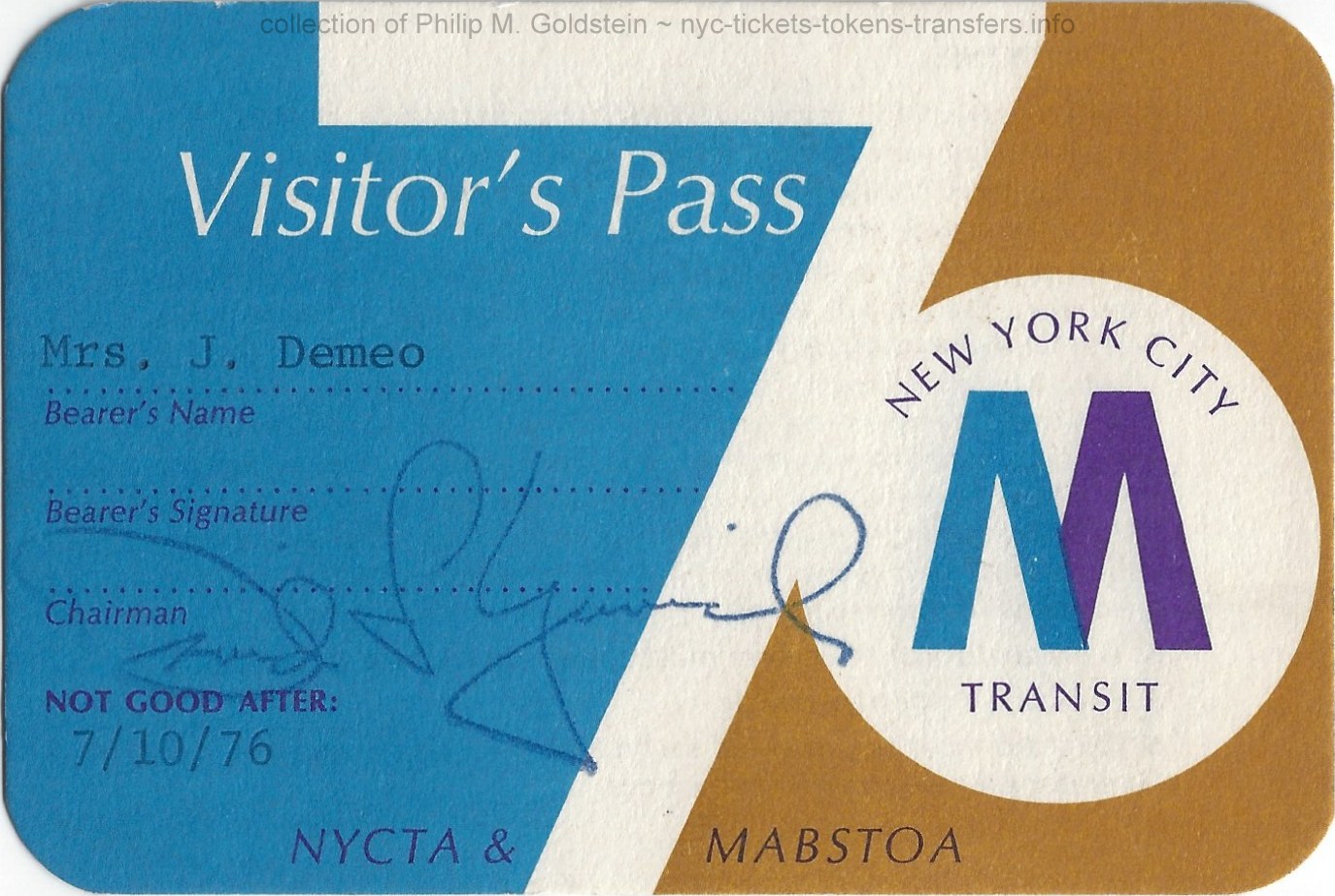 |
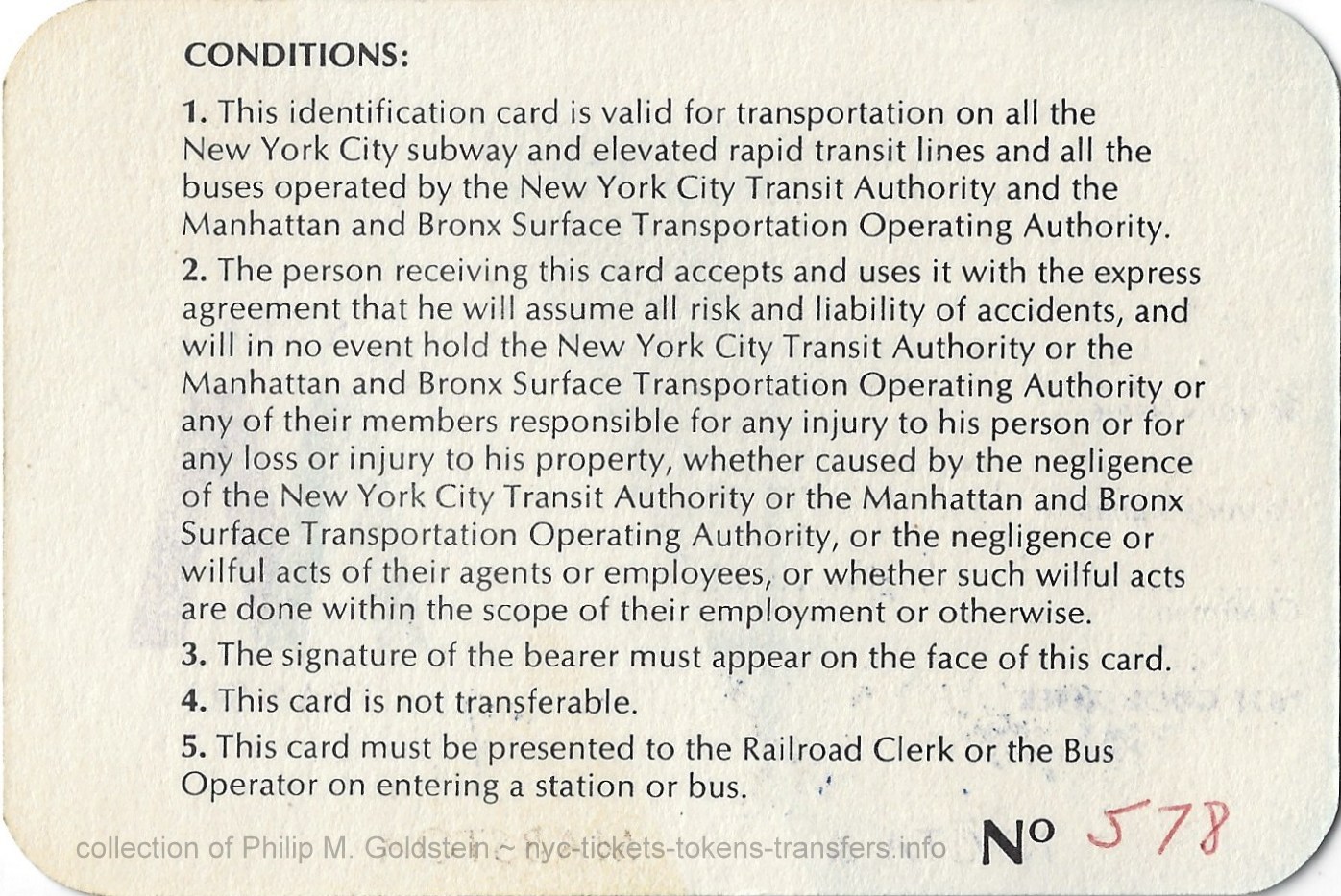 |
| 4½" x 3" rubberstamp signature of David L. Yunich extremely rare; $50.00 |
|
| . . |
|
| Op Sail '76 Bicentennial Special Transit Pass - July 4 to July 11, 1976 | |
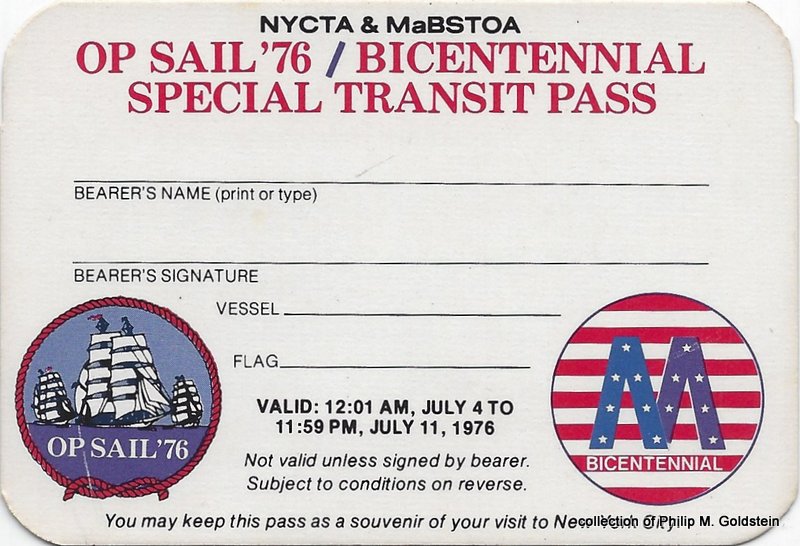 |
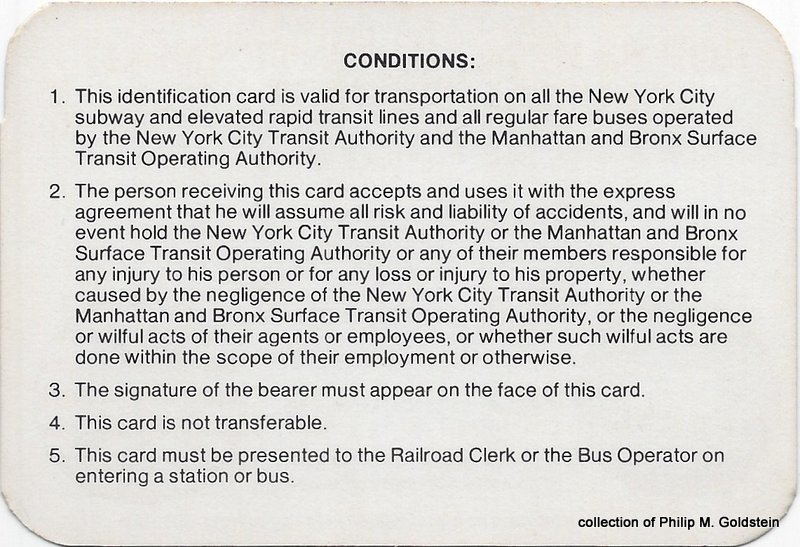 |
| 3¾" x 2 9/16" extremely rare; $50.00 |
|
| . . |
|
| Visitor's Pass - 1977 | |
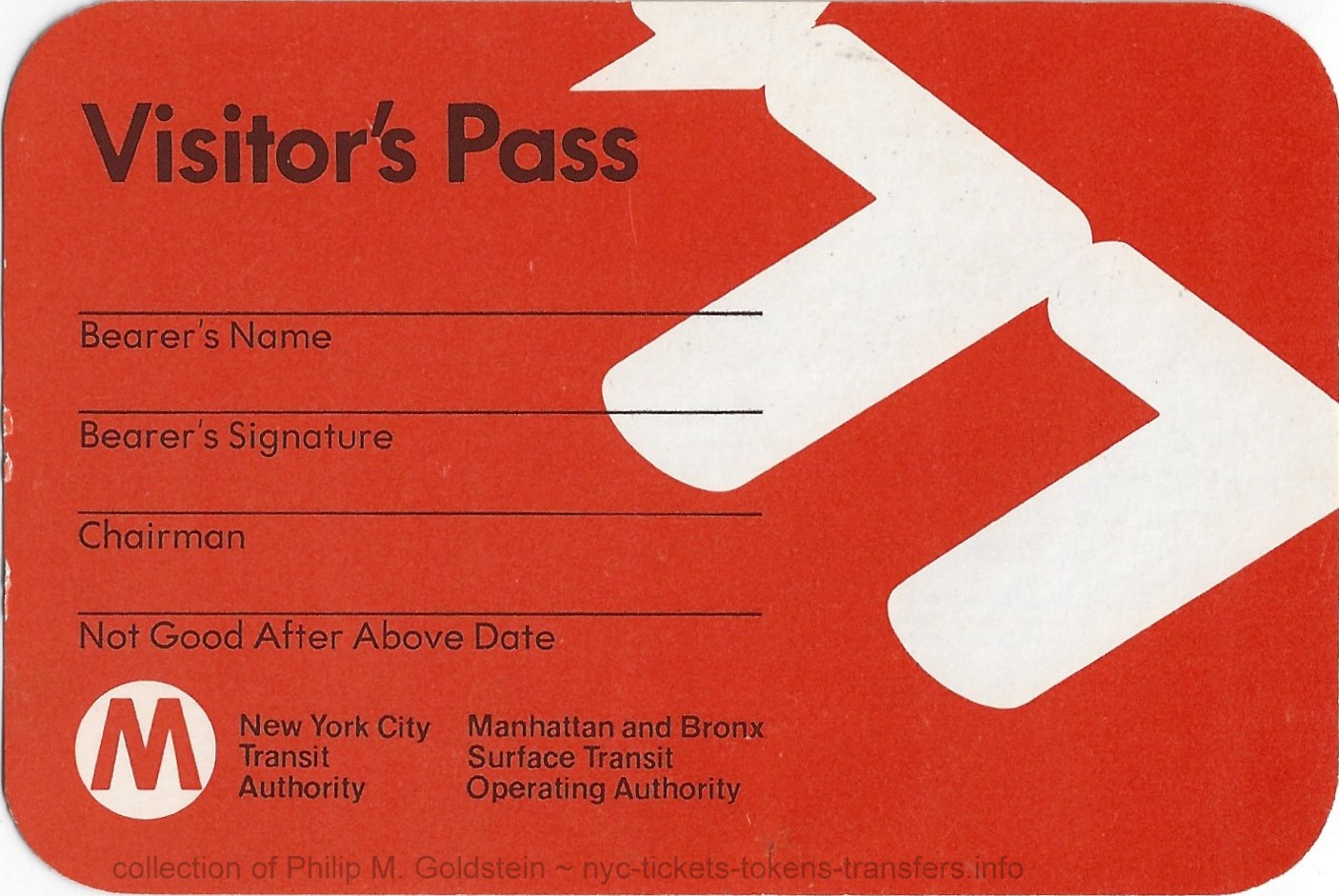 |
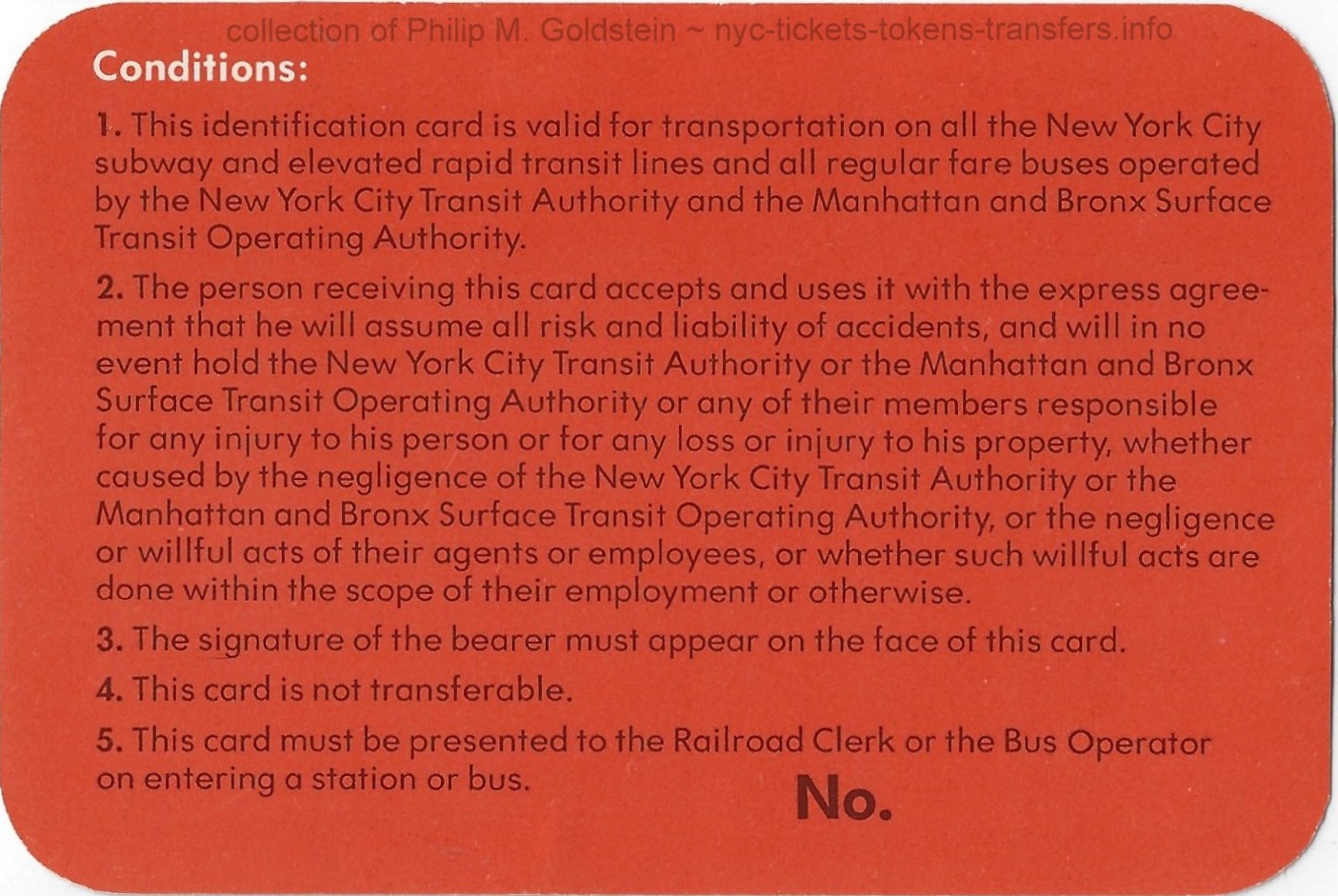 |
| 4½" x 3" extremely rare; $50.00 |
|
| . . |
|
| Visitor's Pass - 1978 | |
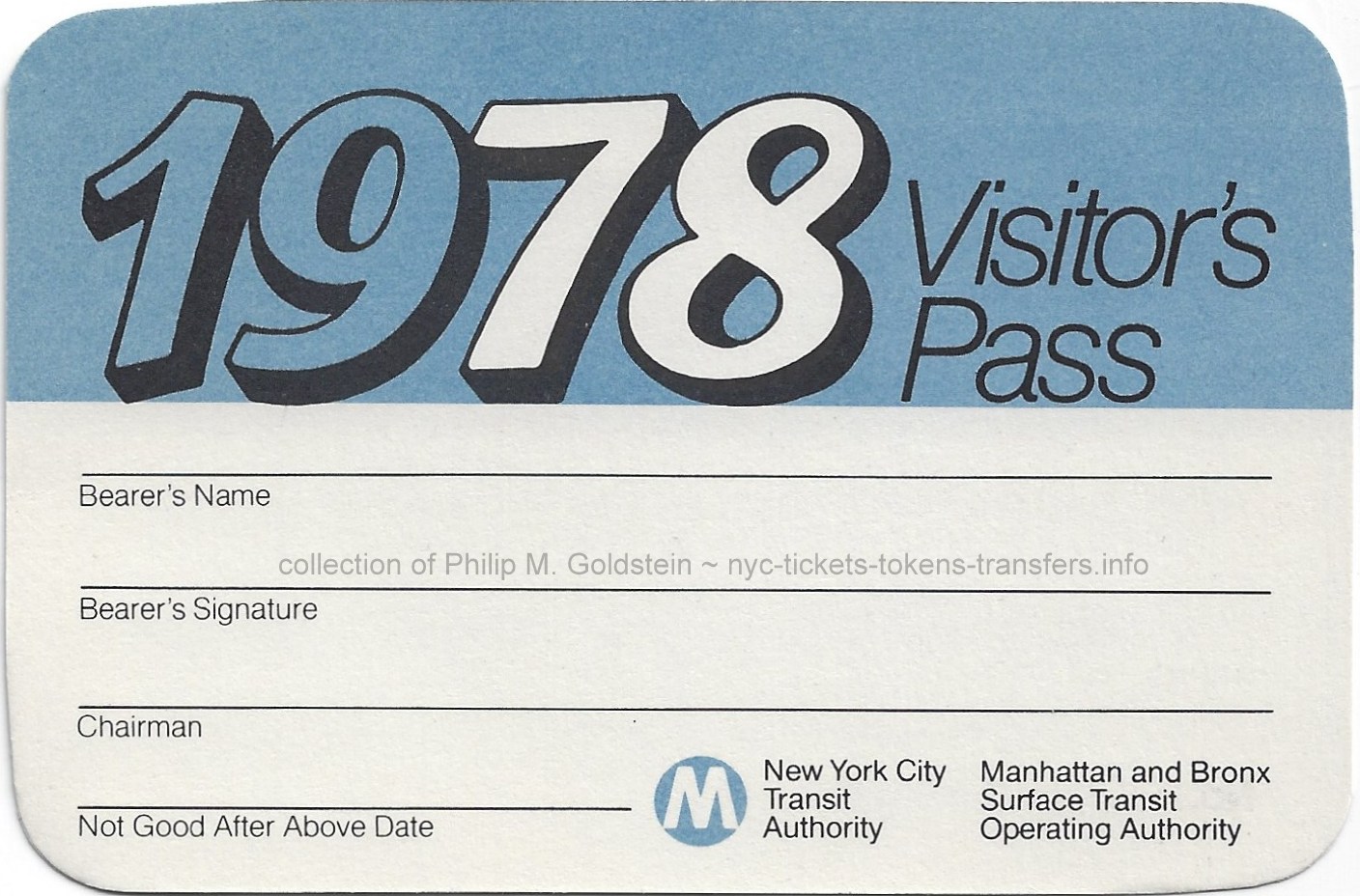 |
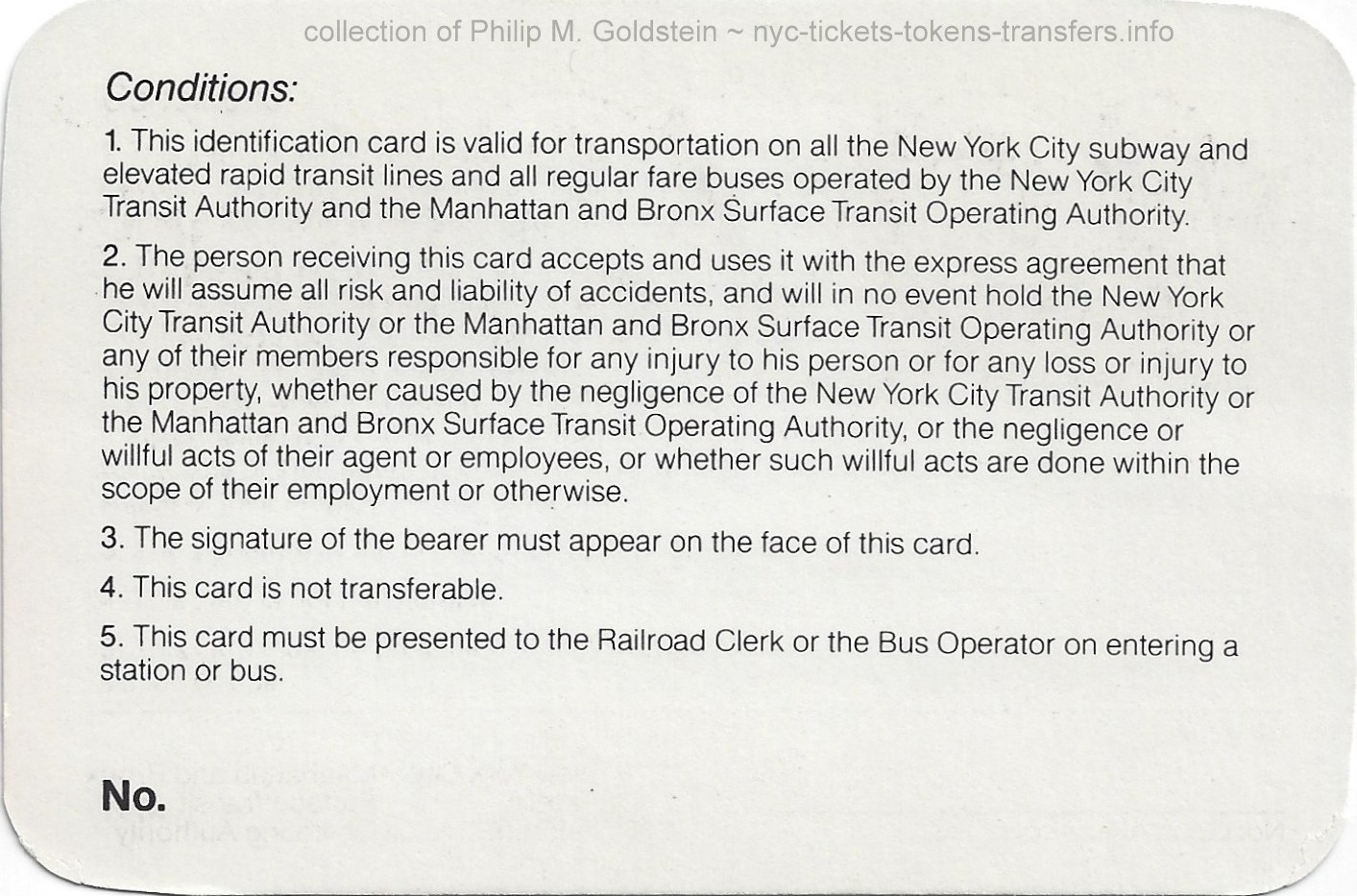 |
| 4½" x 3" extremely rare; $50.00 |
|
| . . |
|
| Visitors Pass - 1979 | |
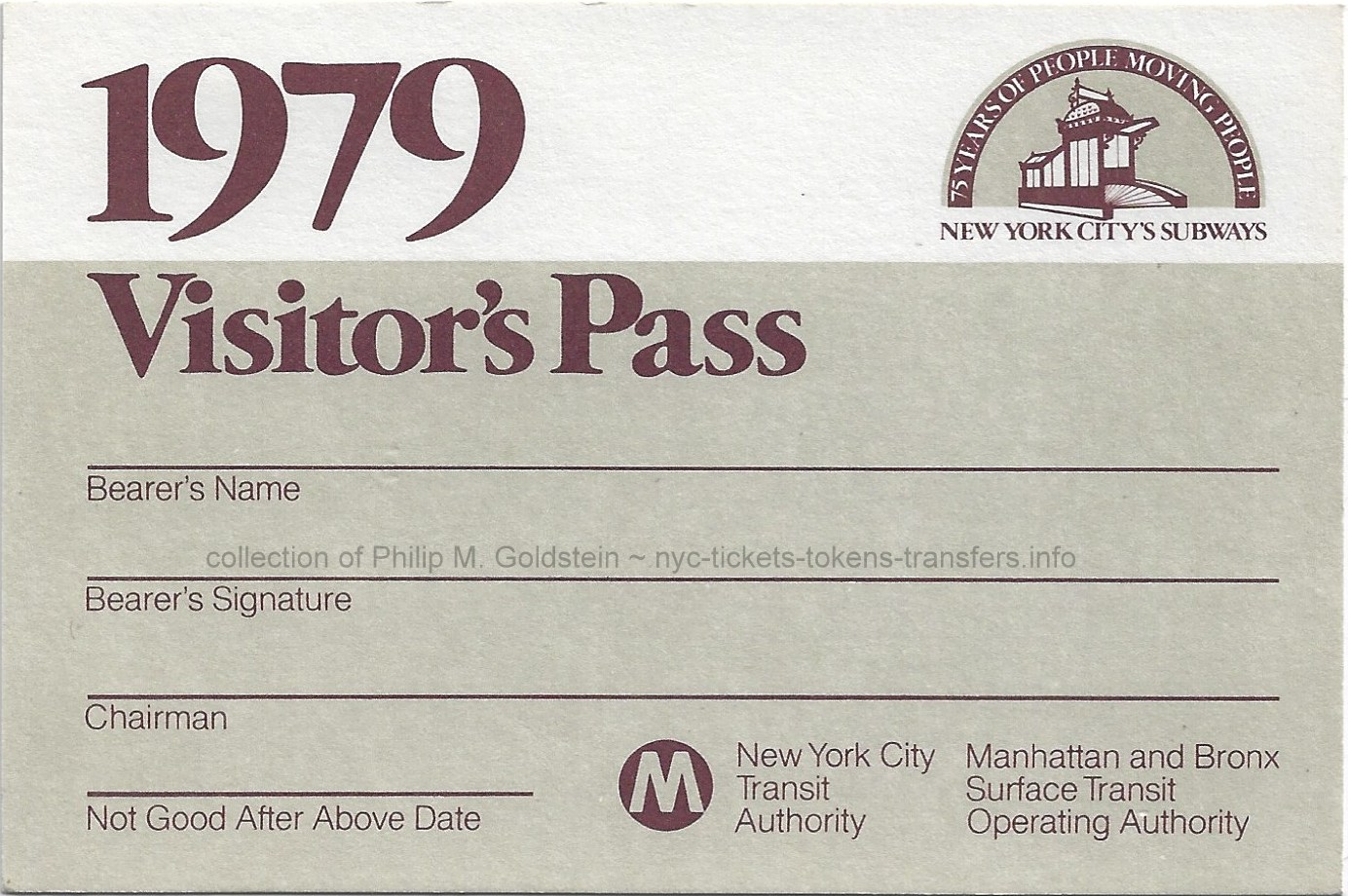 |
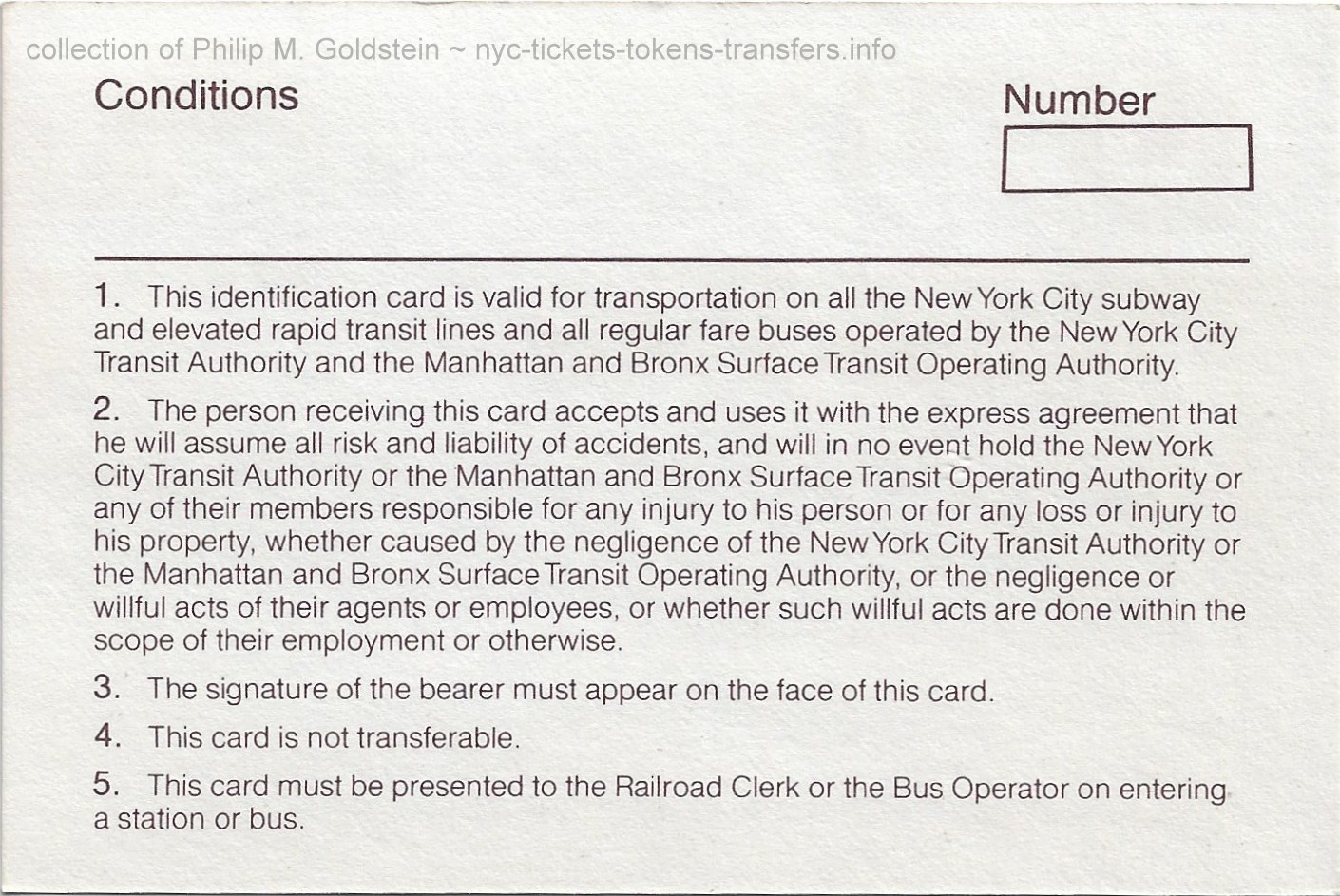 |
| 4½" x 3" extremely rare; $50.00 |
|
| . . |
|
| Special Transit Pass - Harbor Festival 1979 | |
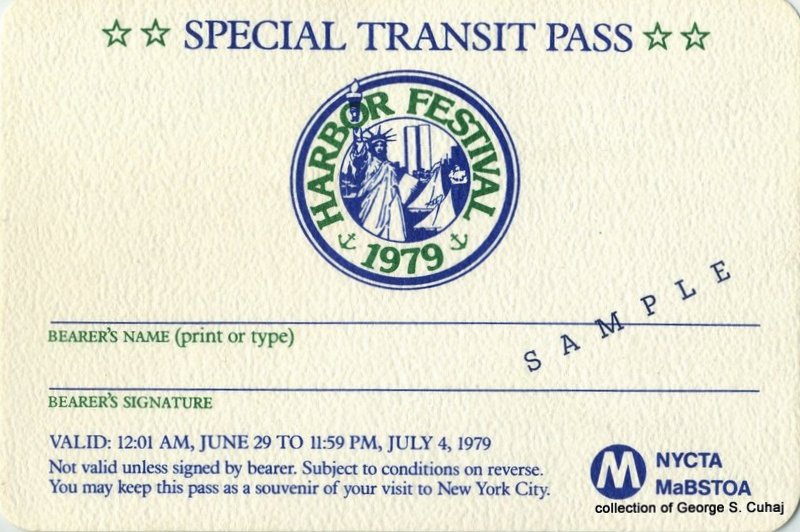 |
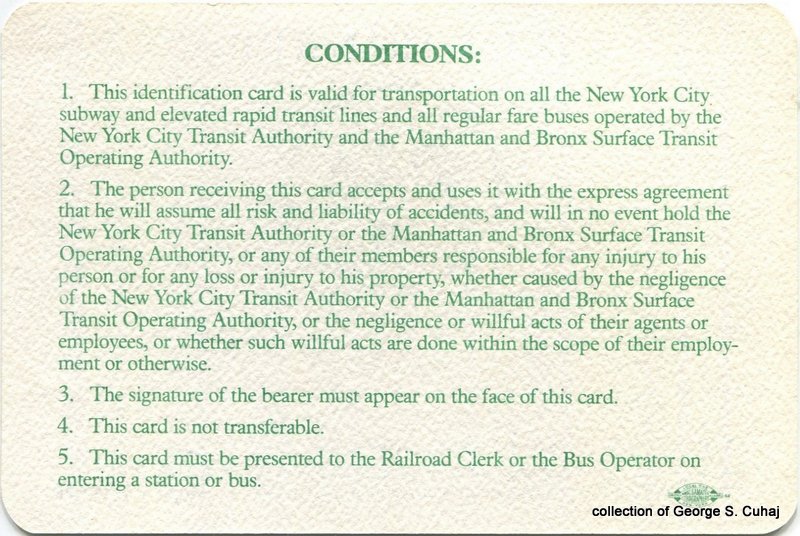 |
| 4½" x 3" extremely rare; $50.00 |
|
| . . |
|
| Visitors Pass - 1980 | |
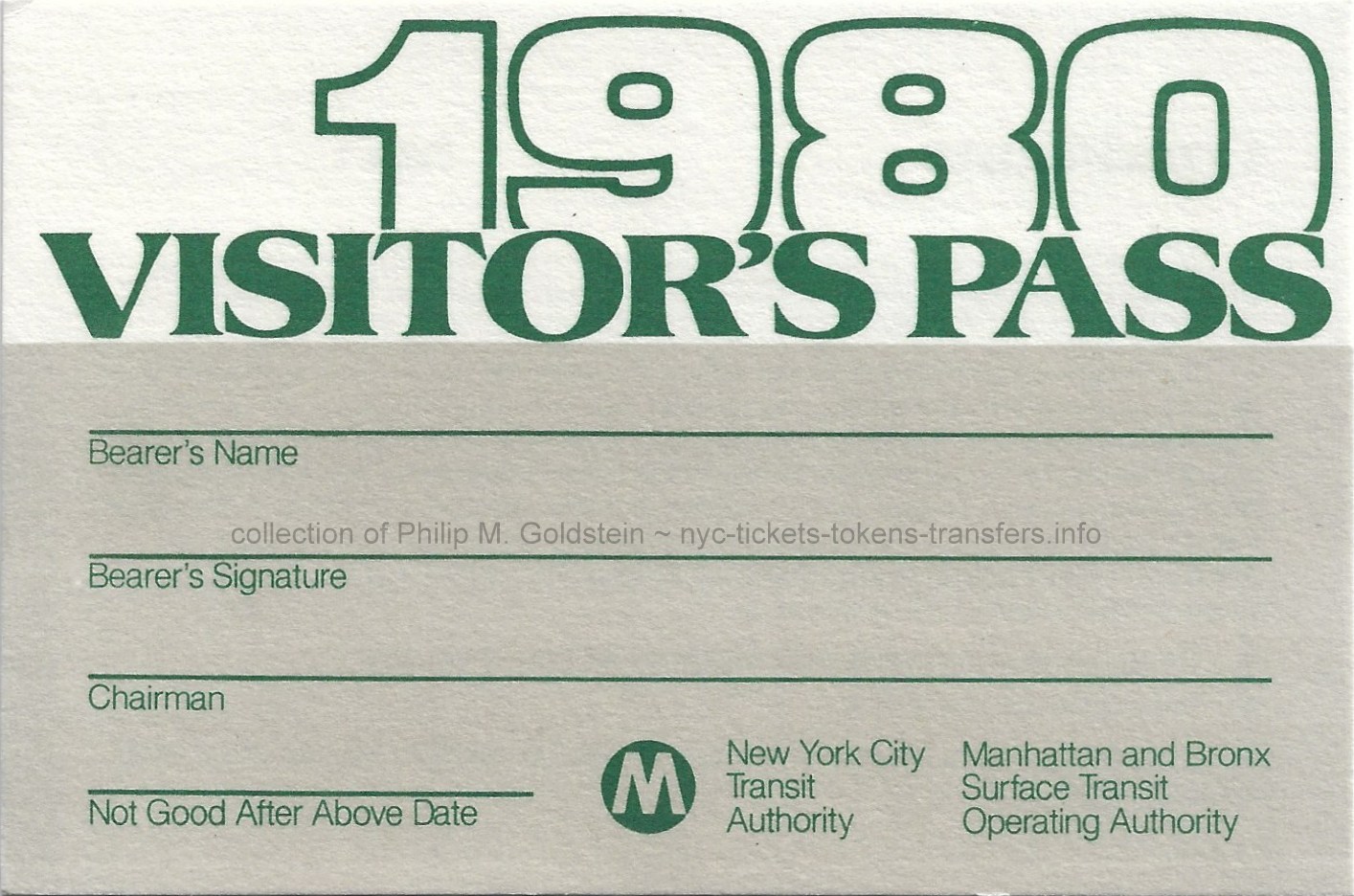 |
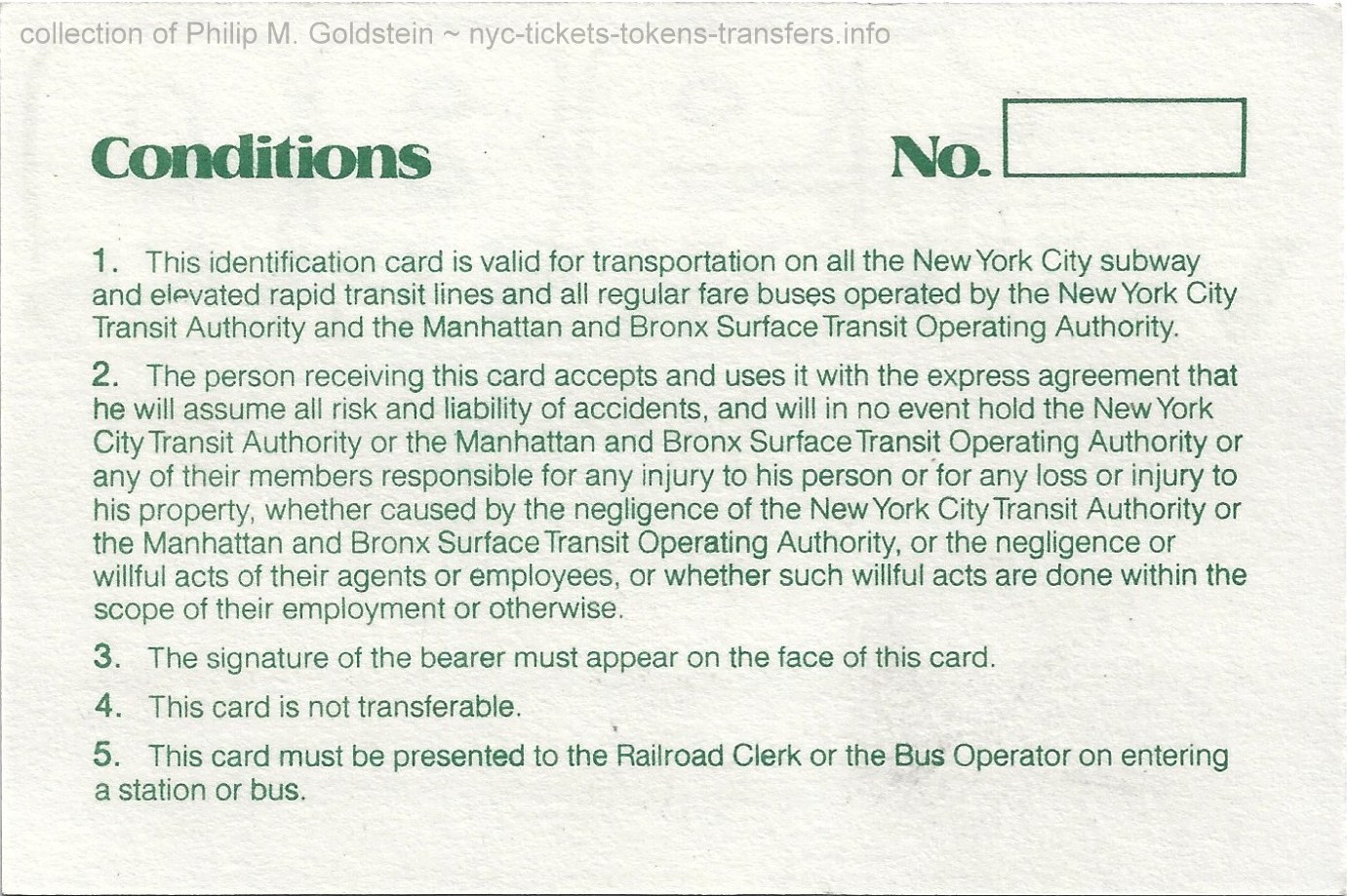 |
| 4½" x 3" extremely rare; $50.00 |
|
| Photographers Authorization Pass - 1985 | |
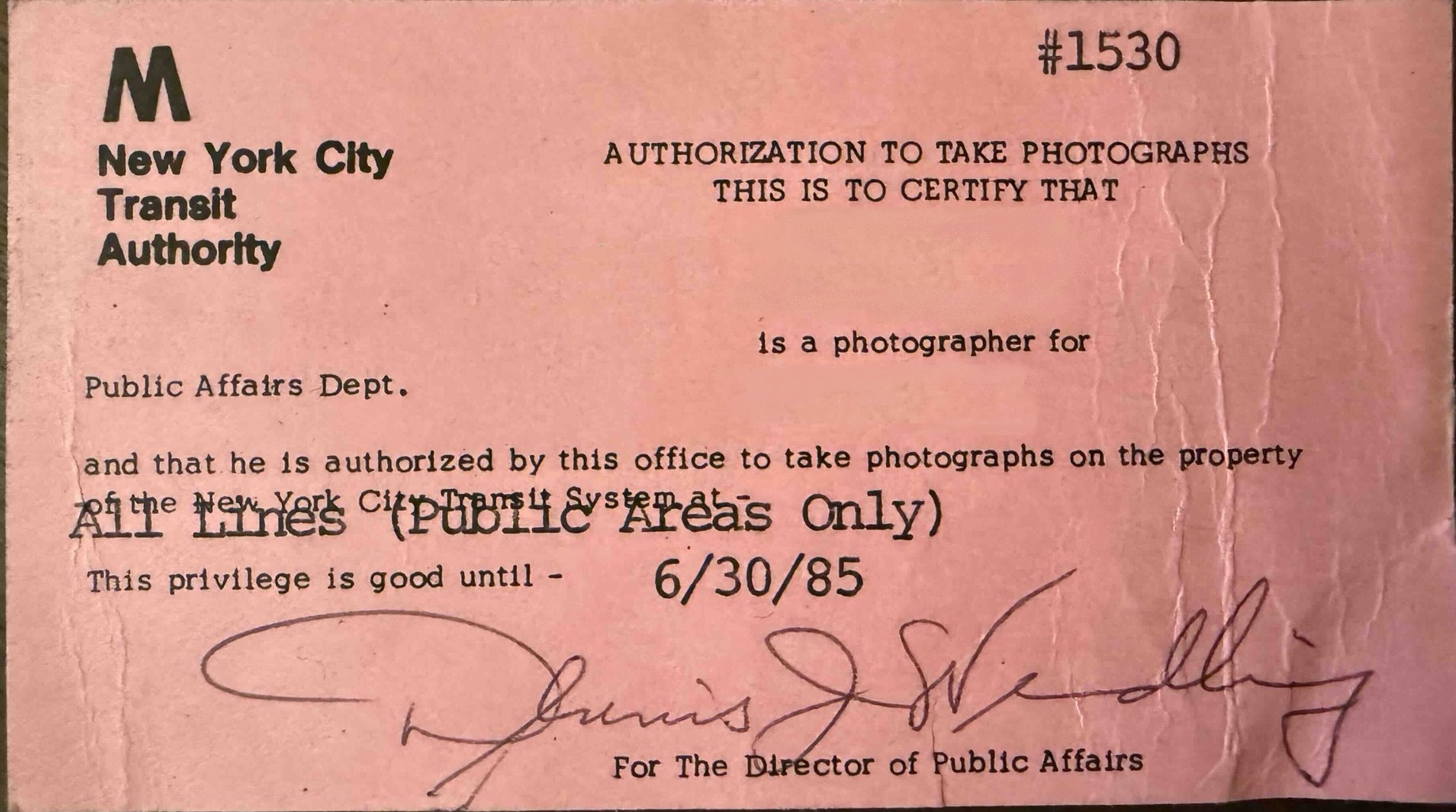 |
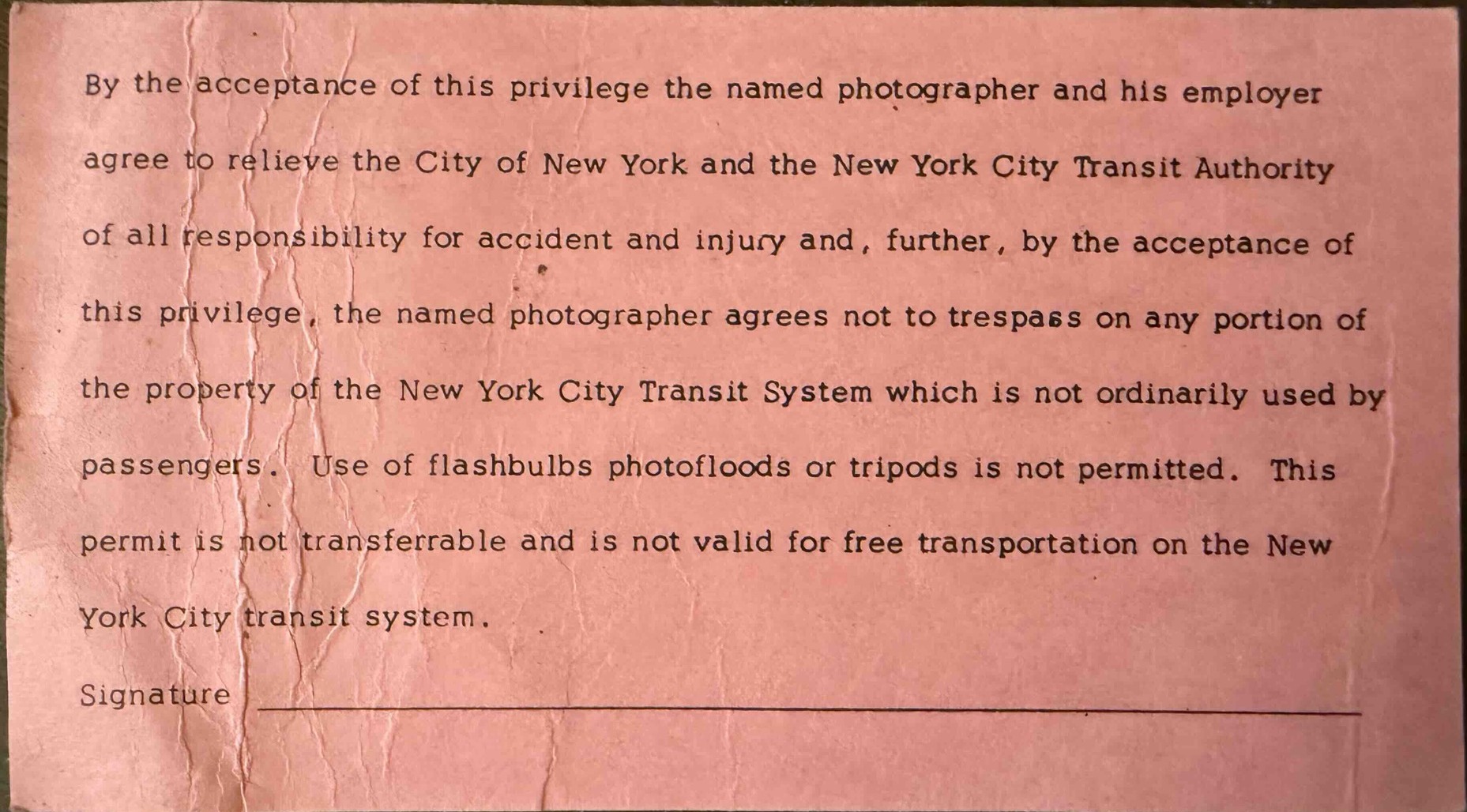 |
| Not valid for free or reduced passage. | |
|
||||||||||